THE HARVARD CRIMSON
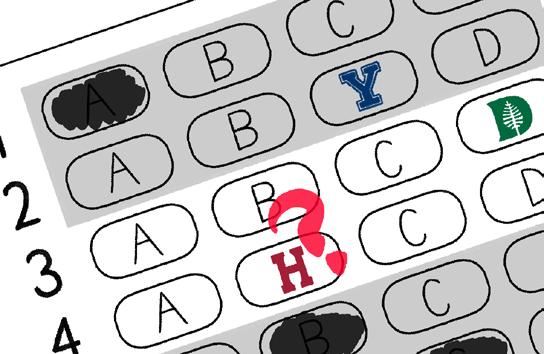
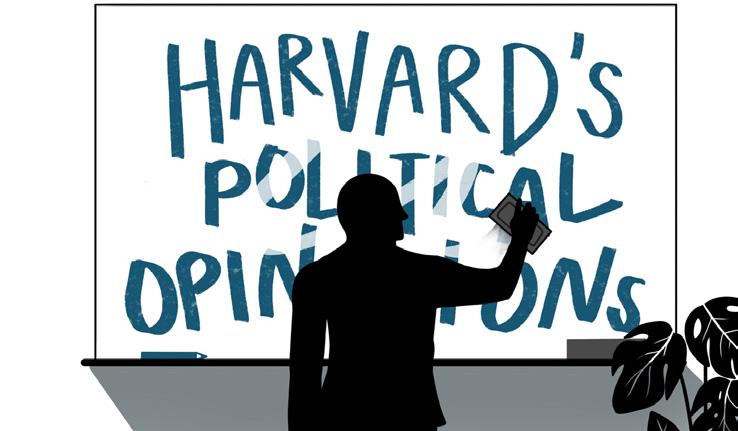
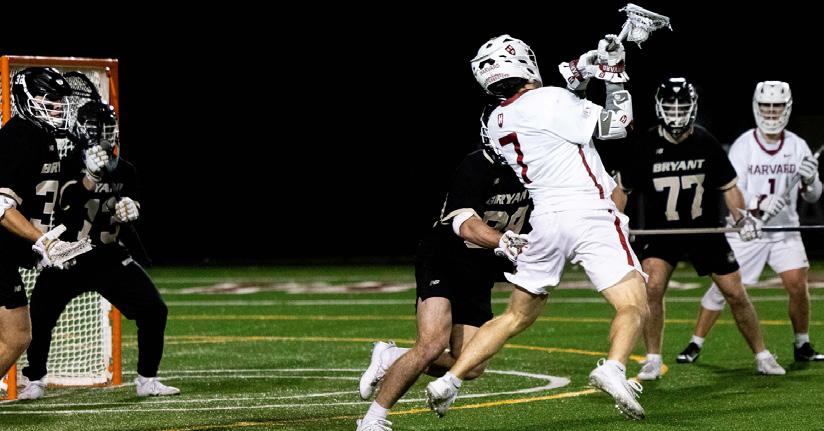
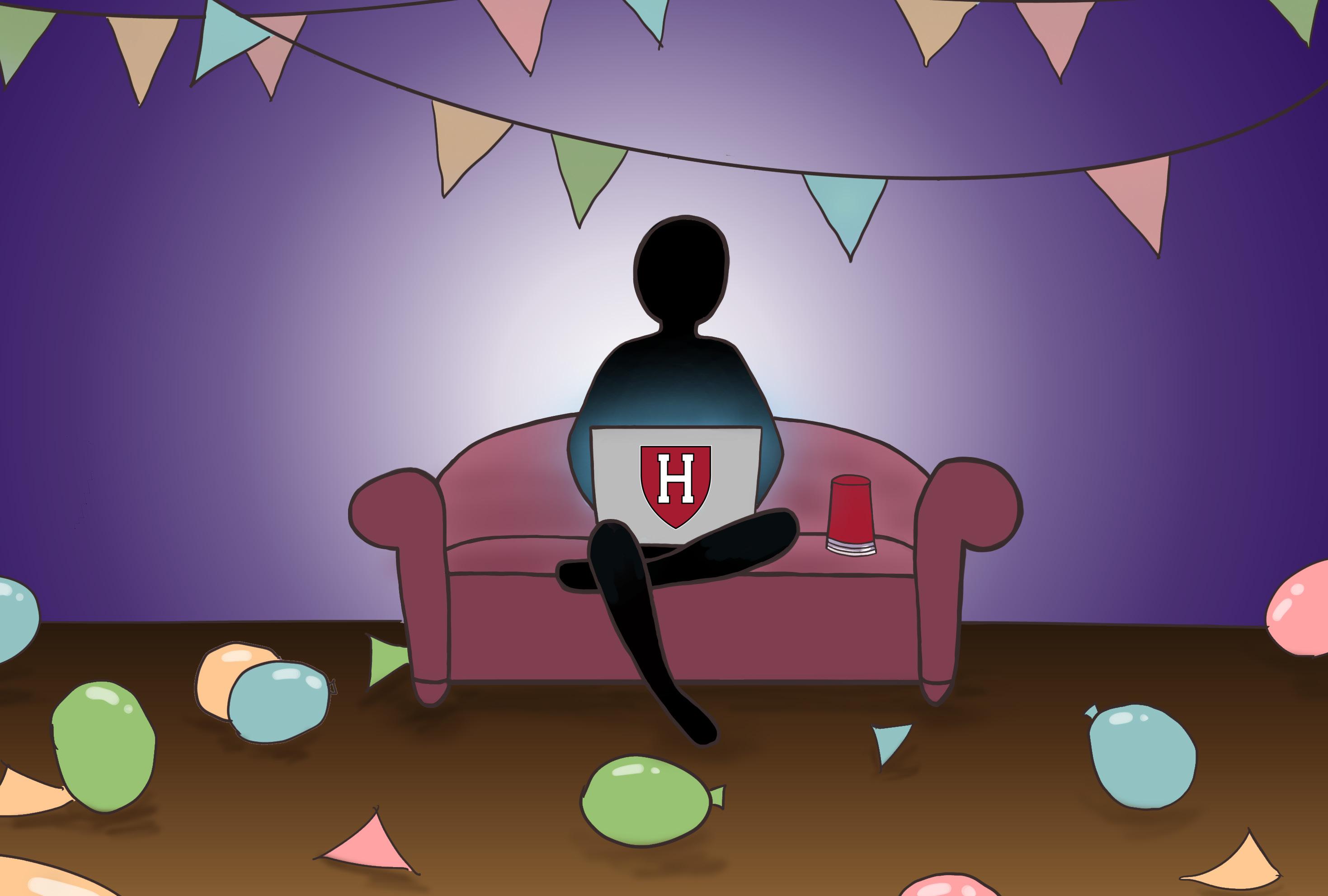

Theo J. Harper ’25 sued the Harvard International Relations Council after he was temporarily removed from the group in December for redirecting $170,000 to an unofficial bank account over two months as part of a secret financial stress test unbeknownst to the IRC’s top leadership. Harper’s legal action against the IRC comes after the group hastily voted to temporarily remove him from the organization during a board meeting on Dec. 22, less than one month after he sent an interim report on the stress test to top IRC leadership.
The account of how Harper managed to redirect $170,000 of the IRC’s funds
and the decision to suspend him from the group is based on internal documents and interviews with five people who were granted anonymity to speak candidly about private IRC matters. The exercise, and Harper’s lawsuit over his subsequent temporary ouster, laid bare deep-rooted tensions among the IRC’s board of directors over the organization’s financial management and complaints about a lack of transparency from top leadership.
‘For Seven Weeks Money Flowed Out’
In an attempt to internally expose the IRC’s own financial security flaws, on Sept. 29 Harper began quietly redirecting money intended for the group’s Bank of America deposit account to a Choice Financial Bank account created for the purposes of
the financial stress test. Harper conducted the stress test directly in response to a former president of the Harvard Undergraduate Foreign Policy Initiative transferring approximately $30,000 from the organization to a personal bank account, according to two people with knowledge of the IRC’s governance. (Harper was HUFPI’s senior director of finance from January 2023 to January 2024.) Harper wrote that the methods used for conducting the stress test “were legal and within the duties” of his role as a member of an internal strategy committee within the IRC known as the Board of Strategy and Social Impact, according to the interim report authored by Harper about the stress test.
The IRC, however, partially disputed Harper’s account in an emailed statement
on Tuesday.
“His actions were not authorized by the Board of Directors,” the IRC wrote in the statement. “There was an investigation conducted by a third party.”
Harper declined to comment for this article. Harper gained access to the chief auditor’s account for the IRC’s online accounting platform and subsequently opened a new account with Choice Financial Bank — which is based in North Dakota — that was officially verified through the IRC auditor account, according to a copy of the report obtained by The Crimson.
The report stated that a financial stress test “to determine potential methods of attack as well as to observe officers’ responses, would be a helpful
SEE
Harvard Business School professor Raffaella Sadun resigned as co-chair of the presidential task force on antisemitism after repeatedly considering stepping down because she felt the University would not commit to acting on its suggestions, according to a person familiar with the situation.
Sadun sought a commitment from the University that they would act on the task force’s recommendations, in advance of any being issued, instead of treating them as optional advice. A person close to Sadun said she ultimately decided to step down from the task force because its mandate did not include the swift implementation of measures to combat antisemitism. Rabbi Hirschy Zarchi, the founding president of Harvard Chabad, told The Crimson that Sadun had
been frustrated about the task force for some time. The details about Sadun’s resignation from the task force on Sunday were conveyed in interviews with three Harvard affiliates. They spoke to The Crimson on the condition of anonymity to discuss details about Sadun’s sudden departure as co-chair. Harvard spokesperson Jonathan L. Swain declined to comment on Sadun’s frustrations with the task force. Sadun did not respond to multiple requests for comment Sunday evening about her decision to step down. Interim Harvard President Alan M. Garber ’76 wrote in response to a request for comment about Sadun’s resignation that she had “expressed her desire to refocus her efforts on her research, teaching and administrative responsibilities at HBS.” “I am extremely appreciative of
A website created on Sunday by Harvard undergraduate Sungjoo Yoon ’27 exposed user data of Harvard College freshmen who had registered for Datamatch, a student-run online matchmaking service. Yoon’s website, titled “the data privacy project,” published a list of freshmen’s Rice Purity Test scores, which users could optionally enter into their Datamatch profiles. On Yoon’s website,
data privacy while others found it funny.
Yoon, who created the project under the pseudonym “bernie marx,” wrote on the website that he published the data as part of a “case study” meant to warn fellow students to “not keep putting your info into random apps.”
Datamatch, which was founded by Harvard students and serves over 30 colleges, asks participants to fill out a profile on the website before an algorithm produces 10 potential matches on Valentine’s Day. Students can then receive funding for a free meal with their top matches.
Yoon said in an interview with The Crimson Sunday evening that none of the information he published was identifiable
SEE
THE UNIVERSITY DAILY, EST. 1873 | VOLUME CLI, NO. 7 | CAMBRIDGE, MASSACHUSETTS | FRIDAY, MARCH 1, 2024
each score was listed alongside a set of student initials. Created to allow undergraduates at Rice University to “track the maturation of their experiences throughout college,” the Rice Purity Test asks 100 questions about sexual experiences, drug use, and other illicit activity. Students check off whether they have engaged in each activity, and the quiz spits out a score corresponding to the number of items checked off. Harvard undergraduates took to Sidechat — a social media app that allows users to publish posts anonymously — to react to the website’s launch, with some voicing concerns about
Undergrad Sues Harvard IRC After Removal Over $170,000 ‘Financial Stress Test’ SEE PAGE 8 STUDENT LIFE STUDENT GROUPS TASK FORCE DATAMATCH SEE PAGE 8 SEE PAGE 4 Men’s Lacrosse Wins Nail-Biter to Stay Undefeated PAGE 16 SPORTS Harvard Needs to Adopt Institutional Neutrality PAGE 9 OPINION
SCORES. As peer Ivy League schools announce they will return to requiring prospective students to submit standardized test scores in their applications, experts wonder if Harvard is next. SECRET NO MORE. The College’s new intellectual vitality initiative debuted after three years of quiet talks about the program. Dean of the College Rakesh Khurana will spearhead the initiative.
PAGE 4
PAGE 8 Intellectual Vitality Initiative Revealed ADMISSIONS COLLEGE Talulla Restaurant Review: Four Stars BREAK BREAD. Order the bread starter at Talulla,where a hearty sourdough and a spongy focaccia are paired with a whipped honey butter. Also try the shaved brussels sprouts and cod.
How Long Will Harvard Stay Test Optional? TEST
SEE
SEE
PAGE 14
LAUNCH. Residential tutors, proctors, and house aides are planning to publicly launch a campaign for unionization, a move that comes after nearly a year of quiet organizing efforts.
ARTS PUBLIC
PAGE 4
Tutors Seek Unionization
Sadun Resigns Over Task Force Mandate Concerns Data Breach Reveals Rice Purity Scores BY AZUSA M. LIPPIT CRIMSON STAFF WRITER ‘Catered’ and ‘Exclusive’: Where is Harvard’s Fun? SOCIAL SCENE. Dozens of students described a social scene where traditional college revelry — characterized by roaring parties, vibrant and frequent tailgates, and school spirit in abundance — has been missing at Harvard. In interviews with The Crimson, they tackled a difficult question: where is Harvard’s sense of fun? SEE PAGE 6 CATHERINE H. FENG — CRIMSON DESIGNER BY TILLY R. ROBINSON AND NEIL H. SHAH CRIMSON STAFF WRITERS BY JO B. LEMMAN CRIMSON STAFF WRITER
Proctors,
LABOR

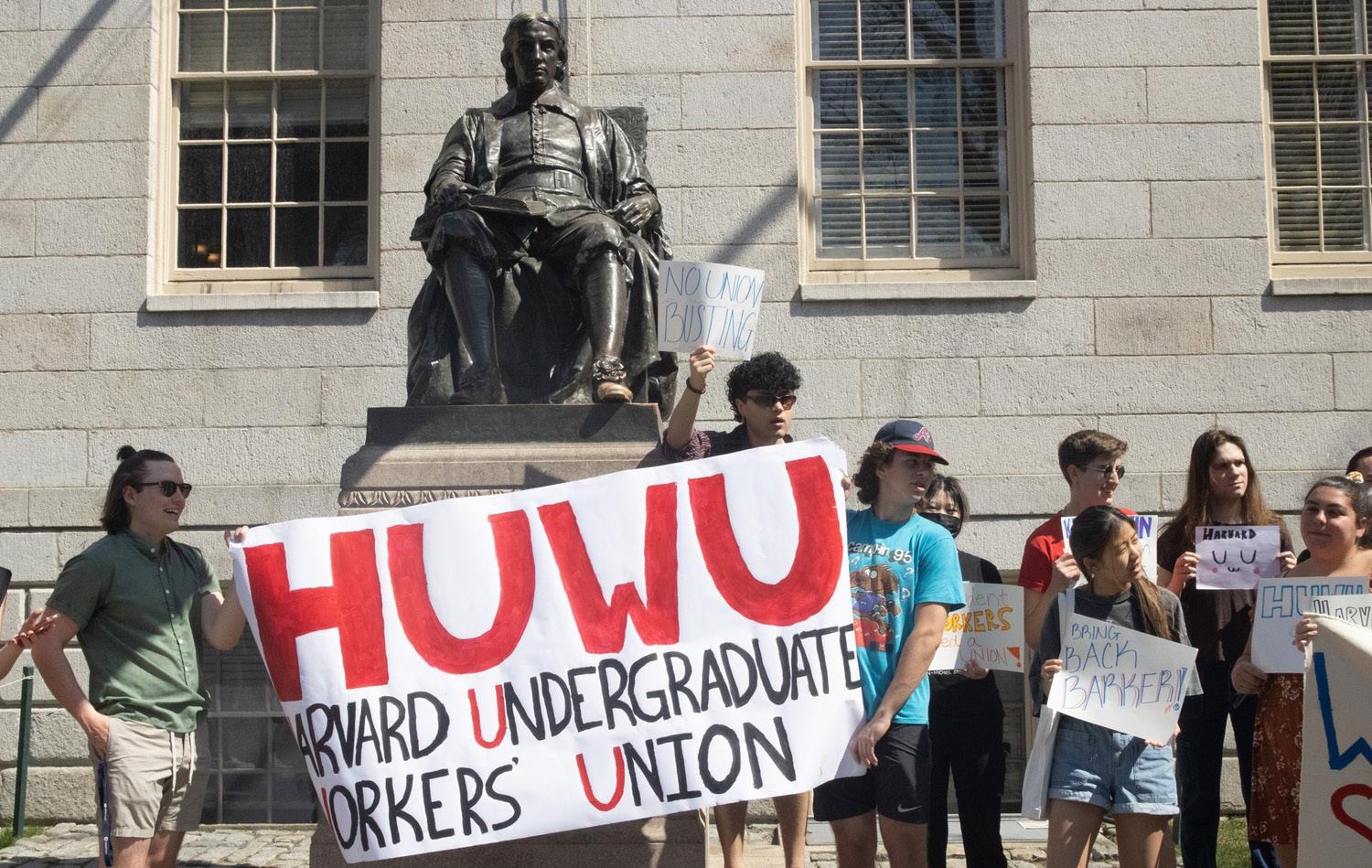
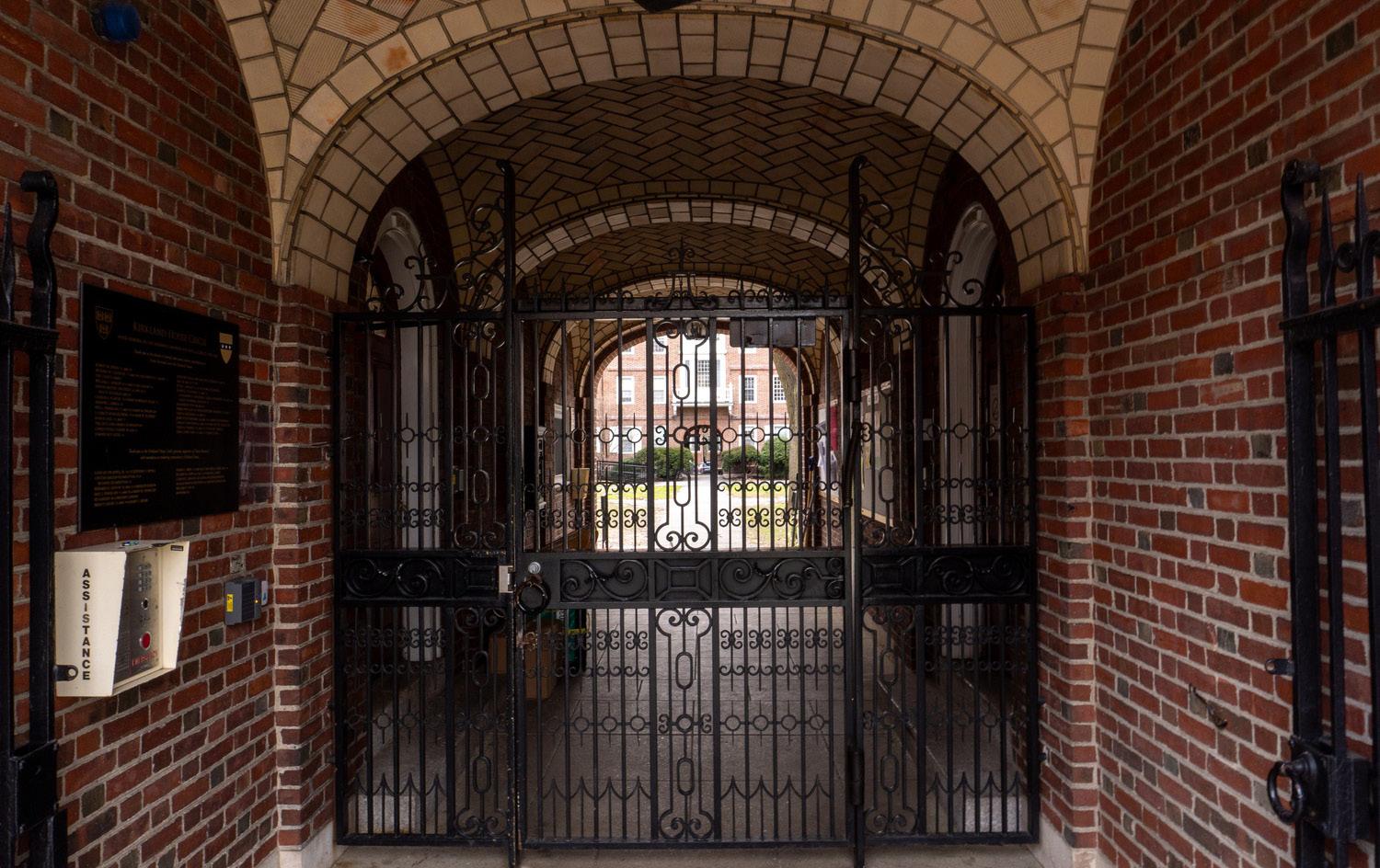

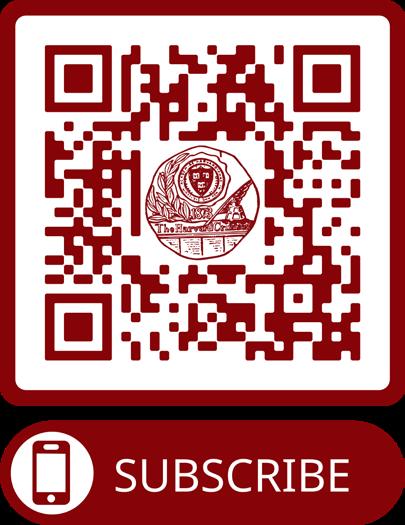





LAST WEEK 2 MARCH 1, 2024 THE HARVARD CRIMSON Swipe Access Granted for ‘River Run’ Harvard Undergrads Prepare to Bargain HUA Shares Class Registration Petition COLLEGE LABOR STUDENT GOVERNMENT RIVER RUN. Freshmen will have swipe access to upperclassman Houses this year during “River Run,” the Dean of Students Office wrote in a statement to The Crimson on Wednesday. The clarification comes as uncertainty swirled for days about potential changes to “River Run,” an annual tradition that involves entering and taking a shot of alcohol in all nine upperclassman Houses by the Charles River the night before housing assignments are revealed. BY CRIMSON NEWS STAFF, PHOTO BY SARAH G. ERICKSON — CRIMSON PHOTOGRAPHER UNIONIZATION. Following a successful vote to unionize last October, the Harvard Undergraduate Workers Union-United Auto Workers has begun preparing for negotiations. HUWU-UAW — which represents both undergraduate and graduate students working in food service, libraries, and offices at Harvard — passed with 153 out of 154 votes in favor of unionizing, joining the growing national wave of undergraduate unionization over the past eight years. BY ARAN SONNAD-JOSHI AND SHEEREA X. YU — CRIMSON STAFF WRITERS, PHOTO BY ELIAS J. SCHISGALL — CRIMSON PHOTOGRAPHER COURSE REGISTRATION. The Harvard Undergraduate Association encouraged the student body to fill out an academic freedom petition in response to discussions by the Faculty of Arts and Sciences about moving up the deadline to register for courses and pushing back the pass-fail deadline. In a Tuesday email, HUA co-presidents John S. Cooke ’25 and Shikoh M. Hirayabashi ’24 wrote that “our faculty should be focused on making the course registration experience less restrictive, not more.” BY CAM N. SRIVASTAVA AND WILLIAM Y. TAN — CRIMSON STAFF WRITERS, PHOTO BY FRANK S. ZHOU — CRIMSON PHOTOGRAPHER The Week in Photos PROTEST AT THE SINCLAIR — Staff at The Sinclair protested a concert in support of Israel by Israeli artist Ishay Ribo Tuesday night, joined by dozens of Cambridge residents and several Harvard affiliates. Counter-protesters with Israeli flags face them across the street. LOTEM L. LOEB — CRIMSON PHOTOGRAPHER CENTER FOR EUROPEAN STUDIES — The Portuguese Foreign Minister João Gomes Cravinho discussed the European Union’s response to the war in Ukraine during an event at the Center for European Studies on Tuesday. Gomes Cravinho explained the entangled history of U.S.-E.U. military relations, from the Cold War to the War on Terror. IKE J.PARK — CRIMSON PHOTOGRAPHER ISHAY RIBO — Iraeli singer Ishay Ribo performed at the Sinclair Tuesday evening in a concert organized by Harvard Chabad to raise money for Israel. The workers at the Sinclair unanimously opposed the concert, resulting in a boycott and protest outside the venue. LOTEM L. LOEB — CRIMSON PHOTOGRAPHER CAMBRIDGE CITY COUNCIL — The Cambridge City Council voted to support a tax on large real estate transactions and discussed the feasibility of municipally-funded housing vouchers during a Monday evening meeting. EMMA A. LUCAS — CRIMSON PHOTOGRAPHER VAN LEEUWEN ICE CREAM — Founded in New York City and established in eight states and Washington, D.C., Van Leeuwen is planning to open three stores across the Boston metro area. The Harvard Square location will be located at 1 Brattle Square, across from Bluestone Lane Cafe. SELORNA A. ACKUAYI — CRIMSON PHOTOGRAPHER CONCERT BOYCOTT Sign up for alerts, sent straight to your inbox Get breaking news . thecrimson.com/subscribe THC Read more at THECRIMSON.COM AROUND THE IVIES Princeton affiliates received an email containing threats against the Jewish community on campus. Since the incident, the Department of Public Safety said that the threat had “low credibility”. The University of Pennsylvania, Dartmouth College, and Cornell University affiliates also received similar threats against Jewish community members, although it is unclear if the events are connected. THE DAILY PRINCETONIAN Brown University produced the second highest number of Fulbright scholars in the nation this year — a total of 36 recent alumni and current graduate students — studying in over two dozen countries across the globe. Research topics range from the effect of American politics on Europe to Indian laws regarding sexual harassment in the workplace to the impacts of climate change on vulnerable populations in the Dominican Republic. THE BROWN DAILY HERALD Cornell Student Matthew Schwertner was arrested last month after being charged with harassment and threatening to publish intimate visual material. These charges were in part aided by a bill passed with the support of his father Charles Schwertner, who serves as a Republican state senator in Texas. While Schwertner is not currently enrolled in the college, he is currently still listed as a student in the Cornell directory. Schwertner was arrested in January, and is awaiting a March pretrial conference.
CORNELL DAILY SUN Dartmouth University, Rice University, Northwestern University, and Vanderbilt University agreed as co-defendants to settlements totaling $166 million in a memorandum filed Feb. 23. The lawsuit was filed against 17 universities in 2022 by former students over the accusation of conspiring to minimize financial aid for students from working- and middle-class backgrounds. The four universities join six others who previously reached settlements — the University of Chicago having settled in August of 2022, and Brown university, Columbia University, Duke University, Emory University, and Yale University having all settled earlier this month on Feb. 14. THE DARTMOUTH ANTISEMITIC THREAT ASSESSED AS ‘LOW CREDIBILITY’ AT PRINCETON BROWN HOLDS EIGHT-YEAR STREAK AS A TOP THREE PRODUCING FULBRIGHT INSTITUTION CORNELL STUDENT ARRESTED IN REVENGE PORN CASE DARTMOUTH AGREES TO SETTLEMENT OF $33.75 MILLION IN LAWSUIT OVER FINANCIAL AID
THE
MARCH
IN THE REAL WORLD
BIDEN WINS MICHIGAN
PRIMARY, AMID STRONG ‘UNCOMMITTED’ SHOWING
U.S. President Joe Biden won the Michigan primary on Tuesday, despite a movement by encouraging Democrats to vote “uncommitted”. Arab American leaders organized the campaign in order to increase public pressure on the president to call for an unconditional ceasefire in Gaza. According to the New York Times, more than 100,000 Michigan residents voted “uncommitted” in Tuesday’s primary, representing roughly 13 percent of primary voters.
MCCONNELL TO STEP DOWN FROM PARTY LEADERSHIP
Republican Senate Leader Mitch McConnell said he plans to step down from party leadership. While McConnell still plans to continue serving as senator through 2027, he will no longer be his party’s highest ranking member of the body after November. The New York Times reported that McConnell — who has suffered a serious fall and has repeatedly frozen in front of the media — admitted that his views on national security matters are no longer in line with the positions of Donald Trump, his party’s leader.
TRUMP KICKED OFF ILLINOIS BALLOT
A judge ordered the state election board to remove former U.S. President Donald Trump from the Illinois primary ballot on Wednesday. Judge Tracie Porter put her order on hold until Friday, as she expects the decision will be appealed by Trump’s legal team. The Supreme Court heard arguments on a similar case in Colorado, and is poised to issue a ruling soon.
ALABAMA SCRAMBLES TO PASS LAW PROTECTING I.V.F
Alabama Republicans are rushing to protect routine I.V.F. treatments, following last week’s state Supreme Court decision that frozen embryos are to be considered children. Republican and Democratic politicians across the country — including former President Donald Trump — were quick to express support for I.V.F. treatments. Both the state Senate and House advanced bills on Wednesday, and hope to have legislation signed in the coming days, according to the New York Times.
BIDEN PREDICTS CEASEFIRE IN GAZA BY NEXT WEEK
President Joe Biden is optimistic about a ceasefire in Gaza, and told reporters that he hopes to announce a deal on Monday.
Jake Sullivan — Biden’s national security advisor — said that negotiators from the U.S., Israel, Egypt, and Qatar have made significant progress in ceasefire negotiations. The agreement would allow for a release of Israeli hostages, as well as increased foreign aid in Gaza, according to NPR. Biden shared his optimistic outlook with reporters during a segment with late night comedian Seth Meyers.
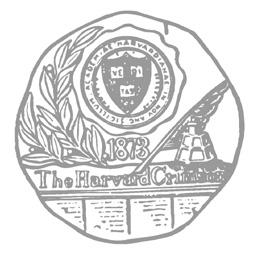
NEXT WEEK 3
What’s Next
Start every week with a preview of what’s on the agenda around Harvard University
Friday 3/1
PETER GIRGUIS - LET’S CHAT ABOUT GPT: A CONVERSATION ABOUT THE PROS AND CONS OF AI AND LLMS
24 Oxford Street, 8:30 a.m. - 9:30 a.m.
Listen to a casual morning seminar led by Professor Peter Girguis.The seminar will discuss the advantages and disadvantages that artificial intelligence and large language models may have on science.
Saturday 3/2
WOLF VOSTELL: DÉ-COLL/AGE IS
YOUR LIFE
Harvard Art Museums
Explore Wolf Vostell’s dé-coll/age aesthetics exhibit, in which the destructive process of art parallels the consciousness destruction in life. As a survivor of the Holocaust, Vostell’s art is intended to prevent consumers’ desensitization towards human suffering.
Sunday 3/3
HARVARD UNIVERSITY CHOIR IN CONCERT
Memorial Church, 4:00 p.m. - 6:00 p.m.
Attend the Harvard University Choir’s concert in Memorial Church. The choir will be performing “Babylon” by Sarah Rimkus, “The Big Picture” by Judith Weir, and “Songs to the Lord of Peace” by Gwyneth Walker. The concert is free and open to the public.
Monday 3/4
ENERGY POLICY SEMINAR: “U.S. INTERNATIONAL CLIMATE AND ENERGY POLICY”
HKS Rubenstein Building, 12p.m. - 1:15 p.m. Join Sarah Ladislaw, Special Assistant to the President and Senior Director for Climate and Energy of the U.S. National Security Council, for a talk on “U.S. International Climate and Energy Policy.”
Tuesday 3/5
THE PRACTICE OF TRANSLATING POETRY: A DISCUSSION AND WORKSHOP WITH DANNY KRAFT
CSWR Common Room, 5:30 p.m. - 7:00 p.m.
Daniel Kraft, a Translation Fellow of the Yiddish Book Center and holder of an MTS from Harvard Divinity School, will lead a workshop on the translation of poetry through case studies on Yiddish poetry.
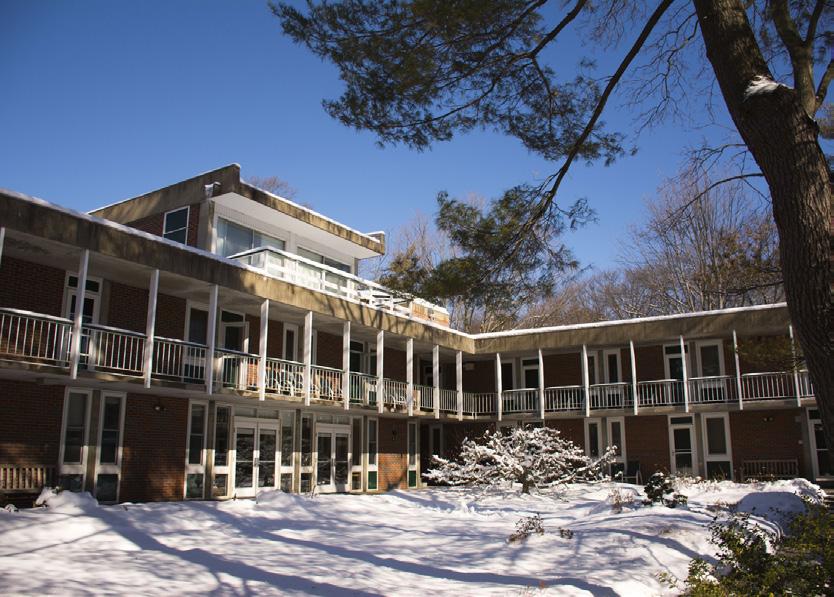
Wednesday 3/6
MOVING IN COMMUNITY
101 Rogers Street, 6:00 p.m. - 8:00 p.m.
Join an immersive moving experience, including a yoga-inspired warm-up, improvisational themed dance that incorporates stage elements, and a meditative sound bath. This experience is designed to promote restoration, mindfulness, and attunement to yourself, your community, and the space you inhabit.
Thursday 3/7
CELEBRATING INTERNATIONAL
WOMEN’S DAY WITH THE FIRST LADY OF SIERRA LEONE
HKS David T. Ellwood Democracy Lab, 11:30p.m.
Attend this celebration of International Women’s Day with speaker Dr. Fatima Maada Bio, First Lady of Sierra Leone, who will talk about her work as First Lady and participate in a Q&A session.
Friday 3/8
YES, WRITING IN GREATER MEXICO: A WOMEN’S CONVERSATION
CGIS South, 5:00 p.m. - 7:00 p.m.
This talk features speakers Sara Uribe Sánchez and Brenda Navarro, and will be moderated by Alejandra Vela Martínez, Assistant Professor in Spanish. Discussion will be centered on a re-reading of Mexican literary canon through the lenses of nationality and gender, as well as what ‘women’s writing’ looks like.
RIVER REFLECTIONS

ELYSE C. GONCALVES — CRIMSON PHOTOGRAPHER
THE HARVARD CRIMSON
1, 2024
Associate Managing Editors Elias J. Schisgall ’25 Claire Yuan ’25 Editorial Chairs Tommy Barone 25 Jacob M. Miller ’25 Arts Chairs Anna Moiseieva ’25 Allison S. Park ’25 D&I Chairs Lauren A. Kirkpatrick ’26 Hailey E. Krasnikov ’25 Associate Business Manager Mathias Melucci ’26 Meredith W.B. Zielonka ’25 Magazine Chairs Hewson Duffy ’25 Kaitlyn Tsai ’25 Blog Chairs Eve S. Jones ’25 Hayeon Ok ’25 Sports Chairs Katharine A. Forst ’25 Jack K. Silvers ’25 Design Chairs Laurinne Jamie P. Eugenio ’26 Sami E. Turner ’25 Multimedia Chairs Julian J. Giordano ’25 Addison Y. Liu ’25 Technology Chairs Dennis S. Eum ’26 Neil H. Shah ’26 STAFF FOR THIS ISSUE Night Editors Rahem D. Hamid ’25 Yusuf S. Mian ’25 Assistant Night Editors Sami E. Turner ’25 Sally E. Edwards’26 Nicholas J. Frumkin ’27 Nicole L. Guo ’27 Story Editors Ryan H. Doan-Nguyen ’25 Rahem D. Hamid ’25 Miles J. Herszenhorn ’25 Yusuf S. Mian ’25 Nia L. Orakwue ’25 John N. Peña ’25 THE HARVARD CRIMSON Paton D. Roberts ’25 Elias J. Schisgall ’25 Claire Yuan ’25 Design Editors Sami E. Turner ’25 Laurinne Jamie P. Eugenio ’26 Hannah S. Lee ’26 Tomisin M. Sobande ’26 Angel Zhang ’26 Catherine H. Feng ’27 Nicole M. Hernández ’27 Photo Editors Julian J. Giordano ’25 Addison Y. Liu ’25 Marina Qu ’25 Jack R. Trapanick ’26 Lara R. Berliner ‘27 Helen L. Piltner ‘25 Editorial Editors J. Sellers Hill ’25 Ian D. Svetkey ’25 Sports Editors Katharine A. Forst ’25 Jack K. Silvers ’25 Emma S. de Jong ’26 Nghia L. Nguyen ’26 Copyright 2024, The Harvard Crimson (USPS 236-560). No articles, editorials, cartoons or any part thereof appearing in The Crimson may be reproduced in any form without the express written permission of the President. The Associated Press holds the right to reprint any materials published in The Crimson. The Crimson is a non-profit, independent corporation, founded in 1873 and incorporated in 1967. Second-class postage paid in Boston, Massachusetts. Published Monday through Friday except holidays and during vacations, three times weekly during reading and exam periods by The Harvard Crimson Inc., 14 Plympton St., Cambridge, Mass. 02138 J. Sellers Hill ’25 President Miles J. Herszenhorn ’25 Managing Editor Matthew M. Doctoroff ’25 Business Manager CORRECTIONS The Harvard Crimson is committed to accuracy in its reporting. Factual errors are corrected promptly on this page. Readers with information about errors are asked to e-mail the managing editor at managingeditor@thecrimson.com. windy
ADMISSIONS
As Peer Schools Ditch TestOptional, Is Harvard Next?
TEST-OPTIONAL? Questions about the future of Harvard’s application requirements rise as peer schools move back to requiring standardized testing.
BY ELYSE C. GONCALVES AND MATAN H. JOSEPHY CRIMSON STAFF WRITERS
After Yale University and Dartmouth College announced the return of standardized testing requirements for applicants, admissions experts are divided on whether Harvard will follow suit.
On Feb. 5, Dartmouth announced that it would bring back its standardized testing requirement for all applicants effective for the class of 2029. Yale followed shortly afterwards, announcing its new “test-flexible” policy, which allows students to submit the SAT, ACT, or all of their IB or AP exam scores.
Yale’s policy is set to begin for the class of 2029 as well.
Though Harvard has committed to test-optional policies through the admitted Class of 2030, the University has remained silent on whether students in the Class of 2031 and onwards will be required to submit scores.
A Harvard spokesperson declined to provide additional comment.
Yale and Dartmouth join other top schools like MIT — which reinstated its testing requirement in March of 2022 — and Georgetown, which brought back its testing requirements starting with the class of 2026 after going “test-flexible” for the class of 2025.
Dan Lee, a co-founder of Solomon Admissions Consulting, said that he expects to see most “top schools” follow peer institutions in reinstating testing requirements and that Harvard is “probably at the same time waiting to see what the other Ivy plus schools do.”

“It provides a very useful data point for schools to use to determine whether a student’s going to do well,” Lee said. David Blobaum, a co-founder of standardized test tutoring firm Summit Prep, said that because of Yale and Dartmouth’s decisions to return to testing requirements, he believes other universities will do the same.
“It’s more likely that more of the top schools will go back, including Harvard,” Blobaum said. “If none of the top schools went back, or if it remained just MIT and Georgetown, then Harvard would only lose applicants if they went back to tests required, and so that would put them at a disadvantage relative to their other peer institutions.” Yale and Dartmouth’s decisions come after MIT’s return to testing requirements, as well as recent research indicating that SAT scores are a reliable predictor of student success in college and postgraduate outcomes.
A 2023 paper by researchers at Opportunity Insights, a Harvard-affiliated research center, found the SAT is more successful at predicting a student’s college performance
than high school GPA. In the wake of that paper, several experts have started calling for a return to standardized testing requirements.
Still, some elite schools — including other Ivy League institutions — have doubled down on their test-optional policies. Last year, Columbia University announced it would stay test-optional and did not specify a timeframe for any future decisions on its testing policy. Cornell University said last month that its testing policy — under which certain Cornell colleges are test-optional and others are test-blind — would remain in place for the upcoming application cycle.
Anna Ivey, former dean of admissions at the University of Chicago’s Law School and founder of Ivey Consulting, said “it’s good” that schools are not uniformly returning to test-required policies.
“It would be a bad sign for higher education if they were all moving in lockstep,” Ivey said. “Keep in mind that no policy is ever permanent. Schools will continue to review their policies as time goes by.”
Ivey said that no expert or admissions officer could yet indicate what Harvard intends to do.
Proctors and Tutors Plan to Launch Unionization Push
BY ARAN SONNAD-JOSHI AND SHEEREA X. YU CRIMSON STAFF WRITERS
than Palumbo declined to comment, citing policy against commenting on personnel issues.
According to Martinez, HURA intends to bargain with the University for a baseline compensation standard for residential advising roles, as well as standardized additional stipends for participation in undergraduate House committees.
“We also have a really important ask of the University which is to pay everybody in the residential staff system from house aid to proctor to tutor, because that system can be not only haphazard but also opaque and unclear,” Martinez said.
compensation concerns, some HURA members have also voiced complaints about inadequate housing conditions.
“There have been times when proctors and house aides have had to live through sub-zero temperatures, with apertures and openings to the elements at those times. There have been times when people have dealt with insect and rodent infestations,” Martinez said.
Smiley said residential advisers have a singular position on campus as not only employees but also tenants of Harvard.
“It’s very possible that the current administrators at Harvard don’t know yet either,” Ivey said. “Their research will continue to unfold, they will continue to have internal conversations about this. It might look differently a year from now or two years from now,” Ivey said. But Aaron M. Pallas, a professor of sociology and education at Columbia, said he does not predict Harvard will follow Yale and Dartmouth unless more top schools bring back testing.
“Harvard is an institution that is often taken as a reference point, and many institutions seek to emulate it, and thus raise their own standing,” Pallas wrote. “I thus don’t see Harvard looking to emulate other schools. As long as there are other elite institutions that don’t require college admissions tests, Harvard can chart its own path.”
“But if *all* of the other Ivy Plus schools required admissions, that might be enough to move Harvard in that direction,” he wrote.
elyse.goncalves@thecrimson.com matan.josephy@thecrimson.com
TASK FORCE FROM PAGE 1
Sadun Resigns As Task Force Co-Chair
Professor Sadun’s participation in the task force over the past weeks,” Garber wrote. “Her insights and passion for this work have helped shape the mandate for the task force and how it can best productively advance the important work ahead.”
Sadun’s resignation marks the second time the University has faced controversy after someone stepped down from a group assembled to combat antisemitism at Harvard.
Rabbi David J. Wolpe resigned from his position on an antisemitism advisory committee established by former Harvard President Claudine Gay on Dec. 7. Wolpe, whose resignation came days after Gay’s congressional testimony, wrote in a post on X that he stepped down because he could not “make the sort of difference I had hoped.”
Billionaire hedge fund manager Bill A. Ackman ’88, who has emerged as one of Harvard’s most vocal detractors since Oct. 7, appeared to reference Wolpe’s resignation in a post on X about Sadun’s decision to step down.
“The half life of a @Harvard antisemitism task force member is about 60 days,” Ackman wrote. “I wonder what’s going on.” Sadun served in her role as co-chair for fewer than 40 days. Wolpe sat on Gay’s advisory committee for less than a month.
Garber announced the full composition of the dual presidential task forces on combatting antisemitism and on combatting anti-Muslim and anti-Arab bias in a University-wide email to Harvard affiliates on Sunday.
Garber said that he asked the task forces’ co-chairs to “send recommendations to the deans and me on a rolling basis so that we might consider, refine, and implement interventions, and to keep the community apprised as our work
together proceeds.” It is unclear if Sadun’s dissatisfaction with the task force contributed to a delay in announcing its full membership, which Garber made public on Sunday, more than one month after he first formed the task forces on Jan. 19. The antisemitism task force is now led by History professor Derek J. Penslar — named alongside Sadun — and Harvard Law School professor Jared A. Ellias, who was named today. Garber’s antisemitism task force also made national news last month over Penslar’s appointment as co-chair. A number of Harvard affiliates called on Penslar to resign from leading the task force over past statements that described antisemitism at Harvard as “exaggerated.” Sadun did not comment on the reasons behind her departure in a Sunday statement shared with The Crimson through a Harvard spokesperson.
“I am grateful to have had the opportunity to help advance the vital work to combat antisemitism and believe that President Garber has assembled an excellent task force,” she wrote. “I will continue to support efforts to tackle antisemitism at Harvard in any way I can from my faculty position.”
tilly.robinson@thecrimson.com neil.shah@thecrimson.com
Brandon
point where we’re really strong and united.”
“There’s only an opportunity to go public once, so we are seizing on that moment,” he said.
Martinez said HURA hopes to negotiate with the University on issues including workload, compensation, job protection, and overall transparency.
According to Haden F. Smiley ’19, a member of HURA and a thirdyear tutor in Currier, HURA’s campaign gained traction after former proctor Elom Tettey-Tamaklo was indefinitely relieved of his duties following his involvement in a confrontation at a pro-Palestine protest in November. Tettey-Tamaklo has not since been reinstated to his post.
“Before that time, I don’t think that there was much movement,” Smiley said. “That’s when I wanted to get involved.”
Smiley said Tettey-Tamaklo’s dismissal “happened without any procedure, or transparency or equity, and in fact was a very political decision, from my perspective.”
“The University made it clear that this role was very precarious and the benefits we enjoyed were something that could be taken away from us for very little reason and very quickly,” they added.
Harvard spokesperson Jona-
Currently, the compensation system for participation in undergraduate House committees varies across committees and Houses, per Martinez.
“Alongside making sure there is pay at a base level for participating or belonging to the role and a community, we would like to have a say in which positions get compensated and make sure those are paid across the board,” he said. Palumbo wrote in an emailed statement that “we deeply value the important role that tutors, proctors, and Faculty Dean aides serve in shaping the academic and residential lives of Harvard College students.”
“As critical members of our community, we value their feedback and will continue to provide opportunities to improve our work together toward our shared goal of providing a transformational experience for our students,” Palumbo wrote.
Smiley also highlighted the imbalanced workload when certain residential advisers take on specialty roles.“With my roles, with the BGLTQ and the share-specialty roles, I don’t have really any guaranteed funding,” Smiley said. “I have to work harder to get funding for them, and so the the hours that I’m putting in look different as well.”
In addition to the workload and
“Our employer is also our landlord, and therefore has say over our housing, and that’s a unique position to be in as a worker,” Smiley said. “We deserve secure housing.”
“Harvard doesn’t make a very good landlord,” they said.
HURA members said the benefits of unionizing would extend beyond residential tutors, proctors, and house aides to also positively impact the students they work with.
Smiley said they are “really excited by the opportunity for this kind of collective leverage that HURA is working toward.”
“An equitable and transparent workplace would not just affect our lives but the students as well,” Smiley said.
Martinez also pointed to the potential benefits HURA could provide for students.
“Every staff member who works with students has a wonderful experience in that part of the role and loves it,” Martinez said. “We are looking for ways to be more effective in that role and to have more of a voice in the process.”
“We have the utmost hope for cooperation with the University, in getting ourselves from this stage to a full bargain with them in the next couple months or so,” Martinez said.
aran.sonnad-joshi@thecrimson.com sheerea.yu@thecrimson.com
University’s highest governing body.
When issuing taxable bonds it is common practice for firms to state that the capital raised is for “general corporate purposes,” and to use funds to cover commission, registration, accounting and legal fees.
The planned $750 million issue of the taxable debt financing is “unusual but not unprecedented,” and allows for borrowing that is not directly tied to a specific capital project, according to Harvard Business School professor Luis M. Viceira. “Taxable debt typically carries a rate higher than the rate on tax exempt debt, so it is in the interest of the university to issue that type of debt only when there is a very good reason to do so,” Viceira wrote in a statement.
A Harvard spokesperson declined to comment on the preliminary offering notice.
The rollout of Harvard’s latest debt financing comes amid rising overall investor confidence as corporate bond and U.S. Treasury bill yields have continued to fall. The credit spreads highlight a favorable opportunity to enter the bond market as investors demand for corporate bonds continues to grow.
“A long-term bond issue is probably the wisest thing to do at the present juncture since the current yield curve is inverted,” wrote Rutgers Business School professor John M. Longo in a
statement. “In other words, the annual yield on long-term interest rates is lower than that of short-term interest rates,” he added.
Harvard is expected to capitalize on the favorable market conditions and their AAA credit rating — which was cemented by a S&P report on Thursday — to secure lower yield rates than traditional corporate bonds, demonstrating the University’s extremely low default risk.
“Given Harvard’s AAA credit rating, I estimate the yield on a taxable 10-year bond issued by Harvard to be similar to the current yield of 4.25% on the 10-year U.S. Treasury Note,” Longo wrote.
Thursday’s announcement marks the first of two bond series that the University plans to take to the market in the coming months: $750 million of taxable fixed rate bonds and $900 million tax-exempt fixed rate bonds. Harvard’s planned tax-exempt bond sale issued by the Massachusetts Development Financial Agency is expected in the coming weeks.
thomas.mete@thecrimson.com

Harvard will officially enter the debt market on Friday when it issues $750 million in taxable bonds with the intention to use the capital raised for “general corporate purposes” and to pay the costs of bond issuing, according to a preliminary offering notice released on Thursday. The statement follows a Monday filing from the University announcing its intention to enter the market for $1.65 billion in debt financing with Goldman Sachs & Co. as the sole bookrunner. The University is under no legal obligation to disclose its intended use of the funds raised from the sale of taxable bonds issued by the Harvard Corporation, the
Harvard residential tutors, proctors, and house aides are planning to publicly launch a campaign for unionization, an effort they have been quietly working towards since last spring. The group, called Harvard Union of Residential Advisors, has been organizing privately since May and plans to file a representation petition with the National Labor Relations Board.
Some
M. Martinez ’20, a co-leader of HURA, said the group is “at a
NEWS 4 MARCH 1, 2024 THE HARVARD CRIMSON
THOMAS J. METE CRIMSON STAFF WRITER
BY
University to Enter the Debt Market for $750 Million Bond Sale
Harvard will enter the debt market Friday, issuing $750 million in taxable bonds. JULIAN J. GIORDANO — CRIMSON PHOTOGRAPHER THC Stay Up to Date with our Newsletter, Subscribe at THECRIMSON.COM MICHAEL HU — CRIMSON DESIGNER
Garber Announces Task Force Members
SHAKE-UP. Law professor Jared A. Ellias will co-chair the antisemitism task force with Derek J. Penslar, replacing Rafaella Sadun.
BY TILLY R. ROBINSON AND NEIL H. SHAH CRIMSON STAFF WRITERS
Interim Harvard President Alan M. Garber ’76 announced the full memberships of Harvard’s dual task forces on antisemitism and on anti-Muslim and anti-Arab bias in a University-wide email Sunday evening.
Garber initially announced the task forces on Jan. 19, along with the names of two co-chairs for each committee.
The Sunday update on the task forces came minutes after The Crimson reported Harvard Business School professor Raffaella Sadun had resigned from the antisemitism task force. Garber initially appointed Sadun to be a cochair of the group.
Harvard Law School professor Jared A. Ellias will replace Sadun as the antisemitism task force’s second co-chair alongside Harvard professor Derek J. Penslar. Garber wrote in his email that Sadun “has decided to refocus her efforts on her research, teaching, and administrative responsibilities.”
Sadun’s resignation is just the
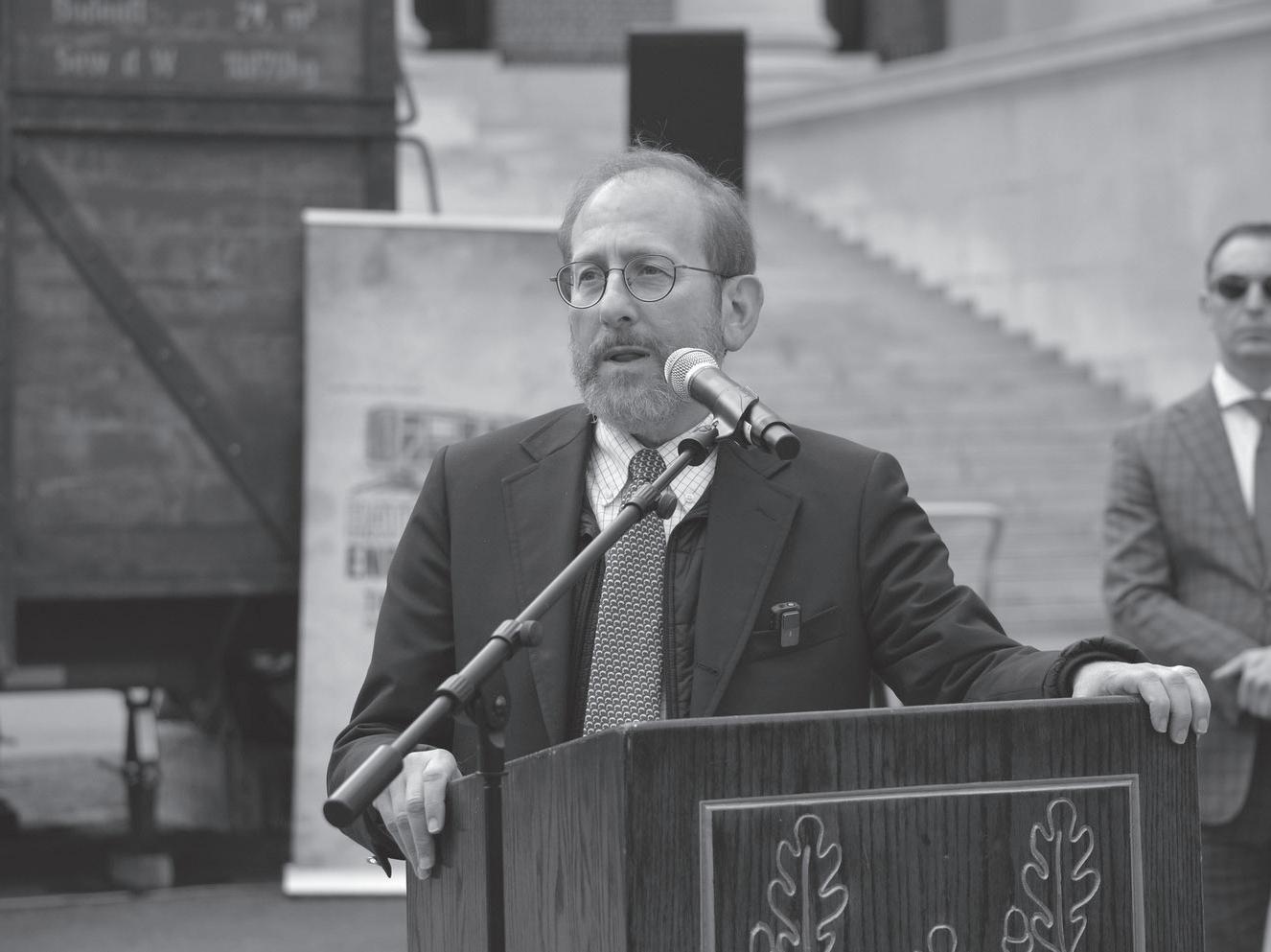
latest setback for Garber’s antisemitism task force, which received intense national scrutiny upon its formation over Penslar’s appointment as co-chair. Penslar came under fire over past statements that critics said downplayed the presence of antisemitism at Harvard. The intense criticism pushed Penslar to
consider resigning, but he stayed on after an outpouring of support from Harvard colleagues and Jewish Studies scholars.
Sadun’s decision to step down also follows Rabbi David J. Wolpe’s resignation from a now-defunct antisemitism advisory group formed by former Harvard President Claudine Gay.
Days after Gay’s controversial congressional testimony, Wolpe announced his decision to step down from the advisory committee in a post on X — which Sadun reshared on her account at the time. Garber also named a new cochair of the anti-Muslim and anti-Arab bias task force in his message on Sunday.
Ali S.A. Asani ’77, a professor of Middle Eastern Studies, will be the group’s third co-chair. Asani joins Harvard School of Public Health professor Wafaie W. Fawzi and Harvard Kennedy School professor Asim Ijaz Khwaja — whose appointments were previously announced.
University Professor Danielle S. Allen is notably the only member to serve on both task forces. Both groups will also be advised by Chief Diversity and Inclusion Officer Sherri A. Charleston, Associate Provost for Student Affairs Robin Glover, and a University attorney. Harvard Law School lecturer Ara Gershengorn, the University attorney who will advise the antisemitism task force, is the aunt of Harvard Hillel President Nathan B. Gershengorn ’26. Nadir S. Ahmed will as serve as the University attorney adviser for the task force on anti-Muslim and anti-Arab bias.
The task forces will also include student members. Nim Ravid ’25 and Erica F. Newman-Corre ’19, a third-year HLS student, will serve on the antisemitism task force. Jana Amin ’25 will serve on the anti-Muslim and anti-Arab bias task force, with further student members “to be determined.” Ravid, the College student, is the only member of Gay’s antisemitism advisory group who will also serve on Garber’s antisemitism task force this spring.
The group shared its recommendations for combatting antisemitism with the University’s administration before it disbanded.
The group’s recommendations have not been made public.
Harvard Divinity School student Shabbos “Alexander” Kestenbaum — the only named plaintiff among six students who filed a federal lawsuit alleging Harvard failed to address antisemitism on its campus — criticized Penslar and Charleston’s appointments in a post on X.
“Most of Harvard antisemitism stems from DEI,” Kestenbaum wrote, criticizing Charleston’s affiliation with the task force. Kestenbaum’s post mistakenly implies Charleston is a member, though she is an adviser to the group.
“We must do much more to bridge the fissures that have weakened our sense of community, and the task forces, which have the full support of the University, will be critical to our success,” Garber wrote in his email.
“I know that we care enough about each other and our University to join together in ensuring that Harvard offers an environment in which Jewish, Israeli, Muslim, Palestinian, and Arab students feel welcome and can thrive,” he added. “We should expect nothing less.”
tilly.robinson@thecrimson.com neil.shah@thecrimson.com
Meet the Secretary of Harvard’s Secretive Governing Boards
BY EMMA H. HAIDAR AND CAM E. KETTLES CRIMSON STAFF WRITERS
Marc L. Goodheart ’81 is the most powerful person at Harvard no one has ever heard of.
The immensely private, grayhaired man has served as a top adviser to Harvard’s secretive governing boards and the architect of its ultra-confidential presidential search processes for parts of four decades.
As Harvard faces its most challenging period in decades, Goodheart — unlike interim President Alan M. Garber ’76 and Senior Fellow Penny S. Pritzker ’81 — has not had to publicly answer for the controversy. But to the extent that Harvard has been in a leadership crisis, that crisis is as much Goodheart’s responsibility as anyone’s.
His role at Harvard is all-encompassing. Goodheart is a vice president and secretary of the University, chief administrative officer of the Harvard Corporation and the Board of Overseers — the two governing boards — and an adviser to the president as a member of his senior staff.
In short, he is “the keeper of the keys,” said Nannerl O. Keohane, a former Corporation member.
‘He Guards Everything’
At the highest and most secretive levels of Harvard governance, Goodheart has his hand in everything. When the Corporation and Board of Overseers meet in Loeb House, they are joined by Goodheart, who both crafts meeting agendas and is responsible for meeting minutes — the same documents that are now being subpoenaed by a congressional committee. He also serves as the chief administrative organizer during the University’s presidential searches, playing a key role in the selections of Lawrence H. Summers, Drew Gilpin Faust, Lawrence S. Bacow, and Claudine Gay.
Over the last few months, Harvard’s governance has been picked apart, with national publications taking an interest in the inner workings and membership of the Corporation.
The interest has only grown greater with the House Committee on Education and the Workforce’s investigation into Harvard, which has the potential to reveal the minutes of the governing boards’ meetings.
While the committee might not know it, a significant number of the internal documents it is now demanding that Harvard produce
by March 4 could have been written by Goodheart. “He guards everything,” Keohane said. “He’s in charge of the documents and he’s ultimately responsible for them.” Putting him in the rarefied company of the president and the treasurer, Goodheart sits in on both Corporation and Board of Overseer meetings.
In crafting the meeting agendas, he is also responsible for coordinating with the faculty deans of Harvard’s schools when they present updates from their schools to the Corporation annually.
Jeffrey S. Flier, former dean of Harvard Medical School, said his first interaction with Goodheart as dean was over email, when Goodheart set up his meeting with the Corporation and requested Flier’s presentation to the board be sent for review a few weeks in advance.
A few days later, Goodheart sent back a modified presentation, with slides removed or wording changed, according to Flier.
“This was supposed to be my presentation to the Corporation,” Flier said. “Why or how could he take it upon himself to change some of the details?”
Flier said that the scope of Goodheart’s influence within Harvard governance remained unclear to him.
“I didn’t know whether he was purely a scheduling functionary or someone deeply important to the conduct of the Corporation,” he said. “It could have been anything in between.”
“Nobody described his role to me in a way that would allow me to understand that,” he added.
An unwritten part of Goodheart’s job description is also to stay out of the spotlight.
The last time The Crimson wrote extensively about Goodheart was in 2000, just two years after he became secretary of the governing boards. It was the last time any news outlet wrote about Goodheart.
Goodheart didn’t speak to reporters then, and he wouldn’t for this article.
‘The Right Kind of Person’
Former Harvard President Neil L. Rudenstine brought Goodheart back to the University in 1992, and tasked him with bridging the gap between the Corporation and the Board of Overseers as an assistant to the president. “When we met, I immediately felt that he was exactly the right kind of person we needed,” Rudenstine said.
Rudenstine said a key problem was establishing a unique role for
the Overseers within Harvard’s governance.
Rudenstine said that the Corporation was essentially the University’s sole decision-making body, a role that “was difficult for some Overseers to accept.”
While Goodheart would never admit to playing a key part in expanding the role of the Overseers to include oversight of academic programs, Rudenstine said, “he helped out, no question, articulating that conception.”
After Rudenstine’s retirement, Goodheart has served under six other Harvard presidents — including two interim leaders — over 32 years: Summers, Derek C. Bok, Faust, Bacow, Gay, and Garber. He has served within the highest echelons of Harvard’s governance for decades even as University presidents, provosts, Corporation members, and Overseers have come and gone — acting as an adviser and confidant to each of them.
Gettysburg College President Robert W. Iuliano, who served as the University’s general counsel from 2003 to 2019, said that Goodheart “remembers everything.”
“He helps us see not only the issue before us, but he can situate it into a much broader tableau of institutional values and traditions and prior decisions,” Iuliano said.
Patricia S. Bellinger ’83 — Bacow’s chief of staff at Harvard — said Goodheart is referred to as the “institutional historian” of the University.
“We joke that he must have been around a century ago, such is his dominion of Harvard’s history,” she wrote.
But Goodheart has also helped create a lot of Harvard history over his three-decade tenure serving as a secretary to the governing boards.
The Corporation underwent a series of structural reforms in the wake of Summers’ resignation in 2006, shepherded the University through the Covid-19 pandemic, and is now facing the fallout of a monthslong leadership crisis that ended with Gay’s sudden resignation on Jan. 2.
“Marc is an institutional treasure,” said Paul L. Choi ’86, a former president of the Board of Overseers. “Particularly during times of challenge, we are fortunate to have him in service to the University.”
‘Discreet’
Former administrators and members of the governing boards all use the same handful of adjectives to describe Goodheart — witty, intelligent, and incredibly loyal to the institution.
“If you happen to be the secre-
tary to the board, the temptation to put yourself forward and to try to be more influential than you might be or should be, it could be great,” Rudenstine said. “In Marc’s case, it’s zero.”
Bellinger wrote that Goodheart “would have been a great spy.”
“But if you want to get him to spill, you just draw him out about his family,” she added. “He can’t help it.”
One former member of the Board of Overseers described Goodheart as “too brilliant to not have an opinion” on agenda items, though he always had an “artful way of not appearing to reflect any personal bias.”
Another said that Goodheart would avoid speaking in Overseers meetings, “religiously so.”
Keohane, who served on the Corporation from 2005 to 2017, said that Goodheart’s personality is a mix between journalist and lawyer.
Goodheart was president of the Harvard Independent as an under graduate, a reporter for the Miami Herald, and worked for several years as a lawyer after graduating from Harvard Law School.
“Journalists, of course, are in the business of trying to fer ret things out and reveal them and make them all open. And lawyers are in the business of trying to show only part of the truth when they need to do it in order to support a case,” Keo hane said.
“It’s almost as if you got two dif ferent personae coming together in an impeccably successful per son in supporting the Corporation and being an assistant to the presi dent,” she added.
Goodheart plays an important role in crafting institutional mes saging and the University’s insti tutional prose is often his. But he is also the force be hind the witty introduc tions for honorary de gree recipients at Commencement.
Bacow called Goodheart “one of the best writ ers I know” in an emailed state ment.
Choi re called that at the Board of Over seers’ farewell dinner for Ba cow, Goodheart transformed the song “They Can’t Take That Away From Me” into a “hilarious and
touching rendition about Larry’s life and work at Harvard.”
‘Ultimate Institutional Loyalist’ Goodheart’s job — like many in Harvard’s central administration — got a lot harder after Oct. 7.
Even for a seasoned institutionalist, acting as an adviser to a president under fire while also serving as the chief administrative officer to the very board that could — and ultimately did — lose confidence in the president is a tall order.
Summers wrote in a statement that Goodheart is the “ultimate institutional loyalist” who has had a “profound influence shaping 21st century Harvard.”
But as the governing boards search for Harvard’s 31st president, Goodheart’s role is only going to get harder and more essential for the University.
Garber wrote in a statement
vard to serve as provost.
“He is a valued colleague whose wise and insightful advice helps us to advance the values and mission of the institution,” Garber added. “I am deeply grateful for his dedicated and diligent work supporting the Governing Boards and the Office of the President.”
As Harvard looks to recover from a crisis and transition to a new president, Goodheart’s wealth of knowledge will be of paramount importance to ensure a smooth transition. His work, however, will occur out of sight from most Harvard affiliates.
“He relishes working discreetly behind the scenes for the good of the institution and despises the limelight,” Bellinger wrote.
“He will be very displeased that I have given you any intel whatsoever, but he deserves recognition (once a decade or so is about all he can tolerate),” she added.
emma.haidar@thecrimson.com cam.kettles@thecrimson.com
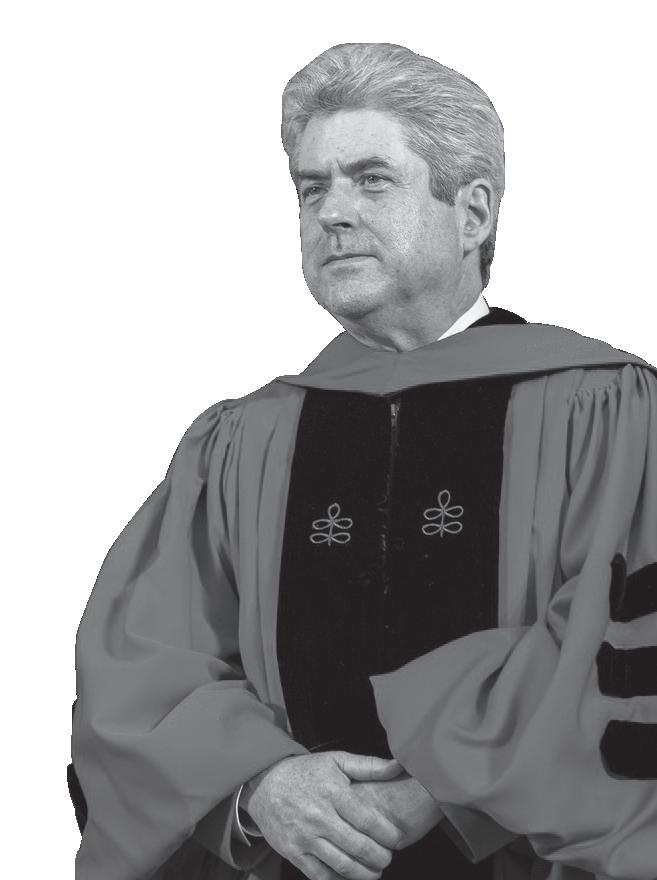
NEWS 5 MARCH 1, 2024 THE HARVARD CRIMSON
Harvard
Alan
announced
full memberships of the dual presidential task forces on antisemitism and anti-Arab and anti-Muslim bias
Sunday.
UNIVERSITY
Interim
President
M. Garber
the
on
CLAIRE YUAN — CRIMSON PHOTOGRAPHER
Marc L. Goodheart ‘81, a top adviser to Harvard’s secretive governing boards, is pictured above at the Commencement ceremony in 2022. ZADOCK I. N. GEE — CRIMSON PHOTOGRAPHER
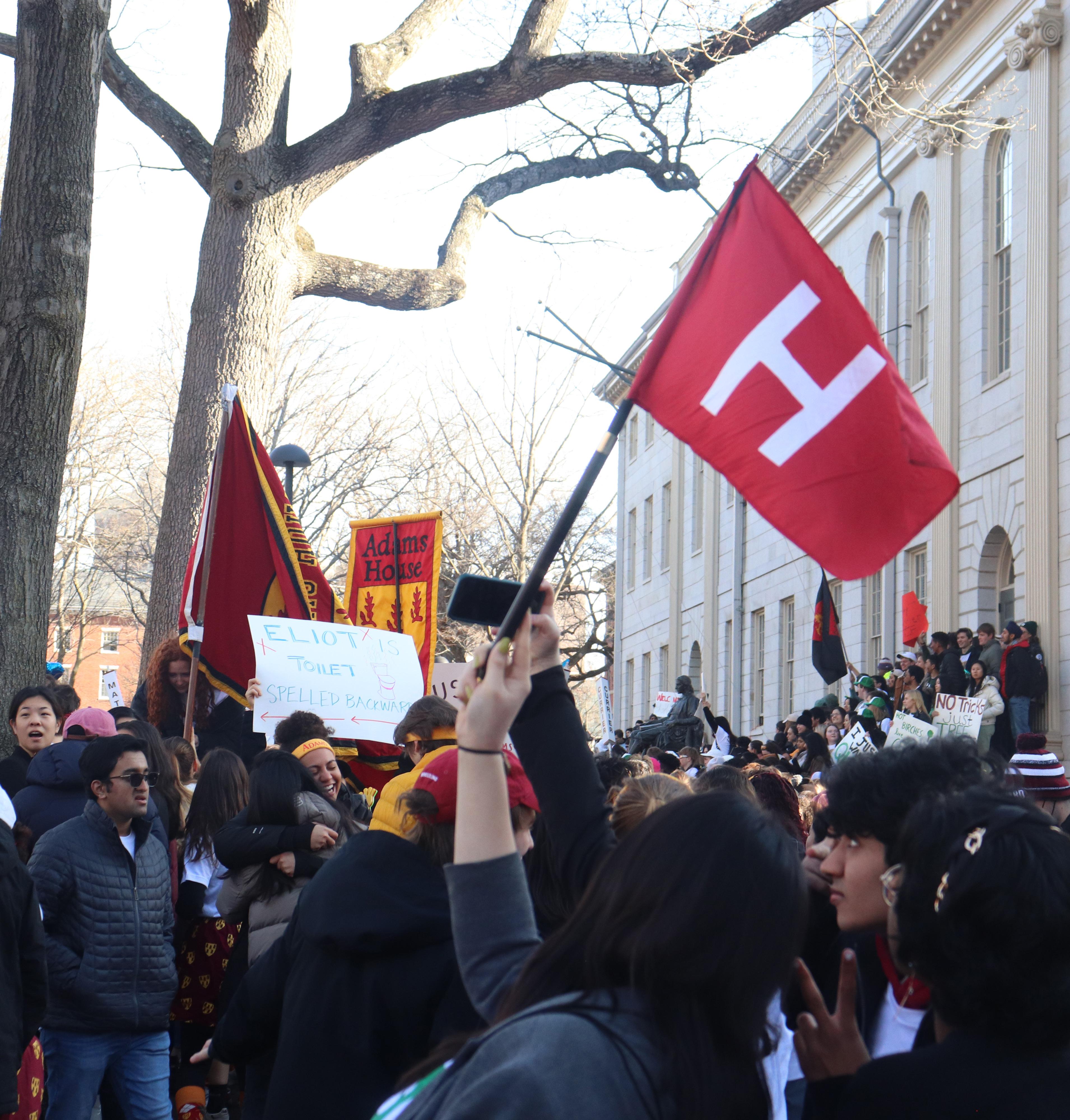
What’s the Move? Harvard’s Lackluster Social Scene
On Wednesday night, the eve of Housing Day, hordes of freshmen will participate in a tradition known as River Run, in which students attempt to drink a shot of alcohol in each of Harvard’s nine upperclassman river Houses.
This year, freshmen will have swipe access to the Houses during the event — a noted shift from past River Runs, during which freshmen were known to scale fences and walls, dodge police officers and security guards, and sneak through underground tunnels.
The Dean of Students Office will also provide games and food trucks, in addition to an enhanced security presence — all changes geared toward deterring students from putting themselves into unsafe situations.
But some students said this change “takes the fun away” from a beloved student-organized tradition defined not by administrative involvement, but the lack thereof.
“That defeats the whole purpose of River Run because all the fun is from running from the guards and trying to find creative ways to get into the houses,” Gabi Poniz ’26 said. “If you
just walk in, what’s the point?”
It is a hit Harvard’s social scene may not be able to afford.
Many students described a social scene where besides a handful of bright spots — such as Housing Day and the Harvard-Yale game — traditional college revelry, characterized by roaring parties, vibrant and frequent tailgates, and school spirit in abundance, has been missing at Harvard. While administrators cite a hands-off approach to social life — and a lack of available funding for College-organized parties and concerts — some students said officially sanctioned social events did not meet the mark.
In interviews with The Crimson, student group leaders, two top College administrators, and dozens of undergraduates tackled a difficult question: where is Harvard’s sense of fun?
Lagging Behind
It was the morning of Harvard-Yale in 2022, and students were taking matters into their own hands.
Days earlier, Lauren E. Brandt ’01 — then the interim dean of students — had announced a set of restrictions on tailgates before The Game, including limiting alcohol distribution and prohibiting undergraduate-hosted pregames.
The announcement was met with frustration from students, who felt the administration’s stance stifled their hopes for Harvard’s most eagerly-anticipated football game.
In response, Harvard’s final clubs organized a separate, unofficial pregame for students which began at Allston Field be -
fore being forced to migrate to the bank of the Charles River and, finally, the Malkin Athletic Center Lawn.
The scene was different one year later in New Haven, where an expanse of parking lots outside the Yale Bowl were left mostly free for student- and alumni-organized festivities before The Game.
“I think that they do Harvard-Yale a little better than we do,” Sean M. Fallon ’23-24 said.
While Harvard’s unsanctioned tailgate ultimately proved successful, many stu -
tions of Harvard being a very fun place to go to,” Hussain said. “And my expectations were met.”
Though DSO partner organizations like the College Events Board and the First Year Social Committee plan events including concerts like Yardfest and Crimson Jam and parties like the First Year Formal, some students said these events can be disappointments.
Isha Agarwal ’24, a former CEB co-president, said she has often been put in the position of defending Harvard against the
that are organized by their peers. “It’s easier for students — like for us all — to have fun at an event if it feels initiated by students,” Pimentel said. “I think that kind of helps with the stigmatization of a University-organized event being lame.”
‘There Was Just Literally Nothing’
But as Harvard’s undergraduates wonder why the College can’t throw the party of their dreams, administrators say the pool of money is quickly drying up. The culprit, they say, is a student body that has increasingly opted out of paying the Student Activities Fee.
Revenues from the optional $200 fee — which funds the College Events Board, HoCos, the Harvard Undergraduate Association, and the Student Advisory Committee for the Harvard Foundation — have decreased by $70,000 this year compared to last year, following a rise in opt-outs when students were sent home from campus in 2020.
Dunne said the SAF being optional is “rare” compared to peer institutions.
“I do think that there is an issue where, to say to students, ‘You can waive and not pay this fee,’ there isn’t a really easy way to then say to that student, ‘You chose to waive the fee, so you can’t come to Yardfest, you can’t come to Crimson Jam, you can’t get on a Yale bus,’” Dunne said in an interview Wednesday.
Meier urged students to be more conscientious about their decision about whether to contribute to the SAF fund and the impact that has on the student body.
“This conversation about social life and the student activity fee is all wrapped up together,” he added. “I think a lot of students don’t realize by opting out, they’re exacerbating this larger problem that we already have.”
Agarwal said her role on CEB changed her perspective on administration-sponsored social programming.
dents said the restrictions were one example in a widespread pattern of Harvard social events falling short of their ideal vision of carefree college fun.
“There’s fun on the level of clubs and organizations and stuff,” Brooke C. Jones ’26 said of Harvard’s social atmosphere. “But I feel like when it comes to parties and school spirit for sports, we do lag behind state schools and other universities.”
F. Umaama Hussain ’27 said that coming to Harvard, she wasn’t under any illusions about the campus social scene.
“I don’t think I had expecta -
“popular critique” that its concert headliners are “one-hitwonders from the 2000s.”
“Especially when you think of big-ticket events like Yardfest, where if you compare the name of our headliner to even other Boston schools or other schools around the country, it’s often hard to understand why Harvard is not able to get a more up-and-coming artist or someone who’s more popular today,” Agarwal said. Honor C. S. Pimentel ’25, the Quincy House Committee cochair, said students are more likely to buy into social events
According to Associate Dean for Student Engagement Jason R. Meier, the flood of opt-outs left the DSO in a tricky financial situation.
“Students are demanding more funding for events and activities, and the funds were gone — there was literally nothing,” Meier said.
“We’re never going to get the headliners that you all want for Crimson Jam and Yardfest,” Meier added. “Everyone was like, ‘Oh, get Ice Spice’ last year. Ice Spice was going for a cool half a million dollars last year, without an album yet.” Dean of Students Thomas
“I’ve often come on the defense of Harvard’s social life, when I hear students or my friends or anyone complain, like ‘Oh, Harvard doesn’t have any events,’ or ‘Harvard doesn’t have school spirit,’ things like that, just because I’ve been involved in CEB and I’ve seen all of the red tape they have to go through to plan events,” Agarwal said. Regarding annual celebrations like the Harvard-Yale tailgate and River Run, Dunne said he wants the DSO to “be connected to the celebratory traditional nature.”
“I think traditions are really important, and I think it’s really great,” Dunne said. “It’s a great way for us to show people who are not at Harvard what Har -
MARCH 1, 2024 THE HARVARD CRIMSON
COVER STORY 6 BY NATALIE K BANDURA AND AZUSA M. LIPPIT CRIMSON STAFF WRITERS
TRUONG L. NGUYEN — CRIMSON PHOTOGRAPHER Jason R. Meier Associate Dean for Student Engagement Everyone was like, ‘Oh, get Ice Spice’ last year. Ice Spice was going for a cool half a million dollars last year, without an album yet. “ STUDENT LIFE. In interviews with The Crimson, student group leaders, two top College administrators, and dozens of undergraduates tackled a difficult question: where is Harvard’s sense of fun?


vard looks like and feels like.”
Though Dunne said he hopes undergraduate social life is “student-directed,” he stressed that the DSO has to ensure student safety when students participate in large, unruly events — particularly with alcohol.
“I do think it’s really important that collectively, we are not just keeping mindful of our own safety but the safety of others,” Dunne said. “I have been in the incredibly difficult situation of communicating with families when something did happen, and it’s a horrible experience for everybody.”
‘People’s Definition of Fun’ Though some students remain underwhelmed by what the College has to offer, many said Harvard students lack the school spirit necessary to sustain a vibrant, college-wide social life — particularly when compared to other schools.
“I think people have a lot of pride going to Harvard,” Fallon said. “But as it pertains to sports, for example, and that kind of school spirit, I would not put us at the top of the heap.”
Fhasal M. Alam ’27 said Harvard could look to Duke as a model of how to “both work hard and play hard.”
“I think Harvard could definitely kind of take that into consideration in terms of inspiration for their sports teams and that kind of thing,” Alam said.
Many students said that because of the difficulties involved with throwing on-campus events, much of Harvard’s party scene is centered around its exclusive final clubs, which have large spaces and minimal oversight.
Maggie R. Mano ’24 described fun at Harvard as “catered” and “very exclusive.”
“There’s the final clubs, the parties, but you have to be invited, you have to be in the right circles. You have to kind of make your own fun if you’re not really with those groups,” Mano said. Meier said he finds the culture around final clubs at Harvard — which Meier said “really control private, off-campus parties” — “really worrisome.”
Some students have taken it upon themselves to try to build a positive, inclusive culture across the College.
In the fall of his sophomore year, Kwaku O. Adubofour ’24 said he noticed increased school spirit around Harvard-Yale and wished that level of excitement for games could occur “every weekend.”
The weekend before The Game, he started an Instagram account with the username “harvardstate1636,” which now has nearly three thousand followers. In the fall season, Adubofour — who plays football for Harvard — posts 3 to 4 times per week with information about games, tailgates, and attire themes for the student section.
The posts encourage student attendance at a wide range of Harvard athletics games, including football and basket-


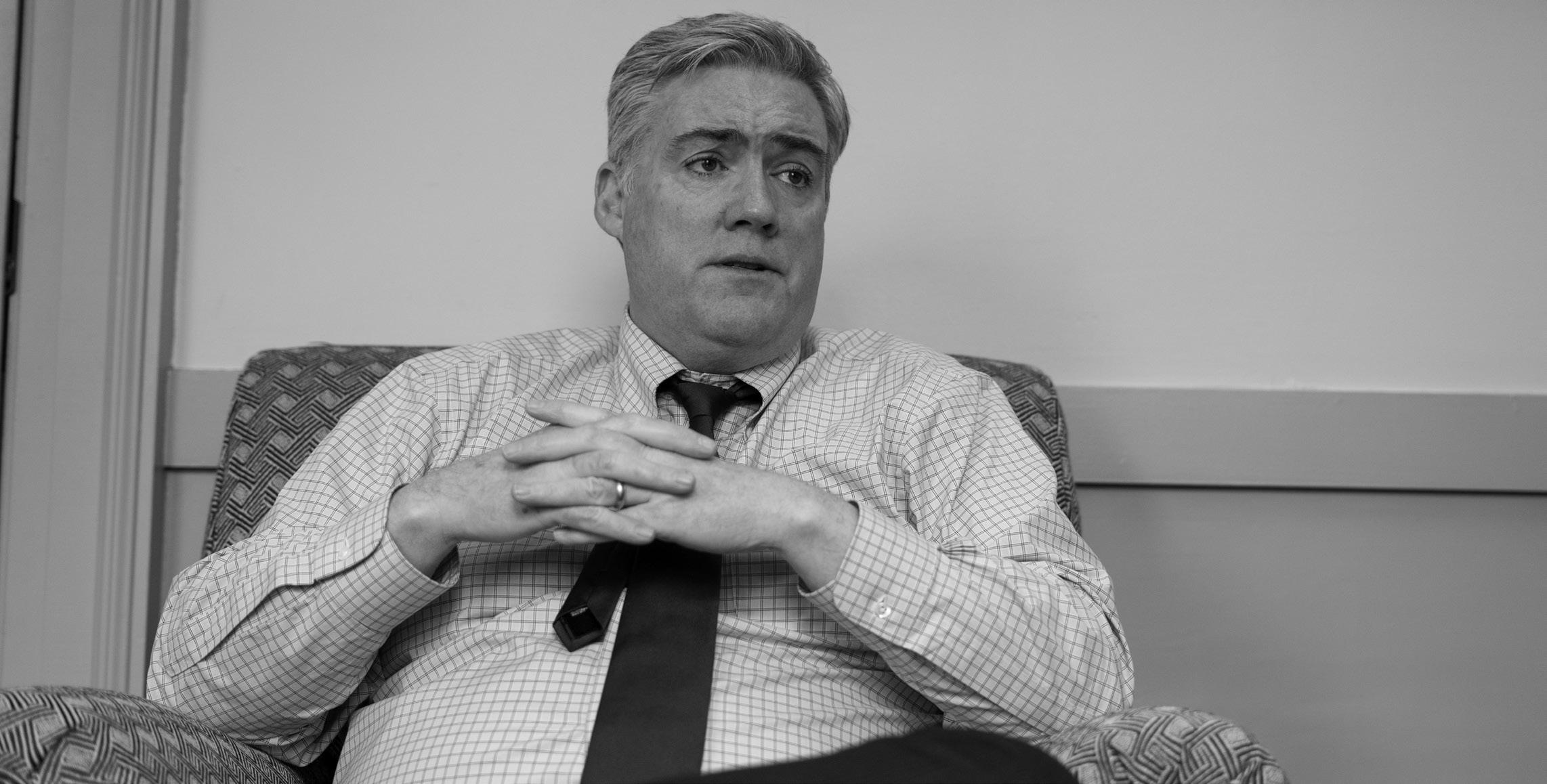
ball as well as less-attended games like women’s soccer and field hockey. Adubofour said he thinks the posts generated a significant increase in attendance.
“We’d come in 150 kids deep to a basketball game after the tailgate and the team would tell us, ‘We haven’t seen this many fans there in a long time,’” Adubofour said. Austin D. Kaufman ’25 also hopes to bolster school spirit — by institutionalizing a turkey mascot, a project in collaboration with Harvard Athletics and approved by the Harvard Undergraduate Association. Kaufman said he envisions students walking through the Yard on their way to class and “giving the turkey a fist bump.”
“I think people underrate the value of a smile, or a laugh,” Kaufman said. “I think it’s just this way to reach a lot of students and diffuse some of the tension that might get in the way of the fun that can come with an institution like Harvard.”
Some students said though Harvard’s social life may at times seem exclusive, restrictive, or lackluster, it is up to students to find alternatives.
“I don’t think that Harvard’s boring, but I think it depends on people’s definition of fun,” Kylie L. Hunts-in-Winter ’25 said.
“One limitation here at Harvard is that you do have to make somewhat of an extenuating effort to have fun, it’s not just easily accessible,” she added.
“There’s so much that you can critique in terms of exclusivity on Harvard’s campus. I feel like it is such a big feature that governs so much of social life,” Taylor Fang ’25 said. “But I do think that there is also a parallel tendency of a lot of people who complain about it but aren’t necessarily trying to do anything about it, or even really seeking out alternate social spaces.”
Chibuikem C. “Chuby” Uche ’24 — who last year lived in Currier House’s ten-man suite, known for hosting parties in its spacious common room — also said students have the power to change their own social landscapes.
“If you’re someone who’s wanting to go to these events, which clearly shows that you have this drive, you want to have fun or do things — don’t be afraid to just do one on your own. Foster your own environment, create the environment that you want to see,” Uche said. natalie.bandura@thecrimson.com azusa.lippit@thecrimson.com
MARCH 1, 2024 THE HARVARD CRIMSON COVER STORY 7
THC
more at THECRIMSON.COM
Read
Harvard and Yale undergraduates attended an unofficial tailgate on the lawn in front of the MAC before the 2022 Game. CLAIRE YUAN — CRIMSON PHOTOGRAPHER
LIU
an interview Wednesday morning.
Y. LIU — CRIMSON
Mather House students crowded the steps of University Hall on Housing Day last year. TRUONG L. NGUYEN — CRIMSON PHOTOGRAPHER
Singer Nicky Youre performed at Crimson Jam in September 2023. ADDISON Y.
— CRIMSON PHOTOGRAPHER Dean of Students Thomas Dunne speaks to Crimson reporters in
ADDISON
PHOTOGRAPHER
Singer, songwriter, and producer Jeremih headlined Yardfest 2023. JOEY HUANG — CRIMSON PHOTOGRAPHER
VITALITY. Harvard College’s Intellectual Vitality Initiative has debuted after three years of talks and quiet meetings.
BY MICHELLE N. AMPONSAH AND JOYCE E. KIM CRIMSON STAFF WRITERS
After nearly three years of quiet meetings, Harvard College’s Intellectual Vitality Initiative has finally gone public.
The initiative, spearheaded by College Dean Rakesh Khurana and a committee of undergraduates, faculty, and administrators, began student-facing programming early this semester and will launch “phase three” of its plan to improve the free exchange of ideas on campus in the summer.
The initiative comes as Harvard’s student body experiences intense divisions over student activism surrounding the war in Gaza and Harvard’s leadership crisis. Khurana clarified in an interview with The Crimson last Tuesday that intellectual vitality programming was planned last year and was not a reaction to
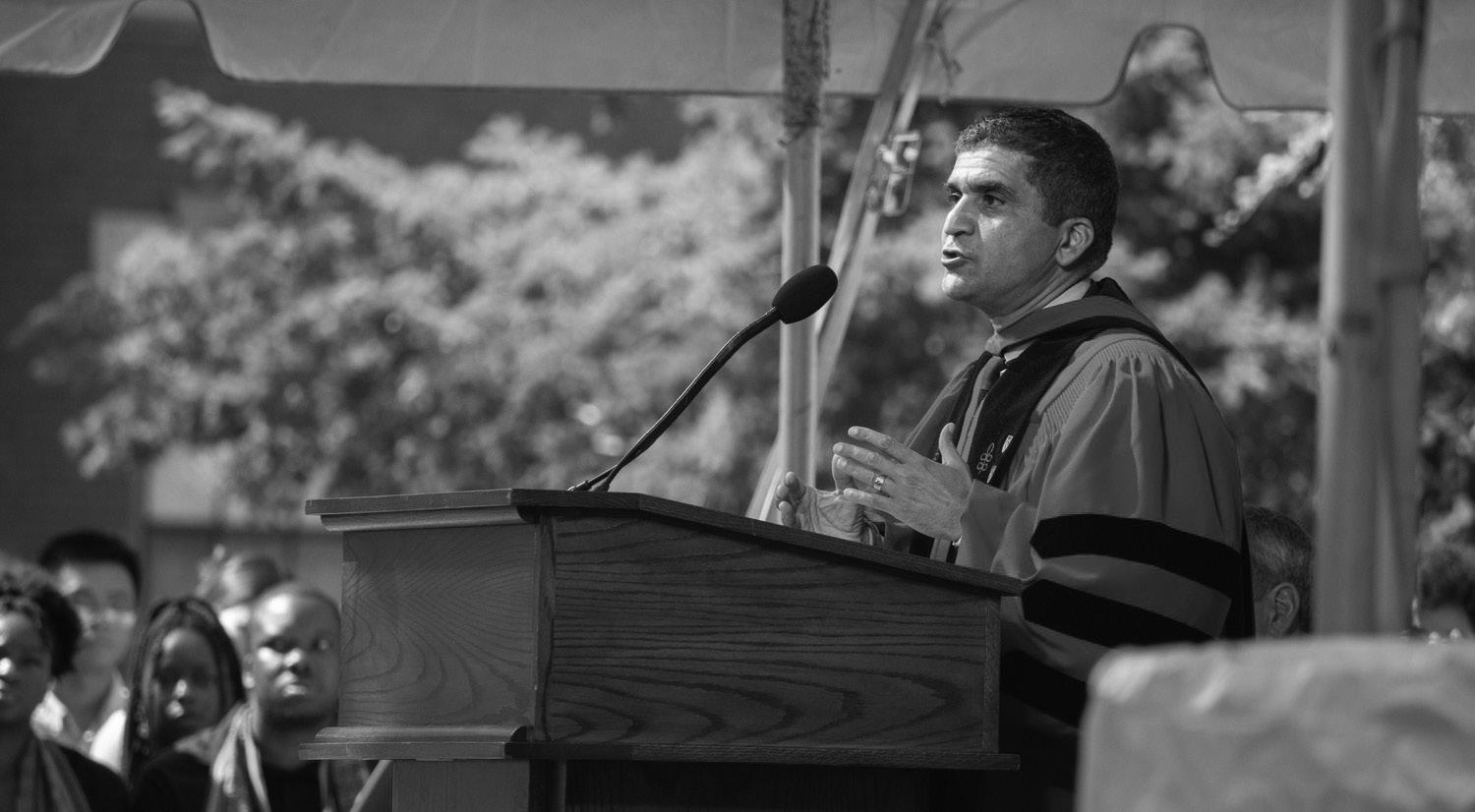
campus controversies. Still, as Harvard emerges from a painful fall semester, its top administrators have been increasingly concerned about self-censorship and a potential chilling effect on speech on campus.
Interim President Alan M. Garber ’76 told The Crimson he was disturbed by students censoring themselves in the face of anti-Isra-
el sentiments late last month, and Faculty of Arts and Sciences Dean Hopi E. Hoekstra launched a “civil discourse initiative” in December.
The intellectual vitality initiative is conducting a survey of undergraduates and began trainings for proctors and tutors in residential houses earlier this semester.
The initiative will launch a new dialogue series this spring
with the FAS called “Books Open, Gates Unbarred” to discuss current events, per its website. The third phase will also include redesigning required freshman Expository Writing courses and incorporating intellectual vitality into programming for incoming students.
Ariel F. Kohn ’26, an Intellectual Vitality undergraduate fellow,
DATAMATCH FROM PAGE
said that the goal of the student survey is “to establish a starting point and to understand where we are right now with respect to the different metrics of intellectual vitality.”
Kohn said the student body is experiencing a lot of “self-censorship” and “self-segregation” and that there is a long way to go before Harvard’s campus can effectively maintain a healthy academic and intellectual culture.
The group began in 2021 when students approached Khurana with concerns about the free exchange of ideas on campus and a desire to “engage in open, thoughtful conversation.” Since its founding, some members have been invited to speak before the Faculty Council and the Harvard Board of Overseers, the University’s second-highest governing body.
Khurana told The Crimson that the transition from informal discussions to programming for intellectual vitality was enabled by the support of donors.
“In June, the College sets goals and priorities,” Khurana said. “We shared those with — as we ordinarily do — the community, including communities of donors.”
“There were people who were
interested in supporting this, and they provided resources to support the work that we were doing on intellectual vitality,” he added.
Though the initiative’s existence was first reported by The Crimson in April 2023, it was officially introduced to undergraduates via a free expression summit co-hosted by the College and PEN America on Jan. 18 and 19. During his interview, Khurana stressed the distinction between intellectual vitality and free speech, which he said was “anchored more within a political tradition.”
“Intellectual vitality is really critical to what it means to be a liberal arts and sciences education,” he said.
Kohn said the project’s goal is to ensure that every Harvard student knows what intellectual vitality is and is “bought into the mission.”
Intellectual vitality should be “something that makes students feel proud to go to Harvard — that helps define their experience,” she added.
michelle.amponsah@thecrimson.com joyce.kim@thecrimson.com
learning experience to plug holes in our defences and discover unknown risks.”
Between Sept. 29 and Nov. 20, around $170,000 was deposited into the separate bank account created by Harper, after which the funds were transferred back to the official account and full control over the accounts was restored.
It is unclear exactly when the IRC managed to fully restore access to the external account created by Harper.
Yulin Li, an external accountant hired by the IRC, first warned the IRC’s treasurer, Michael G. Baxter ’24, and the group’s chief auditor, Matas Kudarauskas ’25, about the breach in financial security on Oct. 20, when he asked for “more information” about a new bank.
Li followed up about the new bank two additional times on Oct. 26 and Oct. 31, before Kudarauskas told Li on Nov. 1 that the IRC had “found no record” of the new account.
The report’s conclusions offered a fierce indictment of the IRC’s financial officers over their slow response to Li’s increasingly panicked emails and an alleged lack of transparency with the IRC’s board of directors.
“The lack of urgency displayed by the Treasurer and Chief Auditor was extremely concerning,” the interim report stated. “For seven weeks money flowed out of the IRC and they did nothing.”
“It took a month of panicked warnings for our external auditor as well as others to help them make the change,” the report added.
port that top leadership inform the full board, according to a person with knowledge of the situation.
“The lack of transparency with BoD is extremely concerning,”the report stated. “BoD needs to be aware of what is happening so it can assist with decision-making and take appropriate action to protect the organisation’s interests.”
‘My Illegal Removal’
Harper alleged that he suffered emotional damages over his ouster and demanded compensation for being unable to participate in several upcoming Model United Nations conferences, according to a Feb. 10 email obtained by The Crimson.
Founded in 1974, the IRC is a student-run umbrella organization that oversees undergraduate groups like Harvard Model United Nations, Harvard National Model United Nations, the Harvard International Review, and the Harvard Program for International Education. On its website, the IRC touts itself as a student-run nonprofit with an “annual budget of nearly one million dollars.”
In the Feb. 10 email, which Harper sent to IRC leadership and Associate Dean for Student Engagement Jason R. Meier, he requested $10,000 for emotional damages stemming from “my illegal removal” and an additional $5,500 for denial of involvement in HMUN and HNMUN Africa.
al from the IRC was in breach of Massachusetts Law, pointing specifically to Massachusetts General Law Part 1 Title XXII Chapter 180 Section 18. The section states that corporations may not expel their members with less than a majority vote. The IRC confirmed in a statement that its board voted to temporarily remove Harper as a member.
Harper’s small claims case against the IRC is for $7,000, the maximum amount for Massachusetts small claims.
The case, which was filed in Cambridge District Court on Feb. 19, is set to be heard on April 9.
In the email, Harper also wrote that all of his incurred legal fees will be charged to the IRC, per the organization’s by-laws.
Harper additionally requested that the IRC and Dean of Students Office acknowledge his “illegal” removal and ensure full reinstatement.
The IRC wrote in their Tuesday statement that the investigation conducted by a third party into Harper’s behavior concluded on Monday. The group did not disclose any details about the conclusions of the investigation.
The group’s board of directors will “vote on the timeline to reinstate Harper as a general member in good standing” of the IRC by early March, according to the statement. “The Board denies any liability to Harper relating to the allegations in his complaint,” the IRC wrote.
to specific students and represented only “1/10 of 1%” of the data available to him and that it will be deleted after one week.
Yoon said he took security measures to ensure student privacy on his website and processed the data in way that was not visible to him. He wrote in a description of his website that the list was encrypted with “a secure key.” If a student’s initials were rare or unique within the class, Yoon said he redacted their last initial and included only the first letter of their first name.
Yoon said he learned Datamatch users’ photos were accessible through a link anyone could type into their browser, which led him — as well as some others, including his brother — to look further into Datamatch’s data security. According to Yoon, Datamatch does not encrypt most user data. He also said that when a user searches for or matches with another user, the other user’s data is sent to their device.
“We found literally all the private/personal user input data they store — from rice purity score to gender identity to location on campus. for all of the hundreds of thousands of people across all the dozens of schools that participated in datamatch,” Yoon wrote. Yoon wrote on the website that “anyone with 10 seconds can thus pull this sensitive/vulnerable user data from their personal device.”
Yoon also claimed that Datamatch’s algorithm “discriminates against ethnic names” because it can’t accommodate diacritics, such as accents over letters.
the attributes mentioned by the report.”
“We can guarantee that all profiles have been locked since approximately 9:30pm so that users can only view their information and no one else can,” Han said. “As of right this moment, all rice purity score information is deleted.”
In a section about data privacy on their website, Datamatch assures users that their data will be viewed and handled sparingly.
“The Datamatch team personally touches your information only as much as is necessary to develop the Algorithm™ and resolve user issues,” the website reads. “We may collect some anonymous stats like usage statistics, but your name and contact info will be completely separate from such reports.”
In a statement addressed to “harvard peers” on his website, Yoon warned students about the danger of big data and urged them to take data privacy seriously.
“We live in a society where dubiously-ethical governments and less-than-ethical corporations are looking to capitalize on this useful tool,” Yoon wrote, listing examples of the U.S. and Chinese governments buying data from brokers.
Yoon went on to warn students of the “fourth industrial revolution,” writing that “aggregate computing capacity is growing at an exponential rate.”
In his statement, Yoon also expressed his surprise that students had willingly given their data to Datamatch.
“It shocks me how many of u were willing to input sensitive data into things like claim and datamatch, even right here on campus,” Yoon wrote.
Yoon said he chose to release Rice Purity Scores to draw attention to the issue without causing users harm.
“I just picked it because I thought it would gain the most attention without being damaging to other people’s futures,” Yoon said.
“If someone else had thought about this before I did, they could have done really terrible things with this data,” he said.
In the future, Yoon said he hopes to see Datamatch devote more resources to data security.
“I think they need to fix this,” Yoon said. “They absolutely need to fix this.”
jo.lemann@thecrimson.com
The IRC’s board of directors was only informed about the financial vulnerability following an email from Harper, despite his recommendation in the stress test re-
Harper was formerly a senior editor and director of digital media for the Harvard International Review and a committee director for Harvard Model UN and Harvard National Model UN. Harper alleged that his remov-
“At all times, the HIRC cooperated with school officials and the DSO,” they wrote.
A College spokesperson declined to comment on the lawsuit.
STUDENT GROUP FROM PAGE 1 azusa.lippit@thecrimson.com
ties — including equal facilities, equipment, ability to participate in sports, and support services — for male and female athletes.
The number of Harvard undergraduates participating in a varsity sport decreased by more than 90 last year, and pay discrepancies between coaching staff for men’s and women’s teams has persisted, according to a report filed by Harvard in October.
Harvard released the data in compliance with the Equity in Athletics Disclosure Act, which requires the University to release data about men’s and women’s sports teams. Under Title IX, Harvard is required by federal law to provide equal treatment and opportuni-
Last year’s drop in athlete count, which was roughly even on men’s and women’s teams, comes three years after the National Collegiate Athletics Association granted student athletes whose seasons were canceled due to Covid-19 an extra year of eligibility.
The rowing and football teams both saw significant decreases in size this year, with the men’s and women’s rowing teams together losing 45 players and the football team losing 17. Tyler J. Neville ’24, a senior tight end for the football team,
wrote in a statement that he thought the decreased participation reflected the end of the extended Covid-19 eligibility for athletes affected by the pandemic.
Neville wrote that during his sophomore year, the team was so “massive” that there were not enough lockers for all of the players.
Overall, Harvard’s filing showed that 619 men participated in a varsity team in 2023, compared to 480 women. In 2022, there were 663 male athletes and 528 female athletes.
The filing also reported that in 2023, head coaches for men’s sports teams at Harvard continued to earn, on average, nearly
In an emailed statement to The Crimson Sunday evening, Datamatch co-president Nadine Han ’25 wrote that Datamatch was “investigating this security issue and are taking measures to lock access to
$30,000 more than head coaches for women’s teams. Head coaches for men’s teams earned an average of $149,652 while their counterparts on women’s teams earned an average of $119,899.
While the data indicates an overall increase in salary, there was not a significant narrowing of the compensation gap between head coaches for men’s and women’s teams from the year before.
During 2022, the average salary for the head coaches of men’s teams was $137,709, and the average for women’s teams head coaches was $107,216.
Five years prior, in 2018, the pay discrepancy between head coaches of men’s and women’s

teams was nearly $36,000.
In this year’s filing, assistant coaches for men’s teams also earned around $11,000 more than assistant coaches for women’s head coaches with an average salary of $64,691 compared to $53,335 for women’s teams coaches.
In an October interview with The Crimson, Athletic Director Erin McDermott said that the University’s compensation model used “gender-neutral factors”
annual Convocation
Intellectual Vitality Initiative
finally gone public after
NEWS 8 MARCH 1, 2024 THE HARVARD CRIMSON COLLEGE ADMINISTRATION
Dean
of Harvard College Rakesh Khurana speaks at the
ceremony for Harvard freshmen. Harvard College’s
has
nearly three years of talks. JULIAN J. GIORDANO — CRIMSON PHOTOGRAPHER
as part of the Massachusetts Equal Pay Act to determine coaching salaries. McDermott cited varying experience levels as one gender-neutral factor impacting pay discrepancy. Harvard spokesperson Jonathan Palumbo in an emailed statement that “all coaches for each sport are compensated based on the same criteria.” The 2023 filing also showed that Harvard’s men’s teams reported a total of $16,965,600 in expenses while the women’s team reported $12,307,321. The recruiting expenses for men’s teams were also significantly higher than for women’s teams — a difference of almost $400,000. In an interview with The Crimson last year, McDermott explained that recruiting expenses are “totally based on personal preference” of coaches. Athlete Numbers Drop, Gender Pay Inequity Persists for Coaching Staff BY JO B. LEMANN CRIMSON STAFF WRITER jo.lemann@thecrimson.com College Debuts Intellectual Vitality Initiative Student Publishes Anonymized User Data From Datamatch SAMI E. TURNER — CRIMSON PHOTOGRAPHER Undergrad Sues Harvard IRC After Removal Over $170,000
THE HARVARD CRIMSON
MARCH 1, 2024
STAFF EDITORIAL
EDITORIAL 9
Institutional Neutrality is Step One
BE QUIET. As an editorial board that has criticized the University for failing to make these statements more than any other entity, we mean it when we say: It is time for Harvard to turn off the megaphone.
BY THE CRIMSON EDITORIAL BOARD
After months caught in the culture wars, Harvard is set to consider whether it’s time to get out of the game.
Interim Harvard President Alan M. Garber ’76 is poised to announce a working group to consider whether Harvard should adopt a policy of institutional neutrality, under which it would avoid taking positions on social and political issues.
As an editorial board that has criticized the University for failing to make these statements more than perhaps any other entity, we mean it when we now say: It is time for Harvard to turn off the megaphone.
There is no better lesson in the value of neutrality than being dragged into the political arena. As its crisis of credibility deepens, it is imperative — for the University, for higher education, and for the nation itself — that Harvard do what it can to shield itself from reproach.
While we may endorse some of the principles espoused in Harvard’s public statements, we find it hard to see how they do anyone good. Message-tested corporate language issuing from the depths of the institution neither effects change nor offers emotional comfort.
So what do Harvard’s public pronouncements do? Lately, cause it a whole lot of grief.
We cannot forget: Harvard’s long institutional nightmare began with statements that were lambasted for failing to hit the right note. By taking public stances on uncontroversial issues — as it did when Russia invad-
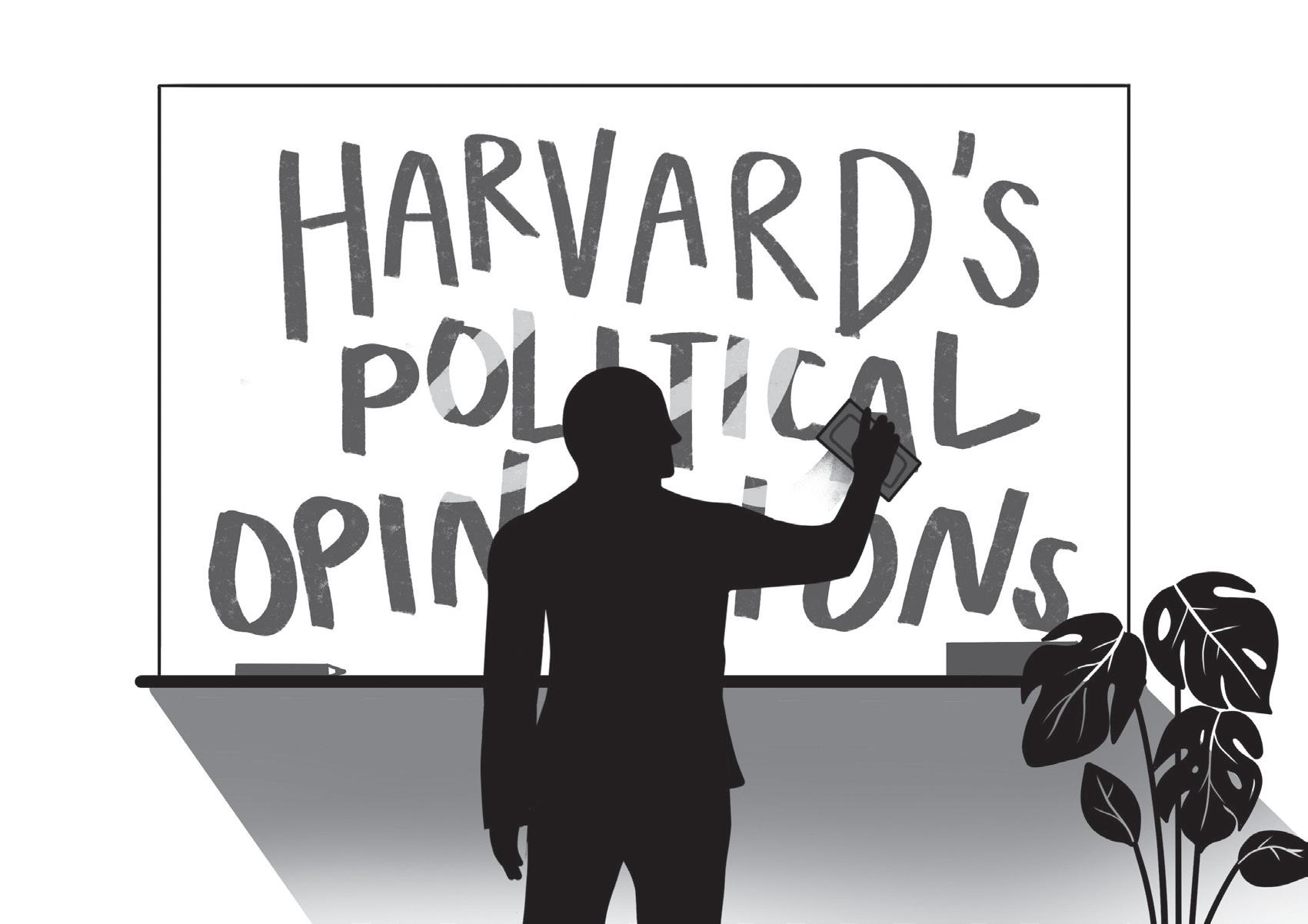
ed Ukraine — Harvard set a precedent that was turned against it again and again in the months following Oct. 7.
By removing the expectation to take just-so stances that placate campus groups with competing (often, irreconcilable) positions, the University can avoid sparking a similar conflagration in the future.
Notably, the University of Chicago, the most wellknown school to adopt a policy of institutional neutral-
ity, has fared far better than many peer institutions as protests over the war between Israel and Hamas have wracked college campuses. With trust in higher education low and falling, the stakes couldn’t be higher. Nothing less than Harvard’s ability to inform the world hangs in the balance. As the University looks to respond, there is perhaps no first step more obvious than a formal policy against the issu-
ance of public statements. Harvard isn’t a country.
When students face aggressive doxxing or harmful antisemitism, the University does have an obligation to offer students concrete support when social and political issues affect them personally — but that’s all. No more, no less.
The question of neutrality becomes murkier when one turns to corporate action — hiring, admissions, investments, and the like.
In such domains, the University cannot remain neutral. Harvard’s existing posture assumes value judgements just as much as would a new one. Whether the University invests in fossil fuels or not, it is inescapably still making an active choice to invest. Still, we acknowledge that there may be some kinds of corporate action where more neutrality would be advisable, for example, in the way the University regulates free speech. We look forward to reading the working group’s thoughts on such matters.
As we wrote when President Gay resigned, Harvard must learn the lessons of President Gay’s troubled tenure. Since Oct. 7, the University has been lambasted and discredited. Its students have been doxxed and harassed. Its leaders have been dragged before Congress and, now, subpoenaed. It’s time to close the Pandora’s box. Harvard is a university, not a think tank or an advocacy group — it’s high time it act more like one.
–This staff editorial solely represents the majority view of The Crimson Editorial Board. It is the product of discussions at regular Editorial Board meetings. In order to ensure the impartiality of our journalism, Crimson editors who choose to opine and vote at these meetings are not involved in the reporting of articles on similar topics.
Stop Apologizing for the Antisemitic Cartoon. It Isn’t Good Enough.
BY GENIA LUKIN
On Monday morning of what was supposed to be a restful long weekend, I woke up to a WhatsApp message with a screenshot of a cartoon posted on Instagram by the Harvard Undergraduate Palestine Solidarity Committee and African and African American Resistance Organization.
The message read “this looks antisemitic to me.”
It was. The cartoon is old news by now, and it evoked a torrent of condemnation from every corner. Later that day, down it went, and up came an apology from the PSC and AFRO: “Our mutual goals of liberation will always include the Jewish community — and we regret inadvertently including an image that played upon antisemitic tropes.”
Their apology came alongside another apology, this time from Harvard Faculty and Staff for Justice in Palestine, which had reposted the cartoon to their Instagram story: “It has come to our attention that a post featuring antiquated cartoons which used offensive antisemitic tropes was linked to our account.”
All of them just made me angrier. This time, the “apologies” are simply not enough.
How does one “inadvertently” stick a blatantly antisemitic cartoon into an infographic? What could make a person look at a hand etched with the Star of
COLUMN
David, containing a dollar sign and holding a noose, and say ‘yep, this is fine’? This image didn’t just flutter into your slides by itself. No, someone put it there with purpose and intent. And that someone won’t even come forward, or have their organizations publish an apology that doesn’t use the passive voice.
In his book “Jews Don’t Count,” David L. Baddiel writes about how antisemitism has transformed over time from overt to nearly invisible.
Throughout history, antisemitism was highly visible; it manifested in multitudes of ways, from the clothes and badges Jews were forced to wear, to restrictions on where they could live, to the jizya tax they had to pay. It was in the pogroms and the Talmud burnings. For centuries, antisemitism was loud and proud.
Modern antisemitism, however, is the antisemitism of inattention and silence. It’s the antisemitism of not giving a damn. It’s the antisemitism of a blatantly racist cartoon sneaking its way into a carefully-crafted Instagram post without culprits having put it there.
It’s the antisemitism of half-baked apologies.
These days, nobody can issue a direct apology, one that doesn’t insist on obfuscating language about symmetry and universal inclusion. The PSC and AFRO’s apology made sure to note that they share “fundamental values of justice and liberation,” as do we all (I hope).
But it wasn’t an Islamophobic, anti-Black, or anti-LGBTQ+ cartoon they posted — it was an antisemitic one. Why, for once, can they not just apologize to the Jewish community without ifs, ands, or buts?
Because, as Baddiel writes, what you hear most when it comes to modern antisemitism is the silence.
If nothing else, the cartoon has been enlightening. It illustrates the reason that antisemitism can tacitly flourish on campuses, notwithstanding their ostensible liberalism: Antisemitism assumes that Jews are simultaneously both inferior and powerful, controlling, and inherently oppressive.
If Jews really are all that, is showing a Jewish hand holding a noose really antisemitic? Or is it just speaking truth to power?
For those who believe them, consciously or not, dismantling the antisemitic myths of the powerful Jew, the malevolent Jew, or the Jew Who Cares About You Enough to Harm You, is difficult. Because if one does that, then one might have to contend with the fact that Israhell — the devil state — is, ultimately, just a state. That it is doing what any state in the world does: Trying to survive, and thrive, in a nasty set of circumstances, without having to prove anything to anyone.
So, instead, the myths remain intact, and people go on not caring. Because to care would mean that, suddenly, antisemitism becomes as important as all oth-
COUNCIL ON ACADEMIC FREEDOM AT HARVARD
Institutional Neutrality or Institutional Deception?
HARVARD CANNOT be politically neutral without implictly enforcing arbitrary standards that create an illusory vision. Neutrality will either be unenforcable or weaponized by bad actors. Harvard must be careful and measured outside of this ideal.
BY ANET E. HALLEY
Itwo instances: when the “very mission of the university and its values of free inquiry” come under threat, and when the institution “must act” as a corporate body, for instance when it owns property, receives funds, or bestows honors.
Thus, the goal of institutional neutrality is actually the achievement of political neutrality in the statements and decisions of top leadership. In reality, such neutrality can be vanishingly difficult to identify.
The Kalven principles can be swallowed by their exceptions. Under Kalven, both verbal statements and corporate activities should be kept free of political values and issues. But the University is making a statement about climate change when it fails to divest itself of stock in oil and gas enterprises. It needn’t go so far as to verbally refuse to
do so. The problem cannot be avoided by adding a provision requiring that any decision that the University makes on this issue must be financially advisable: That narrowing of investment strategy is itself politically contested.
Thus, on climate divestment, there seems to be no politically neutral position. In Kalven’s terms, the University “must act” as a corporate body, on an issue involving “social and political values,” no matter what it does.
The same is true of the U.S. Supreme Court’s rejection of Harvard’s use of racial classifications in its undergraduate admissions processes. It is true of the institution’s handling of charges of antisemitism and Islamophobia on campus; of the scope of its diversity, inclusion, and belonging programming; even of its bargaining with worker unions.
Harvard as a corporate body has to take positions on all of these issues. These decisions thus fall directly in the second Kalven exception. And yet all of them have politics: They all make statements on “social or political values.” Any statement, and any silence — any action, any inaction — can be deemed political.
I would also argue that all of Gay’s statements on controversies set in motion by the Hamas invasion of Israel on Oct. 7 were aimed at defending the University from increasingly intense threats to its very mission. This is true whether the mission was merely securing the safety of all members of our community or the more academic goal of furthering teaching and research on the Israel-Palestine conflict, a
difficult task given that an actual armed conflict is underway and members of our community have taken opposing stances on it.
An institutional neutrality principle for Harvard would give top leadership cover when they keep their lips sealed in the face of political forces demanding that Harvard take a stand on partisan issues. But complying with the Kalven presumption against taking a position could coincide with actions by which the institution does take a stand. Where the University both invokes a neutrality mandate and takes corporate action, the result will not be neutrality but non-transparency. Institutional neutrality could become institutional deception.
Finally, the Kalven Report provides that faculty, students, and administrators can “question” whether “the University is playing its proper role” through “existing channels.” Within Harvard, I have heard calls for a complaint procedure, albeit not one that could lead to sanctions. As anyone who has been involved in defending academic freedom on campuses in recent years knows, the investigation alone can be the punishment. In Harvard’s current politically polarized environment, complaints are sure to be raised about the most “neutral” statement touching even tangentially on a politically divisive issue. If institutional neutrality is rendered enforceable, even by investigation and moral disapprobation, we will be inviting political conflict into the very heart of the institution.
Institutional neutrality will be weaponized, and
er forms of racism. It would mean that Jews need to be protected; that Israelis — the prime manifestation of the powerful evil Jew — deserve to be protected.
To many, these thoughts are anathema. Scratch that — not even anathema, but entirely unthinkable.
But you, reader, must start thinking them. If you ever want to confront your antisemitism — the antisemitism you continue to assure us you reject — you must come face-to-face with the cartoon of the noose-holding, money-hungry Jew.
Theoretically, I’m supposed to end this piece on a constructive note. But I won’t do that. The onus of change, in this case, is not on me.
You, the non-Jewish majority, must understand that you have a problem that runs deep in your cultural consciousness, look that problem straight in the eyes, and strive to solve it. That’s what antiracism is all about.
Have fun, and in the meantime, don’t say sorry and then move on until something is, once again, bad enough to cause a ruckus. Do something now; change yourselves.
If you do change, I don’t need your tepid, passive-voice apology. And if you don’t change, I certainly don’t want it.
–Genia Lukin is a second-year Ph.D. student at the Graduate School of Arts and Sciences.

the good faith of those who invoke it will be unverifiable. Any of this would be entirely counterproductive, given the apparent goals of those calling for neutrality at Harvard.
There are other things we can do to harden the University to the present sense of siege. We can urge leadership to remember that they represent an ideologically diverse community that is, at times like Oct. 7 and its aftermath, in need of compassionate representation across a wide range of views. They are empowered to run the University, not the moral lives of all its human and institutional members: They need to learn modesty in messaging. We can revisit governance to make top leadership more accountable to faculty. We can reconsider financing strategies for the University that put it at the mercy of ideologically-driven outside donors. We can promote academic freedom and resilient listening in our community’s intellectual and political life. That last is the goal of the new Council for Academic Freedom at Harvard. I urge the Council — and Harvard more generally — to refrain from making institutional neutrality part of their mission: The goal is illusory and the means are dangerous.
–Janet E. Halley is the Eli Goldston Professor of Law at Harvard Law School. Her piece is part of the Council on Academic Freedom at Harvard’s column, which runs bi-weekly on Mondays and pairs faculty members to write contrasting perspectives on a single theme.
NATALIE Y. ZHANG— CRIMSON DESIGNER
OP-ED
n the aftermath of former University President Claudine Gay’s resignation, demands for institutional neutrality have sharpened at Harvard. We should not allow the present sense of crisis to foster hasty policymaking on an issue of this importance. The Kalven Report, promulgated in 1967 by the University of Chicago, is the flagship institutional neutrality document and has been invoked in recent days as an example for Harvard to follow. It sets a presumption that the University will not express “opinions on the political and social issues of the day” or modify “its corporate activities to foster social or political values.” The Kalven Principles also state, however, that the presumption of neutrality can be overcome in
COLUMN A SCHOOL OUTSIDE BOSTON
We’re Really Sorry About That Antisemitic Cartoon, Guys
“THAT” CARTOON wasn’t that deep, guys, chill out. If you think about it, we can justify our actions in many ways, so that you won’t get mad at us. The idea that there could be nuanced morality to our activism is franky ludicrous.
BY YONA T. SPERLING-MILNER
It has come to our attention that an image appeared on our organization’s Instagram account that made certain people uncomfortable. Now that we might face consequences, we want to take this opportunity to express how bad we feel.
Let’s make one thing abundantly clear: It wasn’t our fault. It was a series of unfortunate accidents. Have you ever had a little cousin take your phone and ask your professor out by accident? That’s exactly what happened to us, only instead of someone’s cousin, it was an overenthusiastic freshman hacker who somehow guessed the password to our Canva account and copy-pasted an antisemitic cartoon into our infographic draft. And then a rock — a small one — fell from the sky and hit “publish.” Again, not our fault.
It is also not our fault that the proofreaders got LASIK surgery right before proofreading and therefore mistook the Star of David for the Hardee’s logo. Furthermore, we were under the (understandable!) impression that the “David” referred to David I. Laibson ’88, or maybe David F. Attenborough, neither of whom are Jewish (except for David I. Laibson ’88).
If you think about it really, really, really hard, it actu-
OP-ED
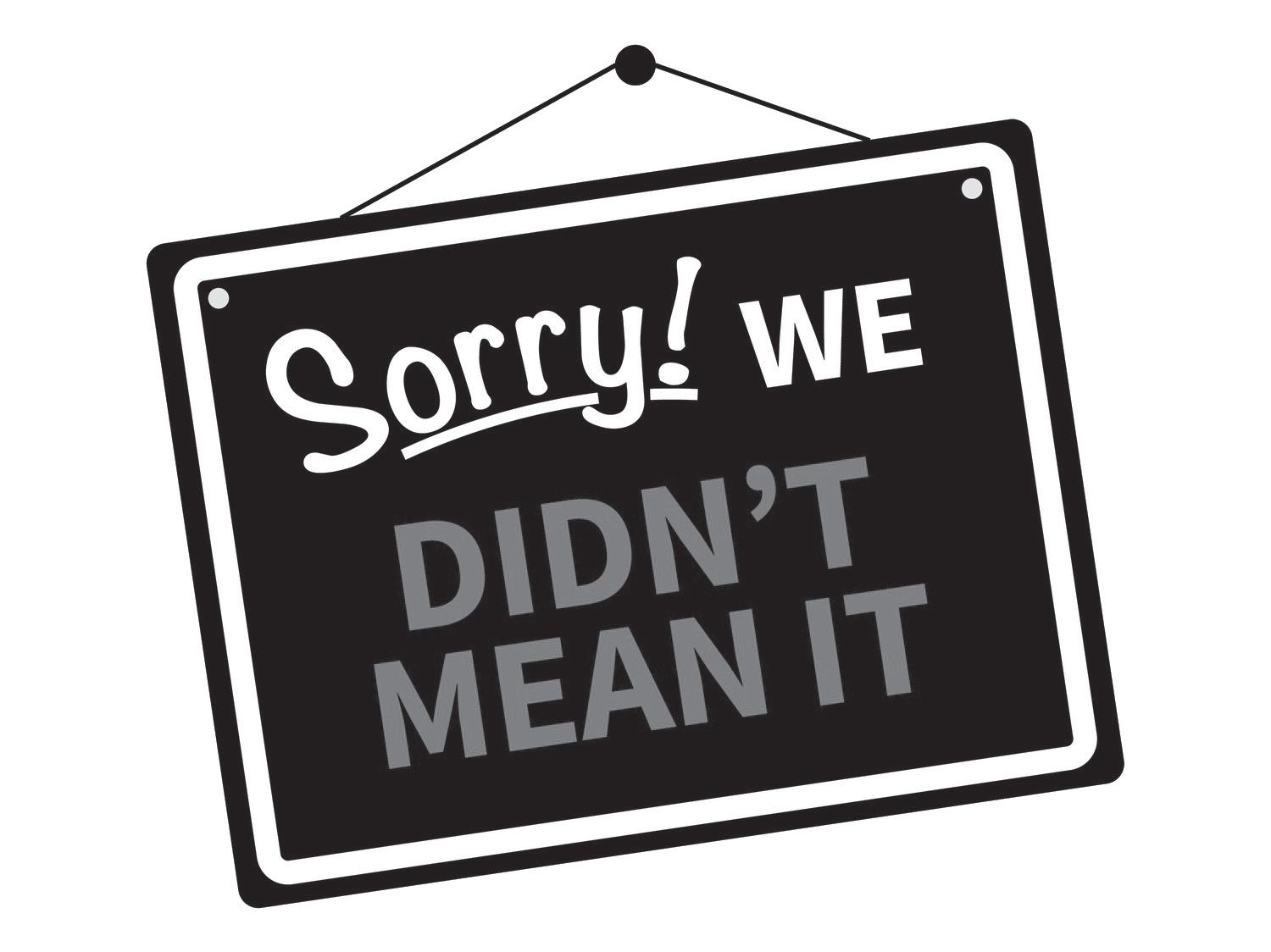
We’re just kids, practically infants; how could you expect us to take responsibility for our actions? It’s not like any of our Instagram posts have ever attracted public scrutiFrankly, in our opinion, it’s ludicrous to believe that a group so dedicated to equality and inclusivity would purposely post anything remotely insensitive. Of all the clubs on campus, you have to admit that we are the most unlikely If this were the Dungeons & Dragons Club, I mean, they’re weirdos. They would probably do something like this on purpose. But with

us, it’s so out of the blue that it was obviously a slip of the tongue. Slip of the rock, actually. And not a Freudian slip either. Although Freud was an anti-Zionist, fun fact.
At the end of the day, even if we did post the cartoon intentionally (and we absolutely didn’t, pinky swear), it reflects absolutely nothing about our organization. Do not, under any circumstances, allow the post to influence your perception of our coalition, my friends and me, or the anti-Zionist movement writ large.
“Pro-Palestinian activism” and “antisemitism” in the same sentence? Uh, doubt it! That’s why we took down the post the moment we all simultaneously, prophetically, spontaneously divined that the image was an affront to our core values. It was a pretty easy jump from there to: “Okay, we’ll just replace the cartoon with a picture of a guy who said the greatest white man was Adolf Hitler and the only good Zionist was a dead one.”
In conclusion, please stop yelling at us.
–Yona T. Sperling-Milner ’27, a Crimson Editorial editor, lives in Hurlbut Hall. Some of her closest friends are Jewish. Her column “A School Outside Boston” runs bi-weekly on Tuesdays.
Larry Summers’ Undisclosed Corporate Ties Threaten Harvard’s Credibility
BY JEFF M. A. HAUSER
Americans of all political persuasions hate the revolving door between government and corporate America. And with good reason: Conflicts of interest threaten to privatize governance, undermining confidence that government is by and for the broader public. But revolving door issues aren’t limited to the government. They can plague universities too, with much the same corrosive effects.
Thanks to current University Professor and former University President Lawrence H. Summers, they exist right here at Harvard. Summers is not a stranger to the government’s revolving door, having moved from high-ranking positions in the Clinton administration to Wall Street and then to the Obama White House. However, since leaving the Obama Administration, Summers has truly made a name for himself in corporate America, all while he remained in his primary role as a Harvard professor. As the founder and executive director of the Revolving Door Project, a public interest watchdog group, I have followed Summers’ conflicts of interest — and his continued failure to adequately disclose them — for years.
Summers’ Kennedy School CV is incomplete, leaving out many of his extensive corporate ties, which include positions with cryptocurrency firms, fintech firms, banks, real estate companies, a pharmaceutical
COLUMN
retailer, and, as of recently, OpenAI.
This unparalleled body of corporate work alone should concern administrators. Such a large number of business relationships inevitably risks conflicts of interests, and Summers’ lack of full disclosure, coupled with his frequent media appearances, worsens the issue.
It is Summers’ role as a frequent pundit that makes these conflicts of interests imperil the wellbeing of the University.
There are few, if any, Harvard professors who can rival Summers’ ubiquitous presence in the media. In many of his appearances, the esteemed Charles W. Eliot University Professor’s Harvard pedigree features prominently, trumpeted by hosts as evidence of his experience and expertise.
While these analyst appearances may benefit Summers, who is quite open about his desire to shape policy, his frequently undisclosed conflicts with the businesses he’s discussing present a real risk to both Harvard’s credibility — its commitment to Veritas — and the interests of the general public.
Last year, amid Silicon Valley Bank’s collapse — the second largest bank failure in U.S. history — Summers appeared across media outlets and liberally posted on X to discuss what was happening to SVB.
What viewers didn’t know? Summers had serious conflicts of interest with SVB.
Two firms with significant early investments in Circle Internet Financial, SVB’s single largest depositor, have had close ties to Summers. Digital Currency Group, a firm specializing in cryptocurrency in-
vestment, employed Summers as a board advisor well into 2022, while Atlas Merchant Capital, an investment fund, still employs him as a senior advisor. Even as Summers loudly advocated for the government to guarantee funds deposited at Silicon Valley Bank — posting on X that “failure to act strongly enough would be a Lehman-like error” and that “this is not the time for moral hazard lectures” — he neglected to mention his history with some of SVB’s largest customers.
What’s more, these firms had much to lose. Circle, amazingly, had over $3.3 billion in deposits at the bank, of which it potentially stood to lose all but $250,000 if Summers’ backstop idea wasn’t implemented. After Summers’ full-throated media campaign, depositors were eventually covered, averting a crippling blow to Circle and protecting DCG’s and Atlas’ investments.
These connections are concerning, to say the least.
Regardless of whether Summers’ opinion on the course of action federal regulators should take was the right one, this was a violation of Harvard’s policies on disclosing conflicts of interest when speaking with the media and, worse, a violation of public trust.
While the SVB case was particularly egregious, Summers’ diverse corporate ties, frequent media appearances and wide online following make conflicts of interest inevitable. This inevitability makes disclosure — not just to Harvard internally, but to the public — all the more important.
He has consistently failed to do so.
When the Revolving Door Project published a letter in July 2022 calling on Summers to disclose publicly any sources of corporate funding he had received, Sum-
COUNCIL ON ACADEMIC FREEDOM AT HARVARD
Take It From a Former Activist: Universities Need to be Neutral
POLITICAL NEUTRALITY. Harvard should follow UChicago’s 1967 Kalven Report, promoting institutional neutrality but laying out select exceptions. Also, ideological conformity underlies many counterarguments and must be recognized as such.
BY BERTHA K. MADRAS
n
IFour
The catalyst for my activism was the tragic event in March 1960 in Sharpeville, South Africa, where oppressive anti-Black “pass laws” sparked a riot that resulted in the deaths of over 60 people at the hands of local authorities.
Powerless in the face of brutality but driven by a sense of righteousness, I organized a rally to express solidarity with the oppressed. To spread the word of the rally, I hung hand-written posters around the campus and created a boxed announcement in the McGill Daily newspaper, for which I was a student staff member.
Overnight, the posters were torn down, shredded, and discarded in garbage cans, the announcement in the McGill Daily mysteriously vanished, and the megaphone I’d reserved somehow became unavailable. Undeterred, I addressed a handful of students on the steps of Redpath Hall.
Later on I was told that university administration suppressed the ad, sending a clear signal that attempts to challenge the status quo in South Africa would not be tolerated. The fear instilled in me that day remains with me.
Seven years later, amid the turbulence of the 1960s — a decade marked by egregious political assassinations, social upheaval and the Vietnam War — the University of Chicago released the Kalven report, which called for
university administrations to maintain neutrality in the face of political and social activism to nurture an environment conducive to open inquiry by faculty and students.
According to the report, while the university should serve as a platform for individual expression and dissent, it must remain impartial, refrain from taking collective action or endorsing specific political or social agendas, and welcome diverse viewpoints within its community.
The underlying theme is that the university enables individuals to seek the truth in a refuge, without the guardian eye of leadership or administrators controlling, influencing, or proclaiming orthodoxy.
The report endorsed university action in two extraordinary instances: to defend against threats to its mission and of free inquiry, and to engage in corporate action that must comport with paramount social, political or moral values (for example, by ensuring non-discrimination in the workplace).
What are the costs of institutional orthodoxy? Few institutions have embraced the principles outlined in the Kalven report, seemingly for having failed to rigorously scrutinize the repercussions of adhering to social and political orthodoxy.
Harvard University leadership has engaged in political discourse, for example, by congratulating a Democratic president on his election or commenting on the election of a Republican president as “the most divisive and contentious election any of us have ever known” and “what for many is a challenging and uncertain time.”
Not surprisingly and in contrast to the even split among the nation’s voters, more than 75 percent of
the Faculty of Arts and Sciences self-report that they are liberal or very liberal. Worse, only a quarter of faculty were in support of increasing ideological diversity among faculty by hiring more conservative-leaning professors.
A University faculty that is homogeneously liberal fails to fully grasp how this non-neutral posture can suppress speech.
Excessively harsh responses to faculty with exemplary scholarship (e.g., Carole K. Hooven and professor Roland G. Fryer Jr.) who ran afoul of current social norms further display Harvard’s departure from neutrality.
Meanwhile, who dares to protest those who seek to erase history by removing portraits of giant thinkers in a scholarly field because they are white males or hold views we now view as unacceptable?
At the heart of reluctance to embrace institutional neutrality is the belief that there is a “right side of history,” a “true north” on the moral, social, or political compass. When administrators or faculty collectively take a stand or vocalize their beliefs to represent the entire university, these beliefs permeate every aspect of the academic realm.
This belief misses, however, that societal norms are dynamic and susceptible to transformation. The norms prevalent today may be obsolete and discarded tomorrow. Slavery was once commonplace, globally; now, it has been abolished in all Western societies.
Ideological conformity hinders the advance of knowledge, disables the academy to defend its premises, and undermines the university’s credibility as a repository of scholarship, evidence, and truth. It is an easy matter to recommend that university
mers, while not publicly disclosing, told The Crimson that his “personal policy is to go beyond Harvard’s requirements by not engaging in paid public advocacy or advocacy to public officials on behalf [of] any commercial entity.” Without public disclosure, this claim is not verifiable.
Since then, the need for transparency has only become more evident. The SVB example could easily be taken as advocating via the media to government officials on behalf of the interests of a commercial entity in which Summers had substantial corporate ties.
At a time when Harvard is undergoing a crisis of credibility, with confidence in higher education seriously diminished among the American public, the University and its scholars must be more committed than ever to fastidious transparency in their relationships with corporate and governmental interests. With his extremely public role, Summers’s punditry and nondisclosures not only imperil good governance — they also damage Harvard’s reputation for commitment to the truth.
These last few months, Summers has staunchly and widely criticized Harvard’s leadership for failing to meet incredibly high standards. It’s time for him to hold himself to those standards too. Until then, his criticisms of the University — and his commitment to the public — ring hollow.
–Jeff M.A. Hauser ’95 is the executive director of the Revolving Door Project, a government ethics watchdog group.

administrators adopt the Kalven report’s recommendations to refrain from publicly stating support of specific social and political positions.
Neutrality on issues such as the Supreme Court ruling on Harvard’s admission policies present an added layer of complexity. The decision runs counter to current perceived benefits of racial and ethnic diversity. The Kalven report exceptions may apply in this case.
Equally daunting for administrative neutrality has been the events and aftermath of Oct. 7. When civil discourse rife with slogans crosses the boundaries into bullying, harassment, rage, calls for genocide, or classroom chaos, university neutrality can arguably be breached to safeguard the University’s mission and the well-being of its community.
By upholding the principles outlined in the Kalven report and remaining neutral in matters of political and social contention, universities can serve as beacons of intellectual discourse and champions of diversity of thought. Yet, the Kalven report also acknowledges circumstances where neutrality must be set aside to uphold the fundamental principles of a university.
Embracing the Kalven report can effectively sever the administration’s subtle yet influential grip on campus discourse and perspectives, while also affirming its authority to take decisive action when the University’s core principles or survival are challenged.
–Bertha K. Madras is a Professor of Psychobiology at Harvard Medical School. Her piece is part of the Council on Academic Freedom at Harvard’s column, which runs bi-weekly on Mondays and pairs faculty members to write contrasting perspectives on a single theme.
THE HARVARD CRIMSON
10 MARCH 1, 2024
EDITORIAL
McGill
ty,
influence
university
sities
Harvard
adopt
posture of institutional neutrality.
1960, during my freshman year at
Universi-
I experienced firsthand the
wielded by
administrators. It taught me why univer-
—
included — need to
a
activism
campus.
years prior to Mario Savio’s Berkeley Free Speech movement, I engaged in
— and faced suppression — for protest on my
EMILY N. DIAL — CRIMSON DESIGNER

Inside Harvard’s Vacant Properties
to try to get that building to be used,” she said. In early 2023, the BPDA approved Berkeley’s plans to redevelop the Lincoln St. property, replacing it with nearly 800,000 square feet across three buildings.
“We are grateful to have Harvard as one of our landlords and value the strong relationship we’ve built since the restructuring,” Stohr said.
City Council Unlikely to Prohibit Discussions on Foreign Policy
BY AYUMI NAGATOMI CRIMSON STAFF WRITER
A Cambridge City Council committee largely opposed a proposal to limit the body from considering foreign policy issues at a Monday committee meeting, following months of pressure from local activists to call for a ceasefire in Gaza.
The Council passed a ceasefire resolution late last month, after failing to do so in November. But during the debate over the resolution, some Councilors questioned whether the Council should take a formal stance on foreign policy matters at all.
Still, members of the Council’s Government Operations, Rules and Claims Committee seemed to mostly reject the idea, an informal proposal brought forward by Councilor Paul F. Toner, the committee chair.
During the meeting, Vice Mayor Marc C. McGovern said that though the ceasefire debate took up “a lot of time and a lot of attention,” most foreign policy resolutions tend to be less contentious.
I was campaigning for City Council on my opinions on foreign policy — it was about bike lanes, municipal services, taxes,” Toner said. “I just don’t think the City Council should be participating in these discussions.”
“Going forward, I just think people need to respect peoples’ decision to vote present on these issues,”
Toner added.
Some councilors, including Mayor E. Denise Simmons, suggested that, rather than discussing foreign policy issues during Council meetings, councilors could take a stance by signing open letters.
But the city’s Law Department suggested that councilors co-signing an open letter could still constitute a violation of the Open Meeting Law, which prohibits five or more councilors from gathering or deliberating on issues under their jurisdiction outside of a public posted meeting.
Deputy City Solicitor Megan Bayer told the Council that open letters would still be a “gray area” considering the Council’s precedent of discussing foreign policy matters in the past.
During the meeting, the committee also voted to advance a proposed change to public comment rules. Under the new proposed rule — which will come to a vote in the full Council — the first 50 registrants for public comment will be allocated two minutes to speak, and the remaining registrants will be allotted one minute each.
Cambridge City Council meetings take place at 5:30 p.m. on Monday. The first part of the meeting is devoted to public comments, which have been known to stretch for hours when the Council considers particularly contentious issues. Simmons said that Council should consider taking a recess and reconvening meetings on an alternative date when there is a high volume of public comments, noting that councilors are often forced to take consequential votes late at night.
“We are not at our best at 11 o’clock to make policy decisions,” Simmons said.
ayumi.nagatomi@thecrimson.com
BY JACK R. TRAPANICK CRIMSON STAFF WRITER
SHarvard
Harvard Allston Task Force Chair Cindy Marchando said that 176 Lincoln has “been an eyesore forever.”
“We’ve tried all different options
Two of the new buildings — approximately 551,500 square feet — will be primarily commercial, holding offices and research space. The third building will be residential, creating 252 new apartment units including ten affordable live-andwork units for artists and affordable retail space for artists.
As it stands, construction could be “another year or two away from getting started,” according to JoAnn Barbour, the executive director of a local housing nonprofit.
“We want them to be a good neighbor,” she said. “And a good neighbor is going to fill those vacancies and take care of them.”
‘We Would Have Loved to Stay’
Several of Harvard’s vacant properties are concentrated in Barry’s Corner, an area of Allston centered on the intersection of Western Avenue and North Harvard Street,. A string of them line the intersection, across the street from the Trader Joe’s and Starbucks and just past the Science and Engineering Complex — 9 Travis St., 182 Western Ave., and 204 N. Harvard St.
Like the other properties on Western Ave. and Lincoln St., the three buildings are slated to be demolished and rebuilt as a major retail and residential development at 180 Western Avenue. But three and a half years in, the project remains in public engagement under the city’s required large project review process. Currently, all three properties sit empty, despite lying along one of Allston’s main commercial corridors.
In 2017, each was occupied by a business: a commissary kitchen for Flour Bakery + Cafe; Stone Hearth Pizza Co.; and a 7-Eleven. 7-Eleven left in 2019, while Harvard asked Flour and pop-up restaurant Jamaica Mi Hungry — where the pizza shop was formerly located — to leave in 2018 and 2022, respectively.
In an interview, Joanne B. Chang ’91, the owner of Flour, said she was disappointed to leave when Harvard asked her business to go in 2018, although she understood “it was never going to be a long-term situation.”
Still, Chang said she was “befuddled” every time she drove through the area and noticed the building was still empty. “We would have loved to stay,” she said.
Marchando criticized Harvard’s decision to ask Jamaica Mi Hungry — the former occupant of 182 Western Ave. — to leave last year when the owner fell behind on rent.
Barbour also said she regretted the loss of the pop-up restaurant. “The fact that they could still be there providing great food for the neighborhood — it’s sad, because they were a great business,” she said.
When Swissbäkers, the bakery next door, ran into financial trouble in 2019 and faced closure, Marchando said, Harvard was more generous. Nicolas Stohr, the owner of Swissbakers, said that Harvard offered grace until they could get back on their feet, allowing the business to remain open in the meantime.
But Ernie R. Campbell, the owner of Jamaica Mi Crazy — the restaurant which operated under a yearto-year lease — said Harvard asked him to leave in 2022 when his lease was set to expire.
Campbell said he liked being there, even if foot traffic was mixed and the space wasn’t easy to work with. “It’s a nice location, I really miss it.” he said. “It’s just that I couldn’t hold on.”
‘Vibrant For Many Years to Come’
In an emailed statement, Harvard spokesperson Amy Kamosa said that the University’s approach toward commercial properties was geared toward building a dynamic and thriving Allston.
“Harvard Real Estate’s intentional leasing approach focuses on placemaking and attracting a variety of retail tenants that will contribute to the vibrancy and diversity of the neighborhood,” Kamosa wrote.
She added that Harvard is “taking a multi-tiered approach to ensuring the neighborhood remains vibrant for many years to come through major investments to create and modernize retail properties that will attract long-term retail tenants.”
To win approval for its developments, Harvard has also provided substantial community benefits to Allston, including an annual grant with hundreds of thousands in funding to local nonprofits, donating property for affordable housing, and financial support for open space and public art.
But as residents wait for the University’s development projects to get off the ground, many of the buildings remain unoccupied, lying in wait to be demolished and replaced by newer, shinier developments.
Alex L. Cornacchini, the executive director of Allston Village Main Streets, a nonprofit that supports businesses and local development, said larger landowners generally face less pressure to fill vacancies in their properties.
“When a property owner is wealthy enough,” he said, “they’re not like, ‘We need to make X amount of money off of this vacancy.’”
Instead, Cornacchini said, they can “just leave it vacant and wait for the right tenant.”
Locally, that means some eager potential tenants have been turned down by Harvard, according to Cornacchini, who said he had heard from businesses seeking to locate in the area that they faced trouble securing a lease on Harvard’s commercial properties.
“I’ve seen businesses be like, ‘I looked at this space and it looks really nice, but I can’t afford 30 bucks a square foot and the property owner isn’t willing to come down,’” he said.
In Barry’s Corner — and across Lower Allston — residents wait for Harvard to deliver on their promise to build an area full of life. But in the interim, according to local activist Harry E. Mattison, the space feels mostly transitory.
“It’s a place to pass through, not really a place that anyone uses as a destination,” Mattison said.
“I think it’s appropriate for us to lobby or express our point of view to our elected officials in Washington,” McGovern added. Referencing the 2024 presidential election, Councilor Jivan Sobrinho-Wheeler said that foreign policy discussions may look very different under a hypothetical Donald Trump presidency.
“We could have a very different federal government, and then at times, we want to weigh in on policy issues,” Sobrinho-Wheeler said.
But Toner said he found it “offensive” that local activists criticized councilors — including himself — for voting “present” on the ceasefire resolution when it was originally considered in November, adding that the Council ought to focus on issues that matter most to residents.
“I didn’t get one question when
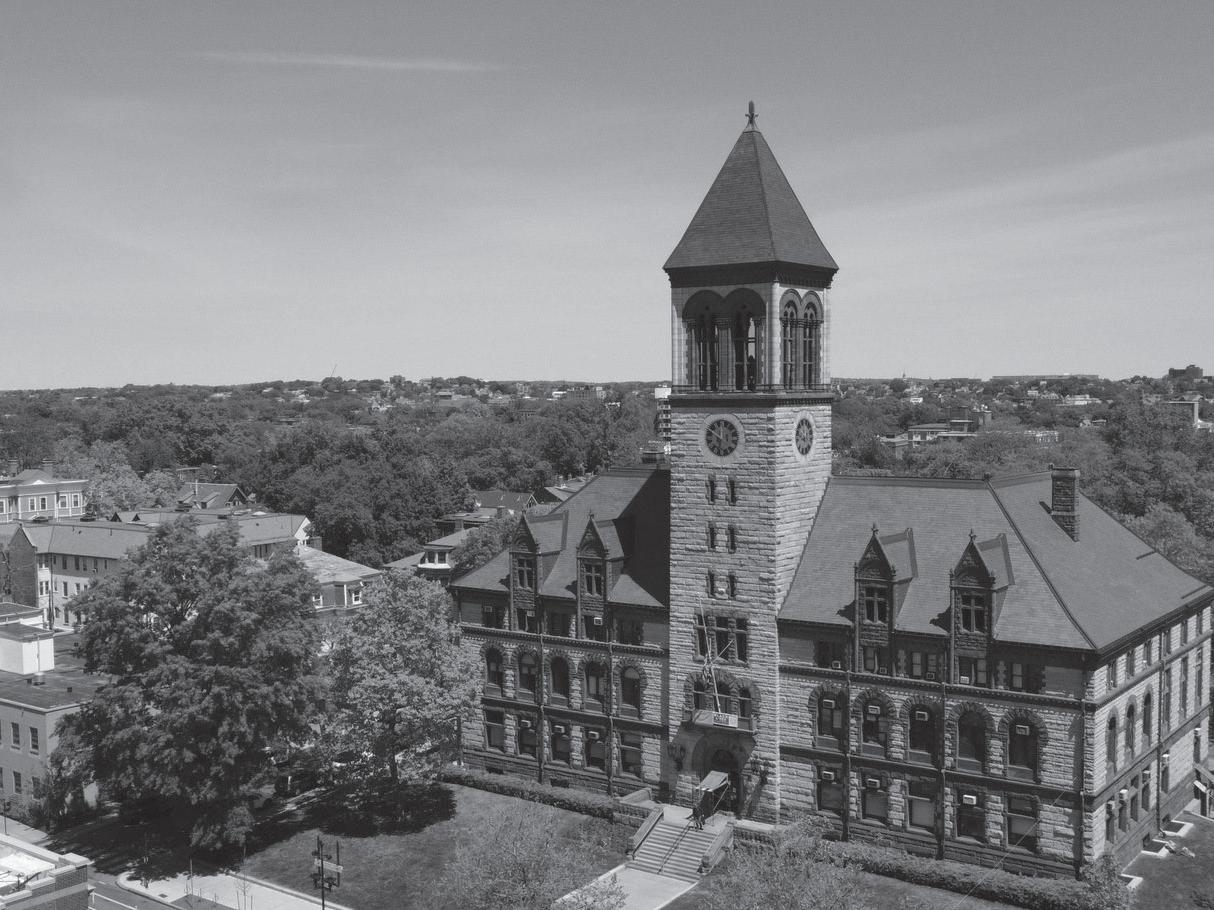
A

METRO 11 MARCH 1, 2024 THE HARVARD CRIMSON
ince 1989, Harvard has acquired hundreds of millions of dollars worth of land in Allston, often in large, high-profile deals that would facilitate some of the neighborhood’s biggest developments. But quietly, the University was also padding its portfolio with nearly 40 commercial properties scattered across Lower Allston and Brighton, which house a variety of neighborhood businesses from auto shops to cafes, one-story offices to restaurants, a towing service, and a garden center. Now, according to an analysis by The Crimson, nearly a quarter of those properties lie empty. Many of the empty commercial properties are slated for redevelopment, to be turned into offices and laboratories, residential buildings, or retail space. Others will be converted for institutional use — like a warehouse on 92 Seattle St., set to become a space for athletics and Art, Film, and Visual Studies department programs. In interviews, however, business owners, residents, local development advocates, and workers spoke about the loss of the businesses which used to occupy many of the empty properties, and complained of others as a blight on the neighborhood while they lie waiting for development to move forward. As Harvard slowly moves to fill those properties with new housing and retail, residents and the businesses they used to sustain are left looking into empty windows in the interim.
Eyesore Forever’ In two cases, buildings worth several millions of dollars have remained vacant for many years — eight in one case, and decades in another. 287 Western Avenue, the $3 million site of the former Joseph M. Smith Community Health Center, has sat empty since 2015, awaiting its turn to become part of a large new development. The project will demolish the current buildings on site and create a new building boasting 90,000 square feet of office and research space and a public courtyard. Harvard didn’t file a letter of intent for the project
step
city-mandated development review process — until 2023, eight years after the community center left.
next to the Boston Landing commuter rail station, 176 Lincoln St. — a $30.7 million, 5.2 acre property — has gone unoccupied for decades.
‘An
— the first
of the
Just
although
ments
redevelop
property —
scription,
vacant
cut off neighborhood connections
over 30 years.”
purchased it in 2006,
it wasn’t until 2019 that they hired Berkeley Invest-
to
the
which, per the developer’s de-
had “sat
and
for
ALLSTON
EMPTY. Nearly a quarter of Harvard’s commercial properties in Allston and Brighton remain empty. 204-205 N. Harvard St. is among many vacant Harvard-owned properties in Allston that currently sit vacant. JACK R. TRAPANICK — CRIMSON PHOTOGRAPHER
Council committee largely opposed a proposal to limit the body from considering foreign policy issues. MARINA QU — CRIMSON PHOTOGRAPHER
jack.trapanick@thecrimson.com
Residents Protest Concert by Israeli Artist
Staff at The Sinclair, a Cambridge concert venue, boycotted a concert in support of Israel by Israeli artist Ishay Ribo and protested outside the venue Tuesday night, joined by dozens of Boston and Cambridge residents and several Harvard affiliates.
More than thirty Sinclair staff members — including managers, bartenders, security, and box office staffers — protested and chanted for five hours outside the concert, which was organized by Harvard Chabad to raise money for Israel.
The pro-Palestine protest drew pro-Israel counterprotestors, who held Israeli flags and posters of hostages. Around 8:30 p.m. — the start time for Ribo’s second show — the two groups stood on opposite sides of Church Street, holding signs and shouting at one another.
The workers at the Sinclair unanimously opposed the concert but saw their complaints ignored by the Bowery Presents — the company that books shows at the venue — according to Sinclair security guard Max D. Morton.
“None of us had wanted this to happen,” Morton said. “It’s just a bummer that it didn’t matter to them.”
“Now the gem that The Sinclair is has to be stained with something like this, and it fucking sucks because it wasn’t in any of our hands,” he added.
Due to the boycott, outside workers were hired to staff the event, according to several attendees at both protests. The Bowery Presents did not immediately respond to requests for comment.
Chabad Rabbi Hirschy Zarchi said that he heard about
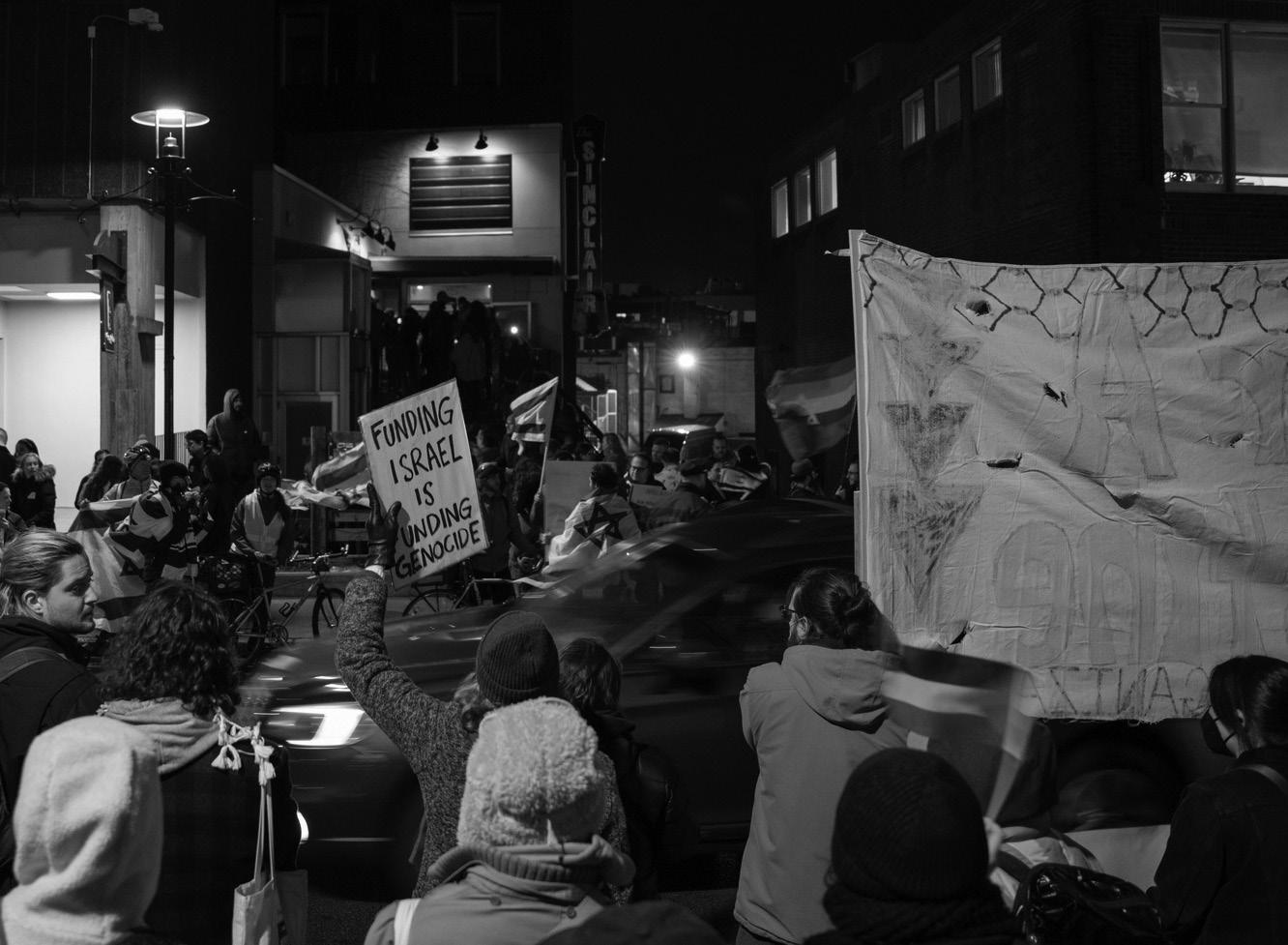
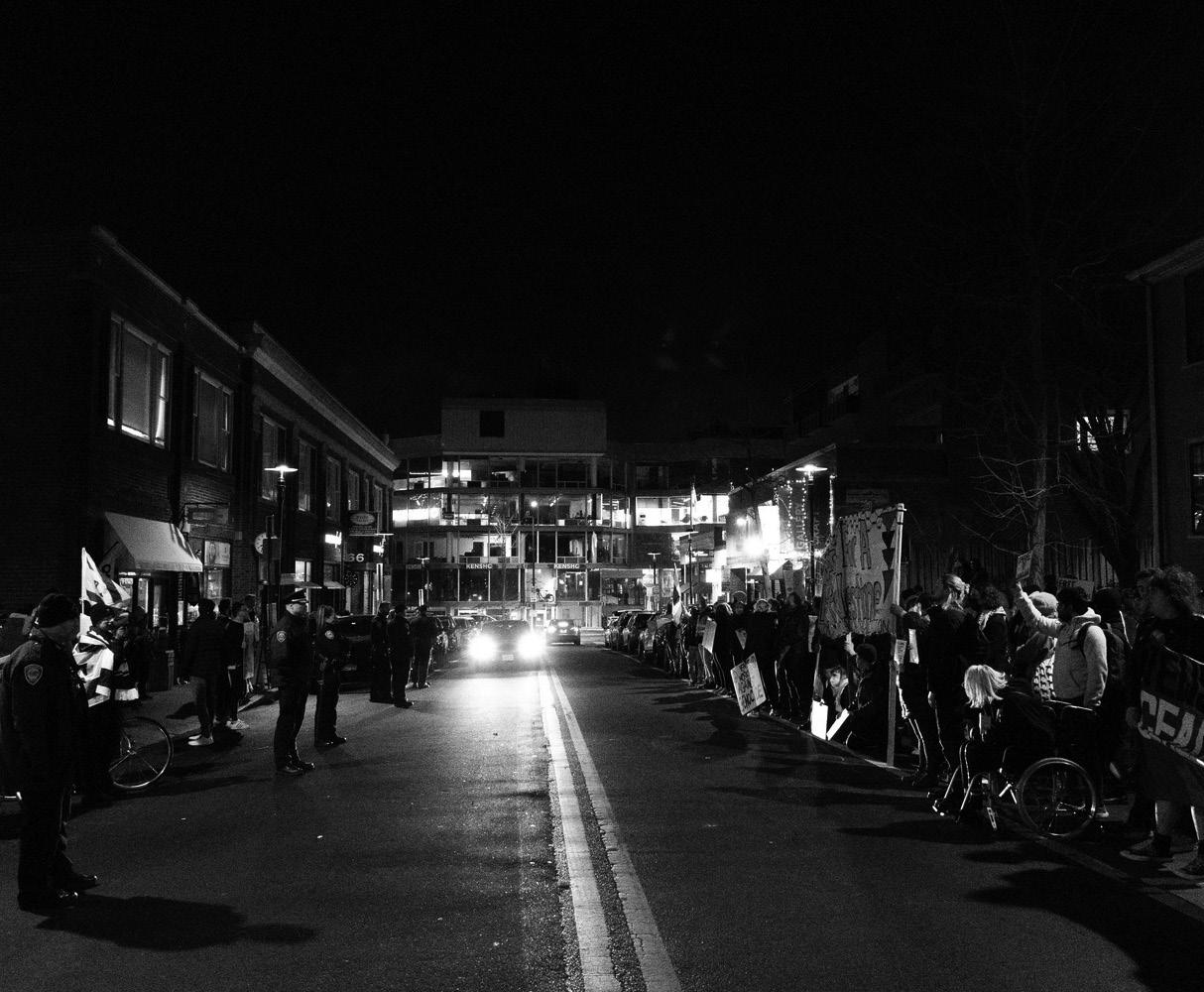
Lesley Faculty Pass Third No Confidence Vote On President
Lesley
“Faculty
attendance at the vote.
Halper is one of 24 faculty members who were laid off in October 2023 as part of a restructuring initiative to reduce expenses. Despite the termination, Halper was asked to teach through the spring. While 30 core faculty members were originally identified for layoff, five faculty will remain at the university in other positions and one faculty member will have a revised contract.
Lesley University acknowledged the no confidence vote in a statement Wednesday afternoon.
“We are saddened that our institution-wide efforts to create the very best experience for our Lesley University students and community while keeping it financially viable for future generations has, for a third time, come under attack by some members of our faculty,” the university wrote in a statement.
“Since announcing those changes, many Lesley facul-
ty members, leaders, and staff have been enthusiastically working hard on the plan, with many promising results,” the university added. “We urge all faculty members to help the university move forward, so it does not suffer the fate of a growing number of small colleges and universities nationwide.”
The layoffs affected around 15 percent of Lesley’s total core faculty and were accompanied by the announcement that the university would be cutting four academic programs: political science, sociology, global studies, and a graduate program in photography.
Lesley University has faced a more than 50 percent decline in student enrollment over the past 10 years. In April 2023, the Boston Globe reported that the university was facing a $10 million budget deficit due to declining enrollment and use of student housing.
“
The faculty’s first no-confidence vote against Steinmayer came in December 2021, only two years after she took office.
The faculty assembly’s release in the aftermath of the vote attributed it to “systemic issues” that “the president failed to address,” including mismanage -
ment of student housing, finances, and general operations, as well as “the erosion of shared governance.”
In February 2023, the faculty issued a second vote of no-confidence against Steinmayer and issued their first vote of no-confidence against Lesley’s Board of Trustees. The assembly’s release stated that “decisions made by the university’s leadership have eroded the student experience and endangered the long-term viability of some academic programs.”
Before the Tuesday vote, faculty gave a presentation about the “misalignment of Lesley University’s resources and mission under Janet Steinmayer’s presidency” that included publicly available tax documents and financial statements from the university under Steinmayer’s tenure.
The presentation claimed that the share of the university’s budget spent on management increased by $6.2 million — a 36 percent rise from the 2019 fiscal year to the 2023 fiscal year — while spending on instruction, academic support, student support services, and fundraising all decreased.
The slides also show that Steinmayer’s salary has more than doubled during her tenure — from around $250,000 in the 2020 fiscal year to around $530,000 in the 2022 fiscal year — while the university’s operating revenue declined by 23 percent.
The faculty assembly has not publicly released a statement confirming Tuesday’s no-confidence vote. Faculty assembly chair Michelle Pate did not immediately respond to a request for comment on Tuesday.
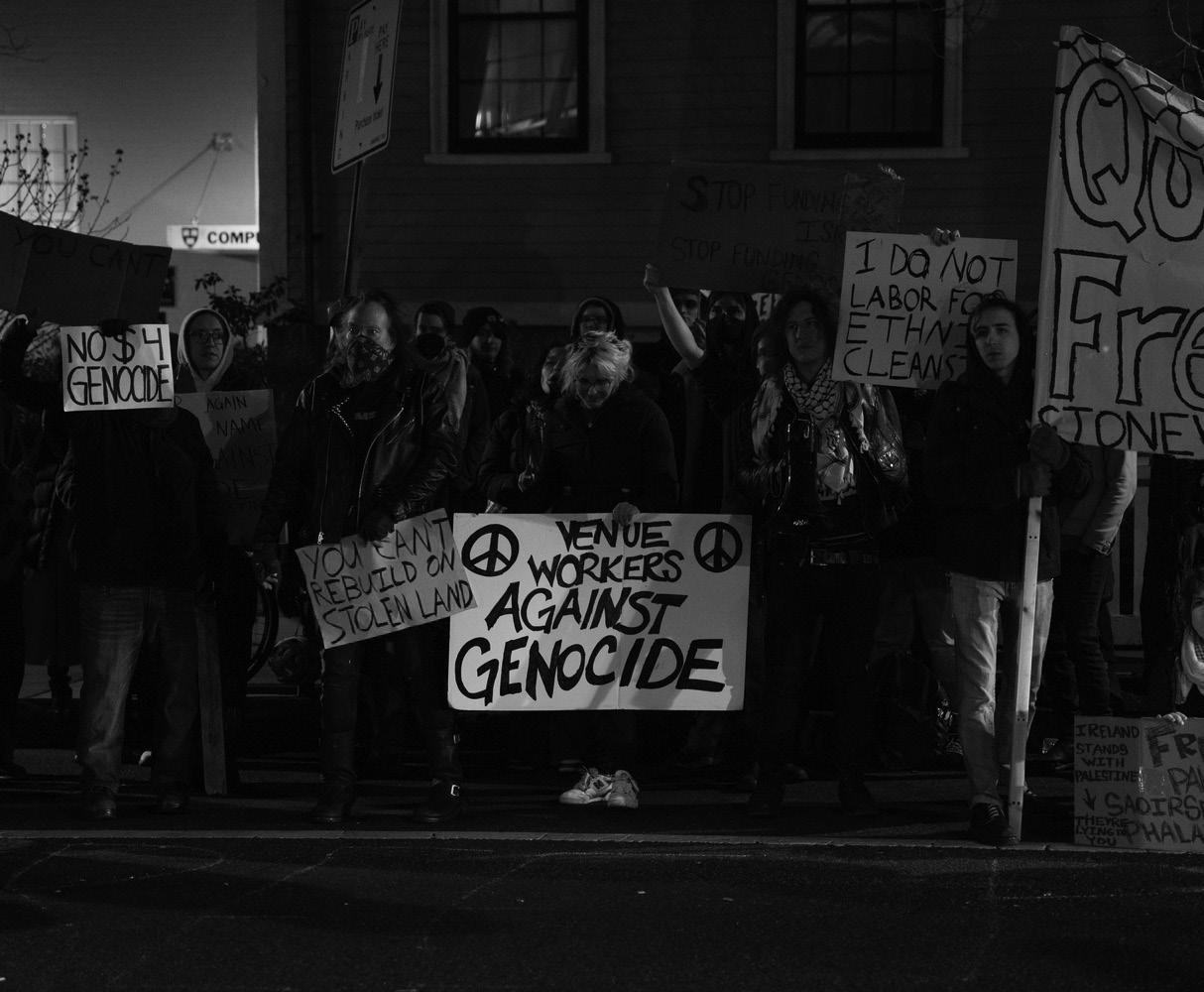
a week ago that staff members would be boycotting the event. He said he could not hear the protest going on outside during the show.
“We didn’t make much of this protest, thank god, we figured out creative ways” to hold the event, Zarchi said. “We’re very grateful, by the way, to The Sinclair management and ownership for working with us to seek solutions, alternative solutions, to allow the event to go on.”
Joshua T. Weinreb, a medical resident at Brigham and Women’s Hospital and a member of Harvard Chabad, said his wife was contacted earlier that day and asked to help out.
“If the staff members aren’t gonna come, we would take their place,” Weinreb said, adding that he decided to volunteer to support a “great cause.”
The proceeds from the ticket sales were intended to go to “healing and rebuilding of Israel,” according to promotional material for the concert.
The tickets for both shows were sold out, according to the Harvard Chabad website.
The venue has already begun facing backlash with artists canceling shows, according to Sinclair workers. Adric Giles, who was protesting the concert, said his band Rong was scheduled to play at The Sinclair in a few weeks but canceled due to “moral conflicts.”
“We’ll never be coming back here as patrons either,” Giles said, adding that The Sinclair was not “just another venue that we can no longer go to comfortably knowing how the ownership wants to conduct business.”
“It’s very upsetting, very unfortunate,” he added. While some of the boycotting workers said they would return to work at the Sinclair after the protest, Morton said he had “no idea” whether he would be back or what would happen next.
“I hope that more conversations are had,” he said. “It’s hard but it’s gotta be done.”
Council Votes to Support Tax on Large Real Estate Transactions
alleviate Cambridge’s longstanding affordable housing crisis.
But some local advocates urged the Council to reject the policy order, raising concerns over the additional cost to homeowners.
counting on their most valuable asset — their home — to maintain financial security and, for some, their independence.”
However, councilors stressed that the provision itself would not immediately impose the real estate tax in the city.
The Cambridge City Council voted to support a tax on large real estate transactions and discussed the feasibility of municipally-funded housing vouchers during a Monday evening meeting. Councilors voted 6-2 to endorse keeping local option transfer fees a part of the state Affordable Homes Act, which is currently being reviewed by the Massachusetts House of Representatives.
Under the current version of the AHA, Massachusetts municipalities would have the authority to impose a tax of between 0.5 and 2 percent on real estate transactions of more than $1 million, with revenues going to fund affordable housing projects. Based on an estimate from the state Executive Office of Housing and Livable Communities, Middlesex County — in which Cambridge is located — could raise more than $131 million for each 1 percent tax on large real estate transactions. Councilors expressed hope that the additional revenue resulting from the tax could help
“The reality is that this is not a fee for municipalities. It is actually another fee for every homeowner in Cambridge whose property is valued over a million dollars,” Denise Jillson, the executive director of the Harvard Square Business Association, said during the Monday meeting.
“I urge you to consider what a local option transfer fee will mean to residential property owners in Cambridge,” Jillson added, “particularly those who are older and may be looking to downsize, those who are younger with families and need to upsize, and every home or condo owner who might be counting on their most valuable asset — their home — to maintain financial security and, for some, their independence.”
However, councilors stressed that the provision itself would not immediately impose the real estate tax in the city.
The Cambridge City Council voted to support a tax on large real estate transactions and discussed the feasibility of municipally-funded housing vouchers during a Monday evening meeting. Councilors voted 6-2 to endorse keeping local option transfer fees a part of the state Affordable Homes Act, which is currently being reviewed by the Massachusetts House of Representatives. Under the current version of the AHA, Massachusetts municipalities would have the authority to impose a tax of between 0.5 and 2 percent on real estate transactions of more than $1 million, with revenues going to fund affordable housing projects. Based on an estimate from the state Executive Office of Housing and Livable Communities, Middlesex County — in which Cambridge is located — could raise more than $131 million for each 1 percent tax on large real estate transactions. Councilors expressed hope that the additional revenue resulting from the tax could help alleviate Cambridge’s longstanding affordable housing crisis. But some local advocates urged the Council to reject the policy order, raising concerns over the additional cost to homeowners. “The reality is that this is not a fee for municipalities. It is actually another fee for every homeowner in Cambridge whose property is valued over a million dollars,” Denise Jillson, the executive director of the Harvard Square Business Association,
a local
transfer fee
mean
property owners
er
size,
condo owner
said during the Monday meeting. “I urge you to consider what
option
will
to residential
in Cambridge,” Jillson added, “particularly those who are older and may be looking to downsize, those who are young-
with families and need to up -
and every home or
who might be
University’s faculty assembly passed
vote of no confidence against the university’s president Janet Steinmayer at a Tuesday meeting, according to multiple professors in attendance. It was the third no-confidence vote against Steinmayer since she took office in 2019. At least 70 percent of the more than 100 faculty in attendance voted for the measure, according to a professor at the meeting.
a
in
have deep concerns about the governance, about the lack of accountability, and about the fact that decisions seem to be made that we’re not part of,” said Lesley University Associate Professor Donna Halper, who was
METRO 12 MARCH 1, 2024 THE HARVARD CRIMSON BY JOYCE E. KIM AND ASHER J. MONTGOMERY CRIMSON STAFF WRITERS PROTEST joyce.kim@thecrimson.com asher.montgomery@thecrimson.com BY JULIAN J. GIORGANO CRIMSON STAFF WRITER julian.giordano@thecrimson.com laurel.shugart@thecrimson.com olivia.zheng@thecrimson.com PROTEST. Sinclair staff and Cambridge residents boycotted and protested a concert by Israeli artist Ishay Ribo. Protesters outside the Sinclair concert venue, boycotting a concert in support of Israel. JULIAN J. GIORDANO — CRIMSON PHOTOGRAPHER
LIU —
Protesters hold a sign reading “Venue Workers Against Genocide.” JULIAN J. GIORDANO — CRIMSON PHOTOGRAPHER BY LAUREL M. SHUGART AND OLIVIA W. ZHENG CRIMSON STAFF WRITERS THC Read more at THECRIMSON.COM Donna Halper Lesley University Associate Professor
Pro-Palestine protesters and pro-Israel protesters stand on opposite sides of Church Street. ADDISON
Y.
CRIMSON PHOTOGRAPHER
Faculty have deep concerns about the governance, about the lack of accountability, and about the fact that decisions seem to be made that we’re not part of.

N. DO
JULIA
MUSIC BY ALESSANDRO M. M. DRAKE, NAJYA S. GAUSE, BURNIE E. LEGETTE, AND ELYSE G. MARTIN-SMITH CRIMSON STAFF WRITERS AND CONTRIBUTING WRITERS THE HARVARD CRIMSON ARTS 13 MARCH 1, 2024
text of Black History Month, it’s a powerful anthem that celebrates not just the past, but the present and future of Black resilience.
The song is a testament to the strength of the human spirit and a call to embrace the joy found in everyday moments.
And so, this Black History Month, I remembered to smile. Yes, the world has not been kind to me or my people, and yes, the fight for justice is long and grueling. But in the midst of it all, “I Smile” reminds me that joy is an act of resistance. As Kirk Franklin’s voice fills my room, I am reminded of the countless moments of happiness and triumph that are woven into the fabric of Black history. Today is a new day. This song is for you.
najya.gause@thecrimson.com
Jimi Hendrix: The Man, the Myth, the Legend Woodstock, 1969, 9 a.m. 200,000 people in the crowd. A distorted guitar rings out, with three unique notes blasting through the early morning air — the beginning melody of “The Star-Spangled Banner.” Halfway through the song, Hendrix stops playing guitar and starts playing his rendition of the Vietnam War. From the stage come noises of machine gun barrages, whistling bombs, and air raid sirens.
A few more notes of the anthem, and then the whirring of a fighter jet engine. Hendrix was the best guitar player of all time because he didn’t just play guitar. As cliché as it sounds, he and the guitar became one. Whether he was playing it with his teeth, behind his back, or smashing it on the ground, Hendrix had a deeply intimate connection with his instrument, and it showed in his music. A fretboard might seem limiting to fretless string musicians, but Hendrix lived outside the normal bounds of guitarists. His whammy bar skill, deft control of distortion, and precise pitch bends lent him unlimited access to every sound his guitar could make — and he kept track of and used them all. As Black History Month wraps up, take a look at that rendition of “The Star-Spangled Banner.” Watch in admiration as, in four minutes, Hendrix puts on a show of patriotism, protest, and nothing short of pure guitar mastery.
An Integral Addition to Black
Music History: “What’s Going
On” by Marvin Gaye
Black music is the lifeline of Black history. Oral tradition through storytelling and music has been central to historical preservation within the African American tradition since before
slavery, creating accessible expressive outlets to combat barriers to accessing literacy. This uniquely Black lyrical lineage merits year-round celebration.
Donny Hathaway’s joyful, live reimagining of Marvin Gaye’s “What’s Going On” showcases the African retentions of call-and-response and audience interaction that have defined African American music. Cutting through somber repetition with energetic syncopation, this song retains its resonance while envisioning a more vibrant future. Black people have always known what’s going on, but music serves as an exceptional historical medium for communal commiseration and embodying Black power beyond pain. Through sampling, signifying, and soul, Black history finds continual renewal, with “What’s Going On” being sampled in over 99 songs.
“I’m tired of Marvin asking me what’s going on,” Janelle Monaé said in their empowering anthem “Ghetto Woman.” Transforming the past into action, they assert, “March to the streets cause I’m willing and I’m able / Categorize me I defy every label.”
Black women and gender-expansive individuals lead the charge on social change through music, exemplified through BritishNigerian rapper Little Simz’s flowery and peaceful delivery in
Taste of Things’ Review: A Film Savoring
Brought to life by director Anh Hung Tran, “The Taste of Things” opens simply with a humble woman and brilliant chef, Eugénie (Juliette Binoche), taking a peaceful stroll through her garden while picking vegetables. This scene is immediately paralleled by an impressive and equally brilliant chef, Dodin (Benoît Magimel), asking his assistants — obedient teenage girls Violette (Galatéa Bellugi) and Pauline (Bonnie Chagneau-Ravoire) — where Eugénie is. Quickly, this peace dissipates, as Eugénie enters the home’s kitchen and begins cooking. She boils eggs, cuts open and guts an unidentifiable animal, and fries crêpes.
The household enjoys the simple meal before they hurry back to the real feat of this opening scene: a multi-course meal to be drooled over and enjoyed by Dodin’s friends, the gourmets (in this universe, men who are essentially professional eaters with discerning palettes).
“God created water, but man created wine,” one gourmet proclaims in response to a delicious food and wine pairing that these two incomparably talented chefs have prepared.
What occurs when a man finds himself at a level of fame and success that those around him consider him a god? Dodin — known far and wide as one of the most talented chefs of his time — must determine the answer as he balances these expectations with the one thing he wants most:
to court his brilliant co-chef Eugénie. “The Taste of Things” offers its watchers an introspective story about the intersection of talent and desire, love and lust, life’s movement, and the things it leaves behind. Visually, the film is stunning. A constantly moving, dynamic camera throughout the kitchen’s chaos immerses the audience in the movie. True to the time period, the only sources of indoor light come from massive, intentionally framed windows and perfectly placed candles which gorgeously bathe the set, creating immaculate compositions. Through the elaborate settings of decadent manors and manicured countryside gardens, viewers will surely find themselves transported into the film. This total immersion is an im-
pressive feat because many moments throughout the story feel acutely absurd. Laborious scenes of diligent work in the kitchen are juxtaposed with scenes of the bourgeois gourmets, dressed in suits and trying to prove how much they know about food — exclusively through how much they eat it. During these scenes, the men often enjoy their food so much that they eat in a complete silence only broken by the clatter of their silverware against their plates and their groans of satisfaction. At one point, Dodin and the gourmets even place napkins over their heads before eating a particularly messy meal to hide their overindulgence. Only slurps can be heard as the audience watches a table full of bobbing, cloth-covered heads. These moments of absurdity adeptly
“Woman (feat. Cleo Sol)” — or, in contrast, Joy Postell’s “Water,” which shouts out Black protest leaders past and present. Black music is Black history, with songs big and small echoing across eons.
Stevie Wonder: “Songs in the Key of Life”
You’ll scarcely find a more uplifting and life-affirming album than soul icon Stevie Wonder’s “Songs in the Key of Life.” As the quintessential soul record, “Songs in the Key of Life” is filled to the brim with a pure and infectious lust for life, from the moving ballads of “Love’s in Need of Love Today” and “Knocks Me Off My Feet” to the jazz-infused tracks “Sir Duke” and “As.” Wonder doesn’t shy away from social commentary either, delivering powerful messages on race and inequality in “Village Ghetto Land” and “Black Man.” “Songs in the Key of Life” has all you could want from a soul record, drawing influence from the many different sides of the Black music scene of the mid1970s. There hasn’t been a record since that has matched “Songs in the Key of Life” in its ambition, heart, and scope. It’s possible no record ever will.
Legette
Life and Love
ing steam, bright colors, and audible sizzles that emanate from the freshly cooked cuisine. If audiences did not enter the theater hungry, they will certainly leave that way. As the film cuts to black and the credits roll, “Méditation” by Massanet — one of only two songs present throughout the entire movie — begins to play, suggesting the perfect way to begin to digest the film: meditating over the intricacies of this film’s love letter to cuisine.
them feel like they are producing these dishes themselves. Notably, all of the meals seen throughout the movie are real, which is made apparent through the satisfy-
xander.patton@thecrimson.com
of fast-paced depictions of hardship. Ultimately, this film expertly displays its love for cooking just as much as it captures its love for telling a beautiful story. Shots exhibiting the processes of cooking share as much screen time as the movie’s actual plot points. The operations of chopping garlic in half, pouring buckets of water into large copper pots, and tenderly plating dishes are all shown in immense detail. Through these actions, over-the-shoulder shots and close-ups of hands moving in repetition immerse viewers into the chef’s perspective, making
provide humor and relief in a film otherwise full BY XANDER D. PATTON CRIMSON STAFF WRITER
STARS
s Black History Month comes to an end, it is important to reflect on the music that is the backbone of a diaspora. This February, we remember. This February, we celebrate. Here’s how The Crimson’s Arts Board embraces Blackness to the fullest (with the volume all the way up): For When We Forget to Smile: “I Smile” by Kirk Franklin “This song’s for you,” Kirk Franklin says as I wake up on a Sunday morning. Five minutes ago, the raindrops pelting against my window were making me want to do nothing but burrow further down into my twin XL mattress, but my roommate has turned on our speaker and now I can’t help but do the inevitable — smile. To me, Kirk Franklin’s “I Smile” has always been about
‘The
4
A
Black joy. It’s a musical hug — a reminder that even though it’s “so hard to look up when you’ve been down,” there is always reason for hope and for laughter. In the con-
On the Record: A Series of Black History Month Music Vignettes
–– CRIMSON DESIGNER
alessandro.drake@thecrimson.com
—Burnie E.
Martin-Smith
—Elyse G.
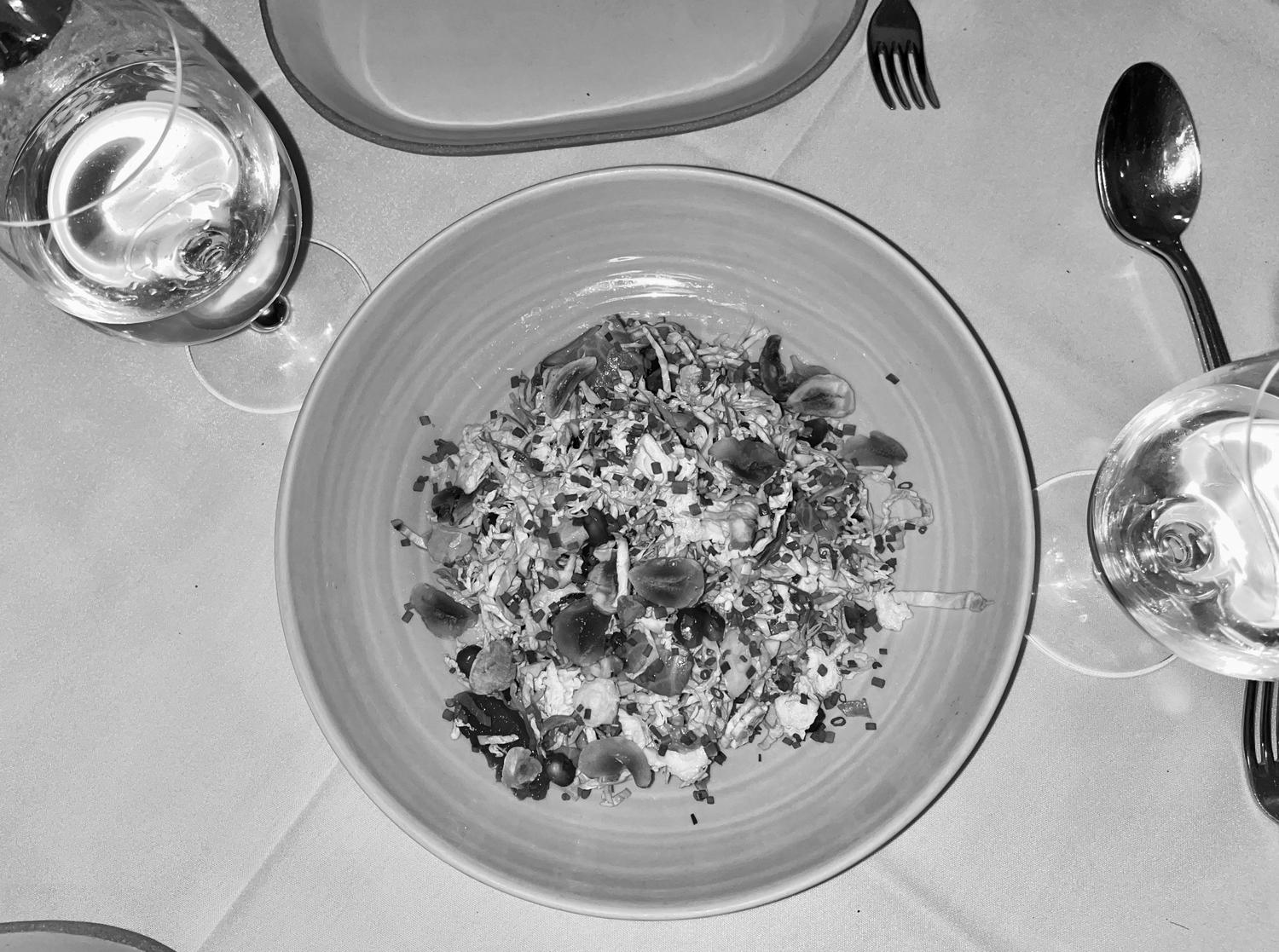
Talulla Review: Feel at Home on a Night Out
BY HANNAH E. GADWAY CRIMSON STAFF WRITER
Fthe James Beard Foundation, an organization that celebrates American food culture, for “Best Chef: Northeast.” Named after the couple’s daughter, Talulla offers both an à la carte and five-course tasting menu to its patrons. The atmosphere of Talulla is
more reminiscent of a friend’s home than a formal dining room. The eatery offers only twelve tables, which are cozily tucked between an exposed brick facade and a white wall lined with blackand-white family photos. Diners can easily observe the chefs working in the kitchen from their tables, evoking a warm kitchen that beckons from just outside the dining room. The staff is amiable and quick with suggestions, ready to share their thoughts on what the best bite may be. Talulla makes its patrons feel comfortable and at home so they can focus on the true experience — the food — without distractions.
One of the best ways to break bread with friends at Talulla is to do just that — break bread. The bread starter pairs a hearty sourdough with a spongy focaccia alongside a whipped honey butter. Crusty on the outside and pillowy on the inside, the sourdough is wholesome and perfectly simple. It sits well next to the focaccia, which has a more flavorful exterior dusted with salt and herbs. The breads are excel-
lent by themselves, but both are elevated with the honey butter, which melts luxuriously on the tongue.
A star of the menu is the shaved Brussels sprouts. While the slivers of sprouts themselves are delicate, the portion size is ample and satisfying. The salad also incorporates tender orange segments, sugary pomegranate seeds, and salty chestnut chips. While the dish could do with extra chestnuts to form a more consistent bite, overall it balanced its earthy and sweet flavors well. Although Brussels sprouts are a winter vegetable, the salad channeled the taste of spring due to its hints of sweet citrus and pomegranate.
Next up, the cod arrives bathed in a soy and dashi broth alongside pieces of carrots, leeks, and mushrooms. The fish had a perfect sear and flakes beautifully under the fork. But the dish’s accouterments, on the other hand, were disappointing — the carrots retained an earthy and undercooked element that did not seem to mesh well with the saltiness
of the soy sauce. Additionally, the small portion of cod seemed to truly swim in the large bowl of broth, making its price tag appear disproportionate. Perhaps
iar treats, such as double chocolate chunk cookies and a ginger molasses cake. The maple pudding is especially delightful — the chilled pudding is paired
“
Talulla is a comforting retreat within the streets of Cambridge. The restaurant feels like a familiar space — even to first-time visitors — leaving its menu to do the talking and surprise its patrons with its delicate refinement.
Talulla’s best seafood options can be found elsewhere on the menu — like the spaghetti in scallop sauce, for example.
Talulla’s dessert menu ultimately reflects the restaurant’s overarching focus on simplicity and enhancing uncomplicated flavors. The menu offers famil-
with pieces of shortbread that come to your table still slightly warm. The maple is nicely balanced with visible dots of highquality vanilla and fluffy whipped cream. These classic options on the dessert menu again reinforce the restaurant’s homeyness and comfort. While
the ingredients and presentation live in the realm of fine dining, the emotions associated with these treats are those of childhood. Talulla is a comforting retreat within the streets of Cambridge. The restaurant feels like a familiar space even to first-time visitors, leaving its menu to do the talking and surprise its patrons with its delicate refinement. The flavors are carefully selected, and it’s clear that meticulous thought is put into the the quality of ingredients rather than overcomplicating the menu. While every bite may not be entirely perfect, the overall dining experience at Talulla is welcoming. If you want to feel at home on your next night out, visit this cozy wonder at the bottom of Observatory Hill.
4 STARS
hannah.gadway@thecrimson.com
‘Winx Club’ Retrospective: 20 Years of Friendship and Magic
BY ERLISA DEMNERI CRIMSON STAFF WRITER
“Open your eyes / Open your mind / We are the Winx.”
On Jan. 28, 2004, a special series about a magical group of friends premiered on Rai 2 in Italy and later on Nickelodeon internationally. Created and directed by Italian animator Iginio Straffi, the series followed Bloom, a 16-year-old girl from Earth, as she traveled to the Alfea College for Fairies to improve her newly-discovered magical powers and befriended five other fairies. While at first glance “Winx Club” can seem like an average animated series targeted at pre-teen girls, the show has much more to offer. A varied cast of characters, complex worldbuilding, gorgeous design, and touching explorations of friendships and relationships have made — and continue to make — “Winx Club” a favorite for generations. The show’s core was its six main characters: Bloom (Letizia Ciampa), Stella (Perla Liberatori), Flora (Ilaria Latini), Musa (Gemma Donati), Tecna (Domitilla D’Amico), and Aisha
(Laura Lenghi). Each fairy had special powers and abilities, and even their aesthetics and outfit choices were individualized. One great aspect of watching the series with your friends was discussing afterward which character was your favorite, or which character’s personality was closest to yours. “Winx Club” had something for everyone, and it didn’t sacrifice character traits or development to achieve that. The fairies were multifaceted — Bloom was the newcomer with a lost identity and family to discover; Stella’s love for fashion and beauty didn’t mean she was a “dumb blonde”; Flora’s quietness and peacefulness were her biggest strengths; Musa was outspoken and dynamic, but not arrogant; Techna was logical and rational, but not boring; and Aisha was athletic and rebellious, but also feminine. Notably, the cast of characters was racially diverse, especially for a show produced in the early 2000s. Flora was Latina, Musa was Asian, and Aisha was Black. Even though their racial or ethnic identities weren’t central in the series, the story found innovative ways to incorporate
their backgrounds through the fashion, such as Musa wearing a modern interpretation of the cheongsam, an item of traditional Chinese clothing, as part of her everyday outfits.
One of the greatest achievements of “Winx Club” and a testament to the series’s enduring popularity is that the material, while targeted at a younger audience, wasn’t simplified or dumbed down. Each of the main female characters had romantic relationships with their respective boyfriends that they learned to navigate in mature ways. As the seasons went on, the show delved into more serious topics, such as coping with the death of a parent or a partner, learning to differentiate between inner and outward beauty, and selflessly sacrificing oneself to protect loved ones. Coupled with complex villains, including a recurring group of three cunning witches called the Trix, “Winx Club” set high stakes for its heroines.
Beyond tackling mature themes, the show’s outer appearance was full of color, with new, vibrant fairy transformations every season, stunning landscapes, and themed col -
or palettes devoted to each of its main characters. Considering how films and TV shows today often seem to suffer from washed-out or desaturated colors, “Winx Club” continues to be a breath of fresh air.
However, the show suffered from one considerable disadvantage: its inconsistency. Out of eight total seasons, the first three followed the original outline and, alongside the fourth, were created by Straffi’s Italian studio, Rainbow S.p.A. They contain the heart of the story and are also the most popular among fans.
After seeing the initial success of the show, Nickelodeon Animation Studio’s former owner, Viacom, bought 30 percent of the original Italian studio in 2009 and co-produced the fifth, sixth, and seventh season, only serving as consultants on the eight. As the show constantly switched production gears, every season after the fourth experienced major changes. For example, the series was specifically altered to appeal to a younger audience, with the fairies returning to college in season five even though they had already graduated after season
three. The show suffered budget cuts during its seventh season, and the eight was completely retooled for a preschool audience. While the many changes may be discouraging, “Winx Club” continues to have a strong following in online spaces. A special 20th anniversary limitededition comic was released at New York Comic Con last year.
There are current podcasts analyzing the series, retellings and fanfictions, YouTube deep dives or outfit recreations with millions of views, and even a free website containing every episode, season, special, movie, or spin-off in different languages and dubs, including the American 4Kids and Nickelodeon ones and the Canadian Cinélume version. The website even offers a watching guide for newcomers to the series. Furthermore, a 2019 study by major Italian newspaper Corriere della Sera reported that “Winx Club” was the fourth-most popular Italian series outside of the country. The series also launched numerous doll lines that continue to be in demand today. Special edition dolls, such as a limited edition Silver Bloom created
specifically for the 2012 San Diego Comic-Con, can sell for almost $1,000 on eBay. The show’s legacy is still developing. A live-action adaptation called “Fate: The Winx Saga” premiered for two seasons from 2021 to 2022. Currently, an upcoming animated reboot by Straffi, without Nickelodeon, is in the works. “Winx Club” and its characters still have significant impact and are proof of the magic of friendship and creativity. By delving into the series, you too can become “one of [their] bunch.”
ine dining can feel exhausting. On the quest to find exquisite bites, diners are often plagued by overwhelmingly intricate menus, indecipherable presentations, or a distracting focus on aesthetics over taste. The solution? Talulla — a small Cambridge restaurant that offers a homey atmosphere while never compromising on its stunning food. Talulla, nestled just off Concord Avenue, is tiny enough to miss if you don’t look closely. The establishment is run by husbandand-wife duo Conor Dennehy and Danielle Ayer. Dennehy was recently nominated by
erlisa.demneri@thecrimson.com
ARTS 14 MARCH 1, 2024 THE HARVARD CRIMSON
Stay Up to Date with our Newsletter, Subscribe at THECRIMSON.COM THC
METRO
Appetizer at the restaurant, Talulla, in Cambridge. COURTESY OF HANNAH E. GADWAY
AQ&A:
ARTHUR M. KLEINMAN ON CAREGIVING, FIELD RESEARCH IN CHINA, AND HIS LOVE STORY
A PROFESSOR OF ANTHROPOLOGY OF OVER 40 YEARS, Kleinman studies patient-caregiver relationships in Asia. “I had the personal experience of taking care of my late wife, Joan, for 10 and a half years while she suffered from early onset Alzheimer’s disease and died from it,” he says. “That experience was transformative for me. I thought I knew everything about illness and care. I realized that I had a hell of a lot to learn. What is it to take care of someone who you love with a terrible disease?”
BY DINA R. ZELDIN CRIMSON MAGAZINE
both a historical understanding of where the problems came from, a big social theory under standing of what social forces have intensified the problems and made the solutions more complicated, and also an under standing of what kinds of proj ects work and which ones don’t work, and what are the reasons for that.
FM: Why do you like to work with undergraduate students?
AMK: most exciting students to work with because they bring not only enormous energy, but consid erable idealism — a desire to rethink old problems in such a way to do something about them — and a commitment to get out and do things.
FM: Paul Farmer, the re nowned medical anthropol ogist who died very suddenly two years ago, was a student and later a close colleague of yours. You worked very closely on global health projects and co-taught several courses here at Harvard. How do you think his legacy will live on in the field?
AMK: the icon of global health. He demon strated, really for the first
to tell this story because I had the personal experience of taking care of my late wife, Joan, for 10 and a half years while she suffered from early onset Alzheimer’s disease and died from it. That experience was transformative for me. I thought I knew everything about illness and care. I realized that I had a hell of a lot to learn. What is it to take care of someone who you love with a terrible disease?
At the same time, I could use the memoir of my own care and put it together with my research on caregiving — well, you call it a manifesto, I don’t quite see it that way — as a critique of what’s happening in our society with caregiving today, which I think is in a terrible situation. Its implications for care are simply profound.
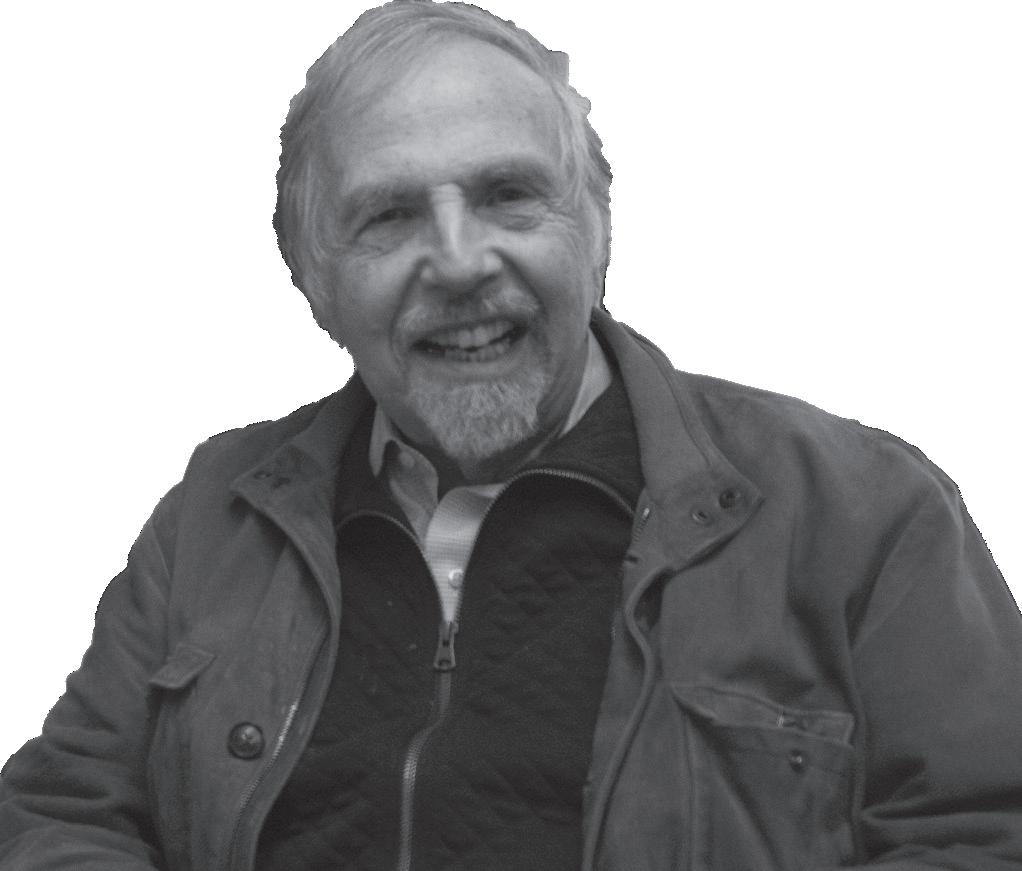
time, that you could deliver high technology interventions to poor people in ways that could be funded and supported and that had remarkable outcomes. Paul also critiqued the willingness that we often have on the public health side to accept scarcity as a rationale for doing nothing or very little. He challenged that. He said we were socialized for scarcity, and we could always, he thought, mobilize support, whether it was local or had to come from external sources. He was simply an amazing figure. His loss was totally unexpected, and really, very difficult for many of us. For me, he was an extremely close friend. Whereas I started mentoring him, he ended up mentoring me.
FM: You conducted research in China and Taiwan for multiple years. Why did you find China and Taiwan to be the best place to explore questions of culture and health?
AMK: So I’m an evolutionary biologisMy wife was a China scholar. Because of her interests and background, we went to Taiwan,
first in 1969, and to China, first in 1978. We had this cultural-linguistic connection.
When I went to Taiwan in 1969, no one had really studied the Taiwan healthcare system, and that gave me an opportunity to describe it from an anthropological perspective that was quite different from a public health perspective, and therefore to surprise people. I went on to look at mental health problems, and that’s what I did in China. Because of the medical focus, I was allowed to do things in China that probably you wouldn’t have been allowed to do if you had if you didn’t have that medical focus. For example, I did the first study by a foreigner of the survivors of China’s Cultural Revolution in 1980, just four years after the Cultural Revolution ended.
I’m continuing to do my research in China. I have a wonderful project called Social Technology for Global Aging. It emphasizes studies of elder care in the Chinese setting, bringing technology, design, public health, engineering, and medicine together. We’re looking at how if you put anthropologists together with engineers and medical people, and they have a focus on practically assisting people who are elderly, how they can come up with both
technological solutions and social solutions and put them together.
FM: Why is aging something that you’re interested in after so much work in mental health?
AMK: I’m going to be 83 years of age in March, so it’s highly appropriate for me to be interested in aging. I’m in the aging process myself, but also it’s an immense problem, in East Asia especially, but also here in the United States.
In East Asia, Japan is leading the way. In 2050, an unprecedented 40 percent of Japanese will be over 65 years of age. There’s never been a society in the world like that, so what kind of society will that be? How will they keep going? 30 percent of Chinese will be over 65 in 2050. Today, for every retiree in China, there are about four workers. In 2050, there’ll be one and a half workers for every retiree. It’s probably an unsustainable Social Security system. What will happen? There’ll have to be fundamental changes in the ages when people retire, etc. It’s very hard in the United States to read good things about China today, because Chinese and US relations have become so fraught. But point-of-fact, aging is an area where
the Chinese are doing some really interesting things.
FM: You mentioned that Chinese cuisine was something that is a really amazing part of getting to travel so much. What’s your favorite dish?
AMK: When I go to Shanghai, my former students, who are now all professors in Beijing or Shanghai, know that I am addicted to something that’s called xiao long bao, little dragon dumplings. I restrict myself to six a day when I’m in Shanghai, and everyone laughs when I use my chopsticks to grab a seventh. People stop me. That’s one of my favorites.
FM: Your most recent book, “The Soul of Care,” published in 2019, part-memoir, part-manifesto about your work, was a deeply-personal account of your experience as a caregiver. How did you open up to sharing this part of your life and relationship?
AMK: You can’t write this kind of book when you’re young. I’ve done many other things in the course of my career that have testified to my academic status. I felt that I needed
I came to the conclusion that we never measure care because if we measured care, we’d have to measure the quality of doctorand nurse-patient relationships, we’d have to measure fami sight into things and make us aware of our world, and improve our sensitivity to others. I think that’s really true. I came out of a background in a lifestyle where I was accustomed to never showing that I was vulnerable. That was an impossibility with caring for Joan. I began to realize that being vulnerable, and others being aware of my vulnerabilities actually made for a more authentic world.
dina.zeldin@thecrimson.com
FM
Fifteen Minutes is the magazine of The Harvard Crimson. To read the full interview and other longform pieces, visit THECRIMSON.COM/ MAGAZINE
FIFTEEN
15 MARCH 1, 2024 THE HARVARD CRIMSON
MINUTES
ASSOCIATE EDITOR
psychiatrist and professor of anthropology of over 40 years, Arthur M. Kleinman studies patient-caregiver relationships in Asia. This interview has been edited for length and clarity. FM: Your Gen Ed course “Who lives, Who dies, Who cares? Reimagining Global Health” has been a foundational course for many students at Harvard interested in public health and medicine. What’s a lesson from the course that you hope that all Harvard students take away from their undergraduate education? AMK: If you’re looking at a health problem or a social problem, history and the study of contemporary lived experience are crucial for figuring out how to first analyze such problems and then organize interventions. Everything from the treatment of tuberculosis and HIV/AIDS in very poor countries or poor parts of our own country, to the mental health field, and how to respond to depression in preg nancy, to depression amongst the elderly, to dementia, to stig ma, etc. All those things require
SELORNA A. ACKUAYI — CRIMSON PHOTOGRAPHER
A Thrilling Crimson Victory
ters under its belt, the Crimson
BY KATHARINE A. FORST CRIMSON STAFF WRITER
Pbackdoored his Crimson defender who got caught ball-watching Meyer as he drove to cage. Freshman LSM Joost de Koning won the groundball battle for Harvard on the second faceoff, but the Crimson was again unable to capitalize on its possession time. Ball movement for the first two possessions looked solid for the attacking line, and the unit had no trouble finding seams in the Bison defense, but the Harvard attack was unable to put the ball in the back of the cage. However, as the quarter wore on and Bucknell’s confidence grew, the attack became frantic and its typically-mature, settled sets devolved into forced feeds into traffic and slower ball movement, allowing the Bison to organize its rotations and quickly shut down one-on-one drives.
Grandolfo tallied the second goal for Bucknell, attacking his matchup against sophomore LSM Sean Jordan with a hard set of back-to-back roll dodges that allowed him to push off of Jordan’s pressure and release a righty side-arm slinger from the top of the fan. Harvard was a
second late to send the adjacent slide, and Grandolfo exploited the space between Jordan and sophomore SSDM Fin Jensen to find the back of the cage for a 2-0 lead.
Botkiss killed the scoring drought with a much-needed man-up goal, temporarily squashing the Bison’s momentum, which saw it race to a 4-0 lead nine minutes into the first. Under Assistant Coach and Offensive Coordinator Neil Hutchinson’s tutelage, the manup unit has proved to be an effective threat so far this season and was a bright spot in the Crimson’s first quarter offensive effort. The line moved the ball quickly around the fan, holding its space and showcasing its maturity by waiting for a clean take. Botkiss found his opportunity off a quick pass on the right wing, where he wound up and let the ball loose for a lefty cannon that painted the crossbar.
“We had a couple of plays and we talked about some of the things we wanted to focus on this week during practice, like spacing, moving the ball, not holding the ball for too long, and I think we all did that,” Malone added. “Our man-up group has been gelling well together, and I think that showed today.”
“
It really is about how you respond and you’ve gotta take it with the next play and remember that you’re here to win
The Harvard bench went wild after Botkiss scored, celebrating its first goal in more than 12 minutes of play. The Crimson was unable to keep its momentum going, however, with the squad being forced back on defense after a loss at the faceoff X. The team mitigated the Bison’s offensive threat, locking down the attack for the full 80 seconds on the shot clock. But, on what would be just one of several technical fouls against Harvard, the squad was caught with too many men on the field, sending possession back to Bucknell.
The Crimson struggled with controlling its controllables for the first three quarters, turning the ball over to the Bison 12 times. In what was an uncharacteristic hour of play, the team – which prides itself on fighting for every possession – was outworked by Bucknell. On the last possession of the first quarter, junior goalie Max Nolan, who posted an impressive 15 saves on the day, stuffed the Crimson attack before hitting one of his SSDM with a deep outlet, giving him time and space to fly past the re-defending Harvard attack. Bucknell pushed the fast break, and with less than a second left on the clock, freshman offensive middie Hans Huber was able to sneak one past senior goalie Christian Barnard
to send the Bison into the break up 5-1.
“After the first quarter I had to mentally reset. You know that happens as a goalie sometimes. Sometimes you don’t save every ball, and sometimes stuff goes in that shouldn’t,” Barnard said. “But, it really is about how you respond and you’ve gotta take it with the next play and remember that you’re here to win.”
Bucknell continued with its onslaught throughout the second quarter, drawing first blood before extending its lead by three more goals. The Bison faceoff unit was lethal throughout the period, going 5-0 at the center mark. With the increased possession time, Bucknell was able to settle into its rhythm, and work its sets. Less than a minute into play, Meyer, who got a step on his defender while dodging cross-fan and looking for a feed in the middle, got his arms free and found the back of the net with a side-arm rip top shelf.
Barnard stopped the Bison’s next offensive attack with a big save, but the Crimson was unable to clear. Sophomore SSDM Owen Guest had no choice but to run through traffic, and was swarmed by the Bucknell ride before he could make it over the midline. The Harvard defense failed to give Guest an outlet pass, and the simple mistake cost the Crimson its well-earned possession. In what would be a first-half theme, the team struggled with taking care of the ball, focusing more on making big stops rather than on valuing possession time.
The Bison scored two more successive goals, extending its lead to 8-1, the largest differential of the afternoon. In a much needed break, Bucknell drew a one-minute penalty for a late cross-check against Blake, who had already lost possession of the ball. The Bison wouldn’t know it yet, but its late-hit against Blake would be the catalyst for Harvard’s comeback. A palpable energy shift could be felt in the stands as the man-up line jogged onto the field, its desire to answer Bucknell’s chippiness towards its teammate evident before the referee even blew the whistle.
The attack spread the Bucknell defense thin, stretching itself outside the fan in an effort to catch the Bison man down unit on a late rotation. The attack slung the ball down low to Malone at the X, and the quick pass behind the cage caught Bucknell ball-watching. Junior attacker Sam King – who ranks first in the Ivy league for points and 16th nationally so far this season to pair with first in the Ivy League and eighth nationally for assists – held his space at the top of the fan as he noticed the Bison defense sag in towards Malone. This created ample room for Malone to lob a pass to King, who sent the ball flying past Nolan with 3:23 seconds left in the half.
After some back-and-forth play between the two teams,
Harvard came up with a big stop
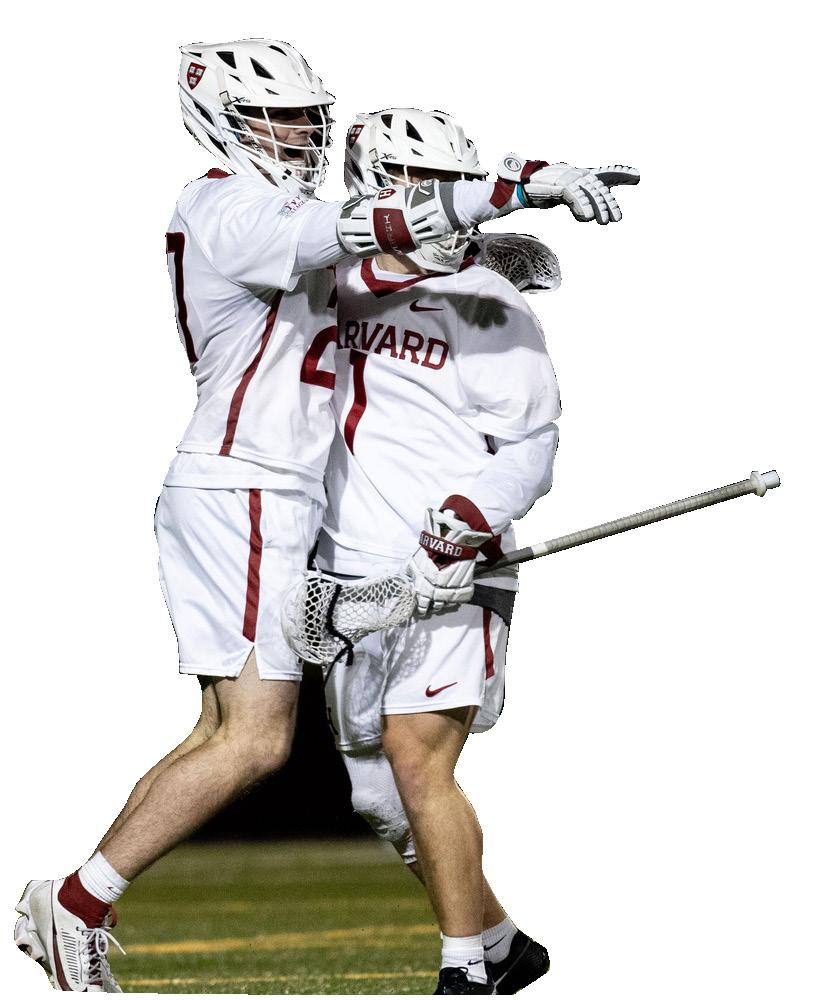
cage, tracking down the ball as he quickly wrapped around the right side for a flick past the netminder. King was met with a late-hit from Bucknell that sent him flying, and the penalty carried over into the second half, giving the Crimson an advantage as it stormed the field after the break.
“He lit a spark in us, got us going again, and motivated us to see that the game wasn’t over and that no winning play was made yet,” Malone said about Head Coach Gerry Byrne’s halftime speech. “And I think that in that second half we made tons of winning plays that contributed to our victory.”
The attack clawed back two more goals at the top of the third, the first coming from an unassisted take by Blake. Sophomore offensive middie Finn Pokorny found success with a hard dodge down the left alley, sending a lefty bouncer past Nolan to make it a three-goal game. Despite the effort, Bucknell responded in kind, capitalizing on strong takes from Huber and Grandolfo to send the Bison up by five. Malone again came in clutch, shifting the energy with a slippery inside roll dodge that allowed him to get the inside lane on his defender around the right side of the crease before burying the ball past Nolan on the doorstep. With three subpar quar -
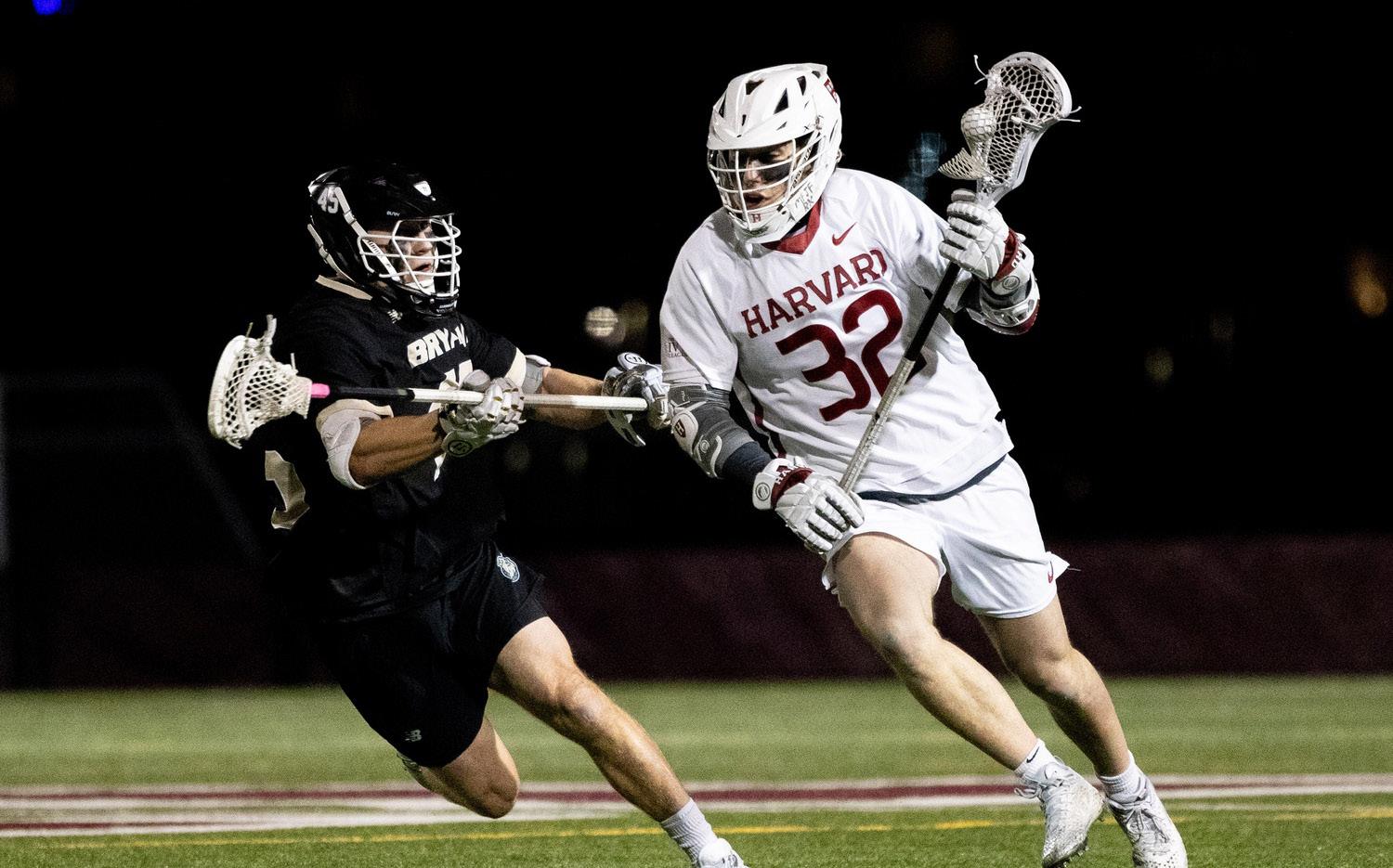
comeback on the home-stretch of the afternoon. Harvard dominated the fourth quarter, notching more goals during that period than it had the other three combined. The Crimson, which has averaged 16.67 goals per game this season, was slow to generate offensively, only recording 14 shots on goal throughout those first three quarters. In his post-game interview after the victory against Bryant, junior defender Martin Nelson talked about the team’s need to adapt more quickly to its opponent’s style of play, an area that the team struggled with yesterday. In a similar fashion to Tuesday’s performance, it was not until the back-half of the third that the Harvard team took charge. Despite its stellar record this spring, the Harvard team has had to work out several kinks during its first three matchups, narrowly avoiding disaster against two opponents that should have been manageable foes. The attack came out with all cylinders firing in the final quarter on Saturday, and it was Malone who started the scoring effort, striking paydirt less than a minute into the quarter. Starting with the ball behind after backing up a narrow miss by King, Malone sent his defender falling to the turf with a shifty roll dodge. With his defender sprawling, Malone ripped a lefty shot past Nolan from the elbow with time and space. The Harvard bench and fans went wild for Malone’s theatrics, and the raucous cheers droned out the announcer as he broadcasted the tally. Bucknell retaliated with a quick goal from sophomore middie Will Hopkins, but the Bison was unable to capitalize on the momentum, with Harvard sending four more past Nolan in less than three minutes, tying the game 11-11 with 9:33 on the clock. Botkiss scored the equalizing goal on a shifty face-dodge that allowed him to get underneath his defender for a strategically-placed shot off-stick hip high. The fourth quarter showcased 15 minutes of cohesive, unified, play for the Crimson.
“We just weren’t playing our brand of lacrosse and I think that in the second half we were able to get back to that. We were able to start getting some stops on defense, Deg was killing it at the faceoff X, and it resulted in more possessions,” Barnard said. “Our offense was able to move the ball around pretty well and overall just put the ball
in the back of the net.” Hopkins notched the next goal as well for Bucknell, this time on a man up effort. Nelson was sidelined for 30 seconds for pushing, and the Bison capitalized on its power play. The Crimson defense got muddled in front of the crease, and Hopkins exploited the chaos, cutting off the top of the stack for a feed from senior attackman Dutch Furlong that he finished behind-the-back along Harvard did not allow the mistake to derail its comeback, and after losing the initial faceoff clamp to Bucknell, de Kon -
ing stripped the Bison FOGO, sending the ball flying out of his cross and out-of-bounds. Junior defenseman Collin Bergstrom brought the ball in-bounds before hitting junior SSDM Ray Dearth, who cleared across the midline, making a hard splitdodge against a Bucknell defender who met him at the 30. Dearth used his speed to his advantage, creating space as he barreled towards the goal. The Bison were slow to slide to the SSDM, and Dearth capitalized on their hesitation with a hard righty high-to-high finish from the top of the fan that flew past Nolan a mere 15 seconds after Hopkin’s goal.
Jogging back to the 50 with confidence, DeGennaro secured the clamp and the faceoff unit got the ball down to Malone, who pushed towards the cage. Malone sent his defender to the turf for the second time that afternoon, tripping up his opponent with a slight hesitation as he changed his momentum. The Bison defender fell over his own feet as Malone made a hard stop to look for incoming Harvard cutters from the box. As his defender went down, Malone switched to his left hand to increase his angle before sending a sniper past Nolan’s feet in a high-low finish that put the Crimson in the lead 13-12. Neither team was able to find the back of the net over the next seven minutes of play. Bucknell pushed one last-ditch effort, taking a timeout on its offensive end to draw up one final play with 55 seconds on the clock. Barnard secured the Crimson victory with a massive save 30 seconds into the effort, clearing a long ball to the attacking end where Harvard played keep away till the final buzzer.
“It’s just taking it with the same attitude at all times. You can’t get frazzled when the game is close and you have to be calm, cool, and collected, and be able to make a play,” Barnard said.
“And, fortunately, in the last couple of games we have been able to make one more play than the other team has, and end up with the victory.”
In what will hopefully be a stronger start, Harvard will welcome Merrimack to Jordan Field Tuesday at 7:00 pm. The game should prove to be an interesting battle as the Warriors (2-2) bested Bucknell 14-10 earlier this season. The action will also be streamed live on ESPN+.
MEN’S LACROSSE
SPORTS 16
icking up momentum after what was another rocky start, the Harvard men’s lacrosse team (3-0, 0-0 Ivy) fought back from an 8-1 deficit to silence the Bucknell Bison (1-3), 13-12, in what came down to a thrilling fourth quarter of lacrosse. Harvard won the initial faceoff on a technical but was unable to convert on its first possession. The attack looked strong, moving the ball quickly around the perimeter, analyzing the middle for open lanes. Junior middie Miles Botkiss, who notched two clutch goals on the day, saw his opportunity, feeding senior attacker Graham Blake who was cutting along the crease. Blake – who is ranked first in the Ivy League and 24th nationally for most goals this season with just three games under his belt – fell prey to a timely back-check from the Bison defender, and the ball was knocked loose out of his stick for an easy ground ball and clear from Bucknell. The Bison exuded confidence on the offensive end, moving the ball with pace around the fan. Sophomore attackman Michael Meyer, who quarterbacked the offense with five points on the day in the form of two goals and three assists, dodged hard down the right alley, making his move on his short stick matchup. Meyer kept his head up on his dodge and made the open feed to Grandolfo, who slyly
Two Harvard players celebrating a goal during the game against Bryant on February 20.
DYLAN J. GOODMAN — CRIMSON PHOTOGRAPHER
NAIL-BITER.
After a tough showing in first half, the Crimson showed their resilience and came back from an 8-1 deficit to defeat a strong Bucknell team, 13-12.
katharine.forst@thecrimson.com MARCH 1, 2024 THE HARVARD CRIMSON A Harvard player fending off a challenge from his Bryant opponent during a game on February 20. DYLAN J. GOODMAN — CRIMSON
PHOTOGRAPHER
Christian Barnard ’24 Goalie


Watch Binge Try Prime Student for 6 months at $0 New members only. Terms apply. Grubhub+ and Saltburn included with Prime.



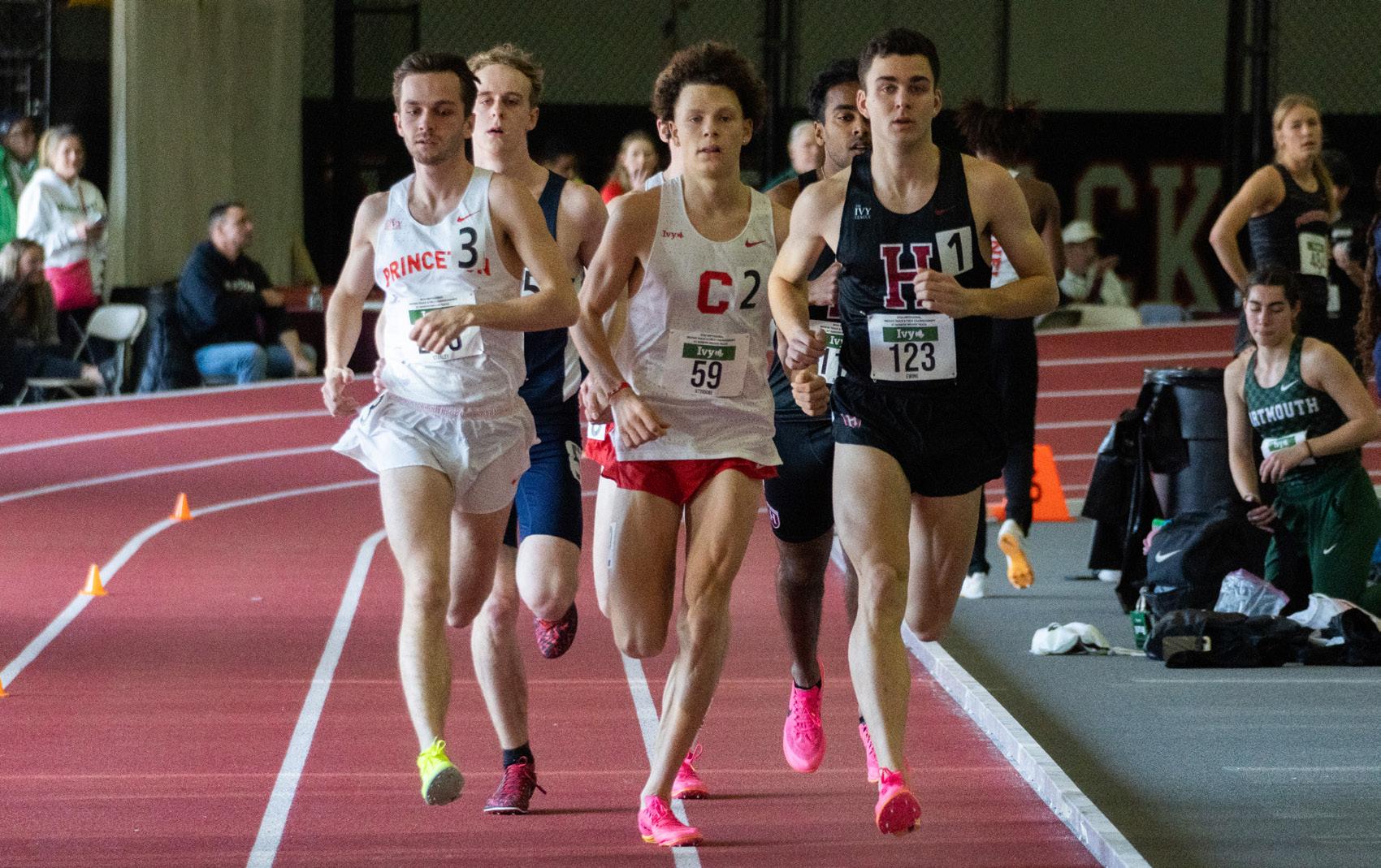 BY SARAH G. ERICKSON — CRIMSON PHOTOGRAPHER
BY SARAH G. ERICKSON — CRIMSON PHOTOGRAPHER
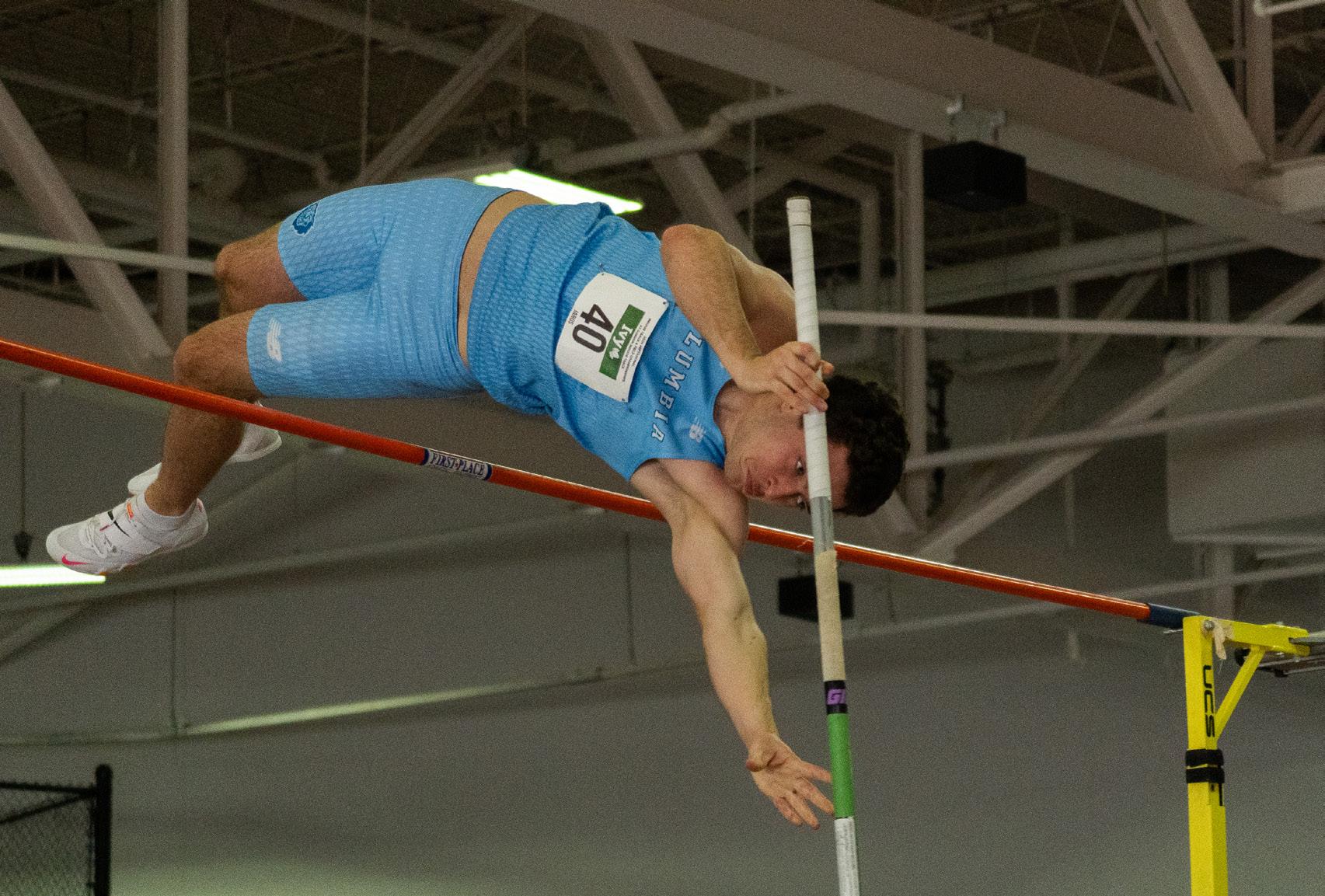
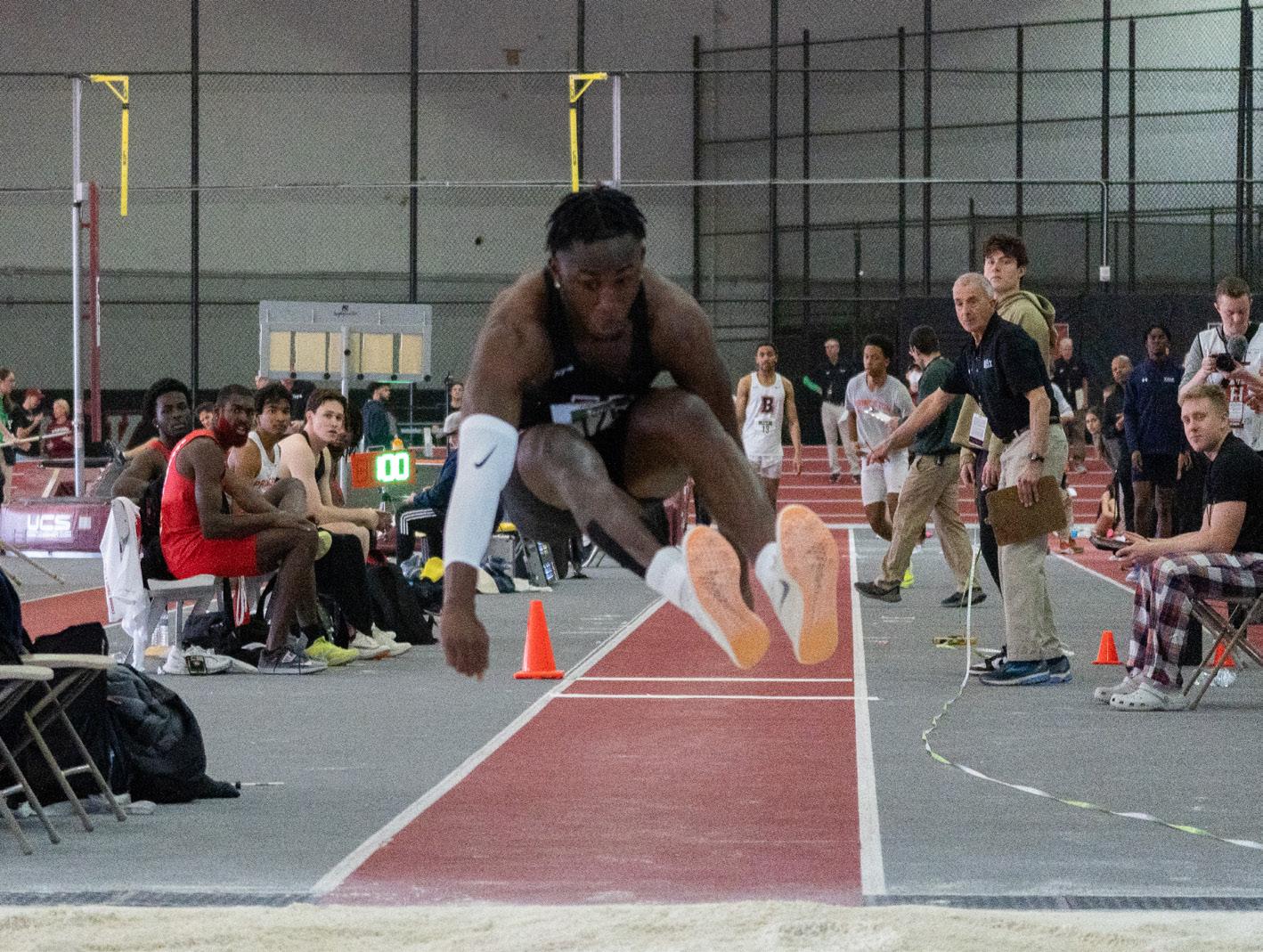

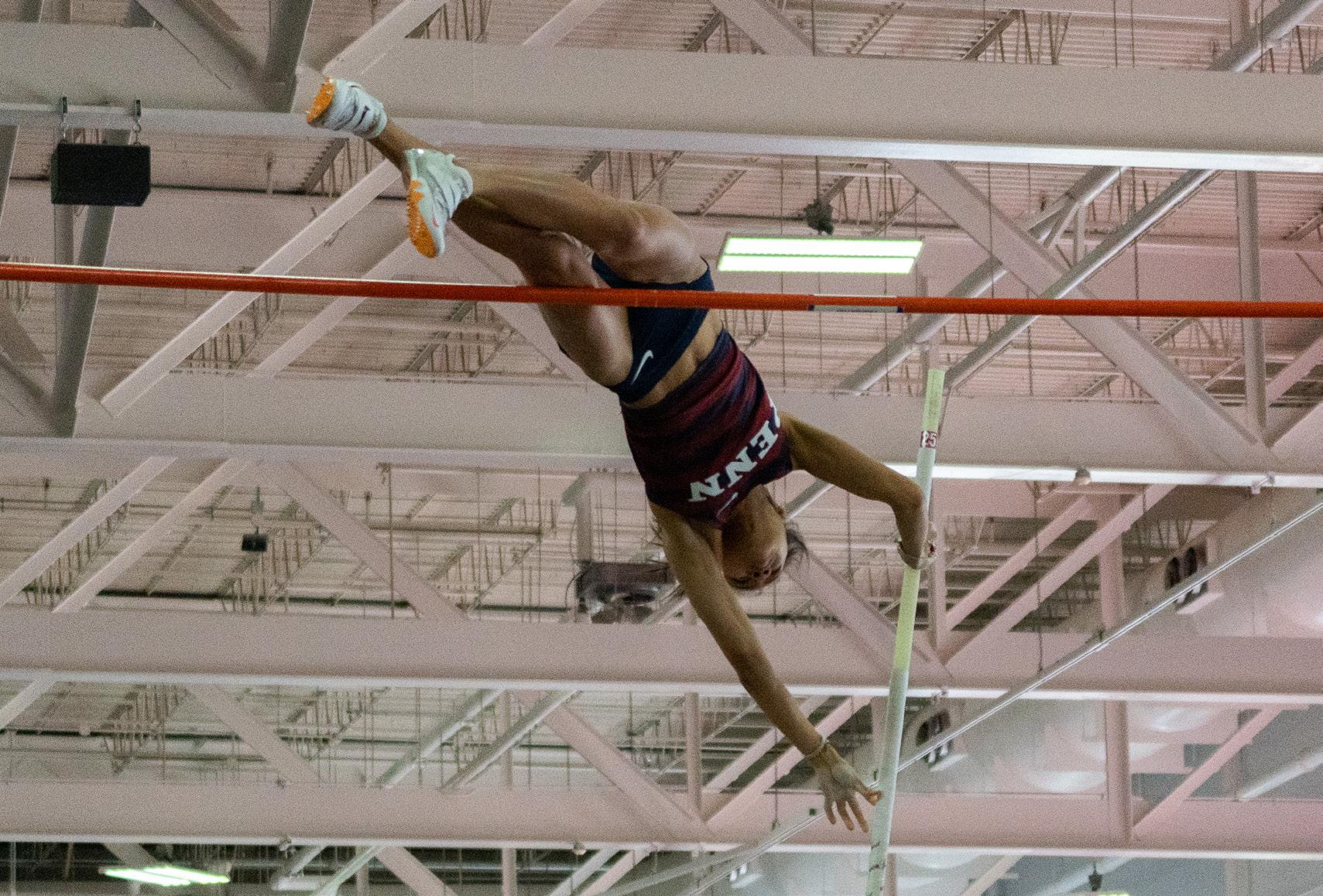
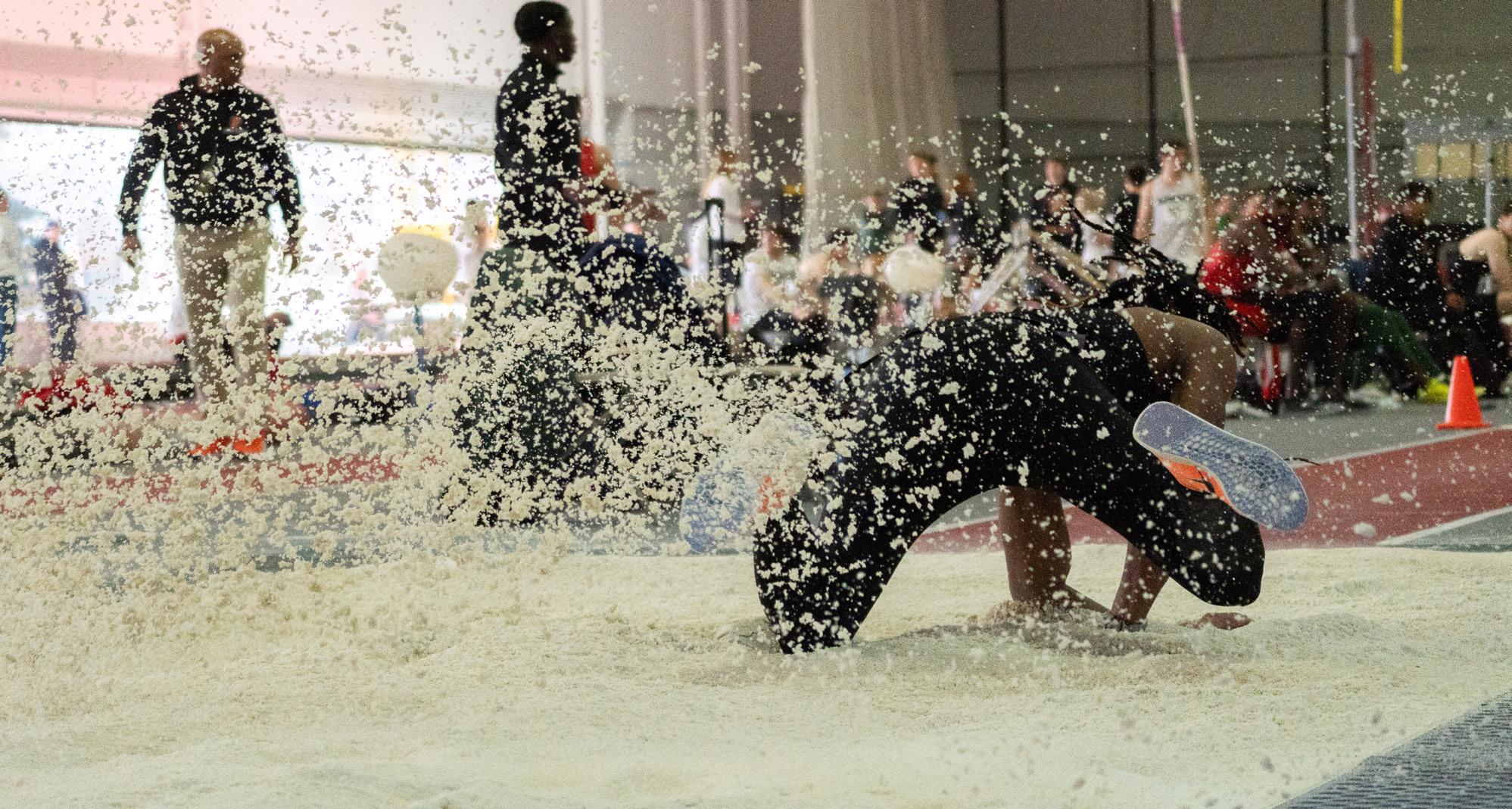

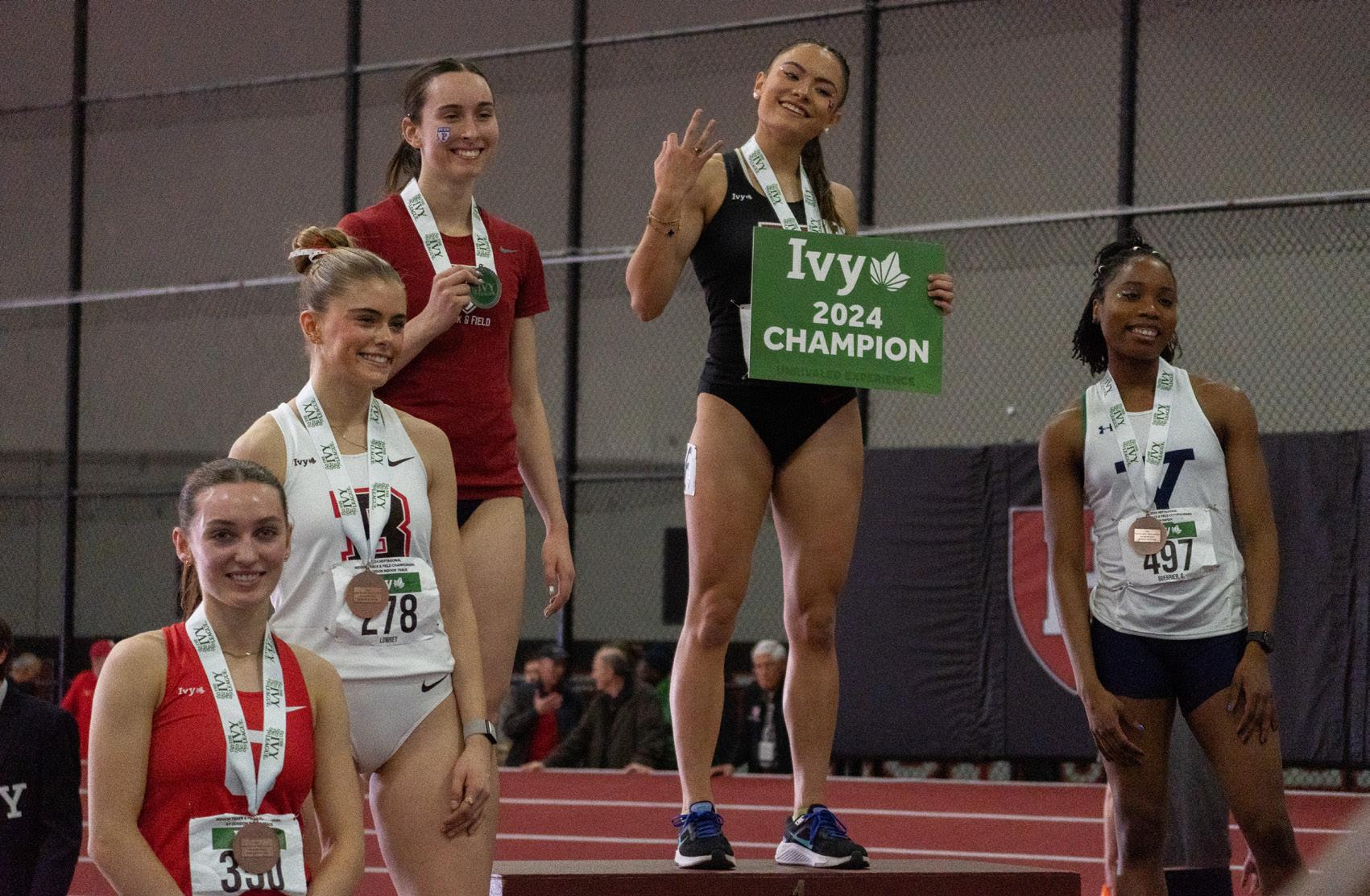
IN PHOTOS 18 MARCH 1, 2024 Daniel O. Falode ‘25 lept his way into 1st place with a performance in the Men’s Triple jump final that set a new school record of 15.96m. The victory marks Falode’s third-straight Ivy League title for the event. Competitors from Columbia University and the University of Pennsylvania propelled themselves over raised bars in the pole vault event. Anastasia Retsa ‘25 took home second place in the women’s event for the Harvard team, clearing 4.3 m in her best vault. In Photos: The Heptagonal Championships The Ivy League Heptagonal Indoor Track & Field Championships had its inaugural year in 1934, receiving its name from the seven original participating schools. With the addition of Brown University in 1949, all 8 Ivy League schools now gather each year to compete in the games. HIGHLIGHTS FROM HEPTAGONALS. The annual Heptagonal Ivy League Championship returned to Harvard’s Gordon Indoor Track last Sunday for the first time since 2019. There, the Harvard Track & Field team posted strong results: in addition to multiple individual wins, the women’s team placed 3rd overall and the men’s team placed 4th overall.
Hundreds of spectators, teammates, friends and family convened at Gordon Indoor Track for the event. Runners raced in a variety of distances, from 100m sprints to 5000m long-distance events. Victoria A. Bossong ‘25 placed 1st in the Women’s 500m final, breaking the Ivy League record with the second fastest time in NCAA history. Peter G. Fischer ’25 ran in the Men’s 400m final, coming in 5th place for the men’s team. In the same event, Gregory O. Lapit ‘24 claimed the win for the second year in a row.



















































 BY SARAH G. ERICKSON — CRIMSON PHOTOGRAPHER
BY SARAH G. ERICKSON — CRIMSON PHOTOGRAPHER






